

Mount Toubkal Trek: The Complete Guide to Imlil and Best Ways to Hiking Mount Toubkal in Morocco in 2024
This is a guide to the beautiful town Imlil in the Atlas mountains of Morocco. This guide contains detailed information on all the day hikes near Imlil and about hiking Mount Toubkal with a guide.
I looked in front of me and all I could see was an endless chain of craggy snow-covered mountain peaks. The air felt thin. Breathing was becoming difficult, almost painful.
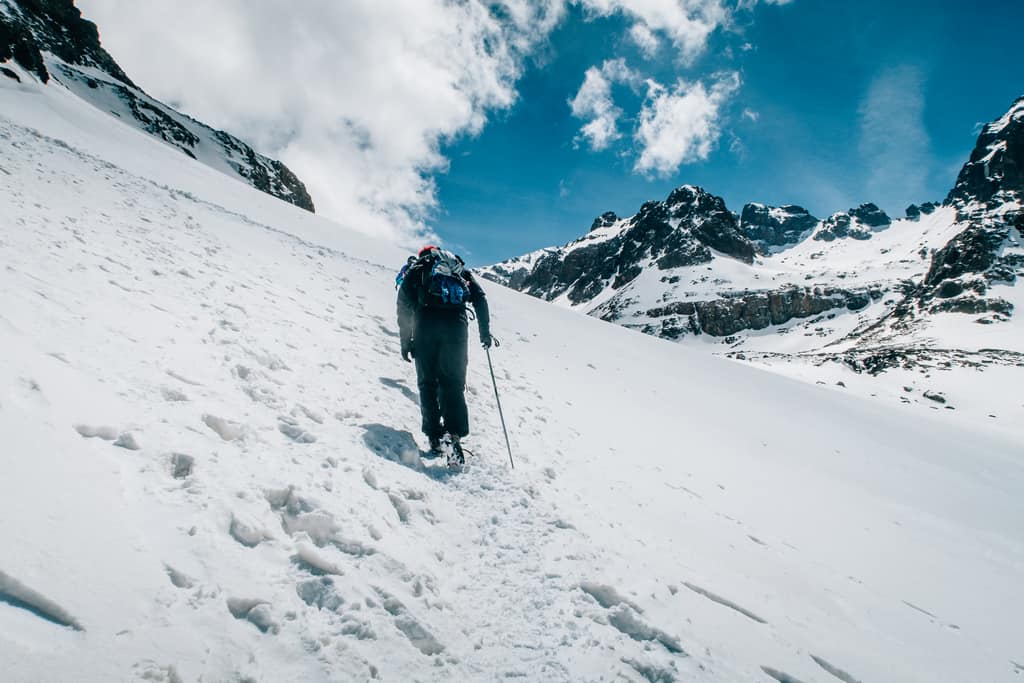
The last time I had done some serious hiking was in Kyrgyzstan when I hiked up to the glacier lake Ala-Kul . I thought I was ready for bigger hikes in Morocco after walking around the Todra gorges and hiking up to the Akchour waterfalls .
I thought I was ready to hike Mount Toubkal, the highest peak in North Africa, standing tall at a whopping 4100 meters above sea level. I wasn’t. My whole body was aching.
My legs were shaking. I felt desperately unprepared and unequipped. The crampons that were supposed to give me a steady grip on the ice-covered slope of the mountain had just broken and I was slipping backward.

As much as I didn’t feel ready when I hiked up the trail to reach this majestic Moroccan mountain, I felt exhilarated. In every direction I looked, I could see some of the most pristine landscapes I had ever witnessed.

A lot of online blogs say that mount Toubkal is one of the easiest summits in the 4000 meters range.
Don’t be fooled. Mount Toubkal is a non-technical hike, meaning that you don’t need a rope and some dangerous maneuvers to reach the top. But it isn’t an easy hike, especially not in winter.
The path that takes you from the refuge all the way to the peak is long and steep. In winter, you’re also exposed to a constant cold wind that blows on that face of the mountain.

It’s important to dress warmly and wear good warm gloves (see what to wear in Morocco ).
I wasn’t properly dressed for this challenge but when I reached the top I couldn’t feel the cold anymore. I felt super proud and happy with what I had accomplished in only one day.

I decided at that moment to write a guide to help you achieve the same. Whether you want to reach the summit of Toubkal in a day or two or even hike to other mountains in the region, you’ve come to the right place.
In this complete guide, I will tell you all about hiking to Toubkal, what you need to bring and how you can hire a guide to get there. I will also cover the beautiful village of Imlil (from where the hike starts) in detail.
From where to stay and where to eat, this guide will help you have an unforgettable adventure in Imlil and in the mountains of the High Atlas .

Disclaimer: This posts might contain affiliate links, meaning that if you make a purchase through these links, I may earn an affiliate commission. Thank you for helping to support this website!
Morocco Travel essentials and resources
- Morocco Travel Guide: 19 things you should know before you go
- Where to go: The 17 most beautiful places to visit in Morocco
- Plan your trip: 3 itineraries to discover the best of Morocco
- Is Morocco safe: 18 useful tips to stay safe while traveling in Morocco
- Tours and experiences: Book a customized tour
- Where to stay : Find a room in a hotel, hostel, guesthouse or desert camp
- Travel Insurance: Find the best travel insurance for Morocco
- Getting around : Rent a car in Morocco or travel by bus or train
TABLE OF CONTENTS
1. How to get from Marrakesh to Imlil
Imlil is very easy to reach from the bustling busy city of Marrakesh . It’s so close to the famous city that it’s often considered as one of the best day trips from Marrakesh .
Because this village is located almost right in the center of the country, it also means that it can also be reached without too much effort from Essaouira and Merzouga .
A visit to Imlil and Mount Toubkal could fit perfectly in a 3-week trip through Morocco .
How to get from Marrakesh to Imlil by shared taxi
The easiest way to get from Marrakesh to Imlil is to take a shared taxi or a grand taxi as they are called in Morocco. The small mountain village is just 60 km from Marrakesh so getting there doesn’t take much time (75-90 minutes)
There is a grand taxi station across the street from the Jemaa el-Fnaa bus stop.
Once you get to this taxi station, it’s possible to hire the whole taxi for yourself for 250 MAD to 300 MAD or you can share it with other passengers. If you wait for the taxi to fill up, the price will be much lower (around 50 MAD to get to Imlil).
If there is no shared taxi going to Imlil when you reach the station or if the taxi takes too long to fill up, you can also reach Imlil by a combination of a bus to Asni and then catching a taxi from there to Imlil.
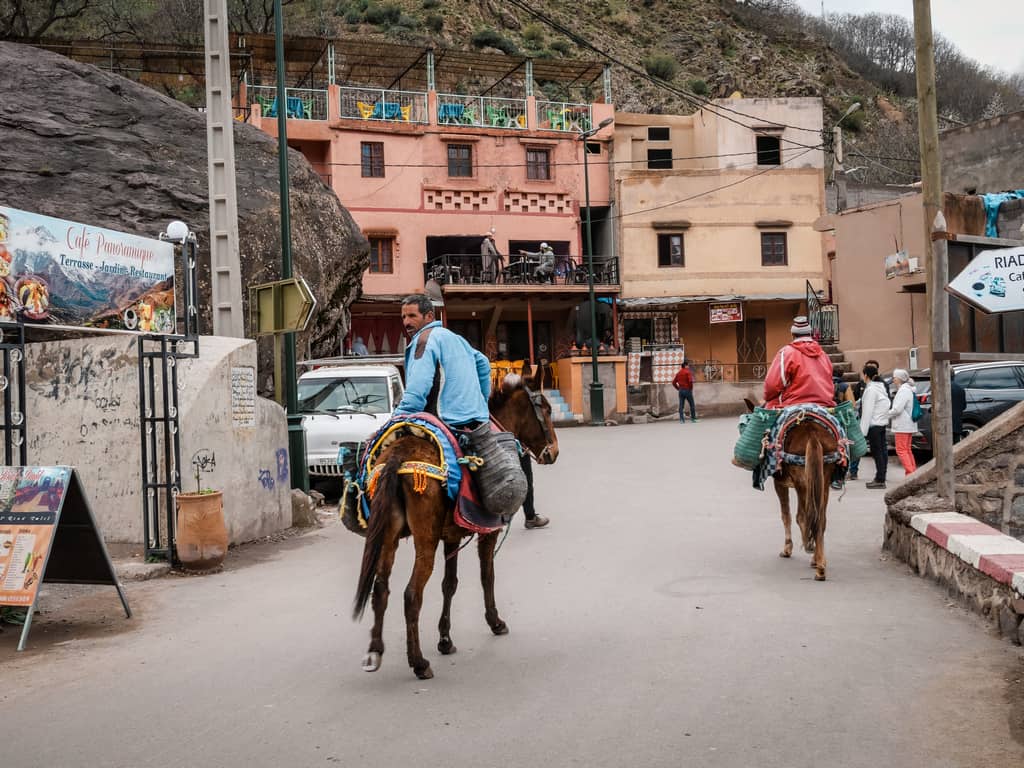
How to get from Marrakesh to Imlil by bus and taxi
It takes around one hour and a half to reach the small town of Asni from Marrakesh by bus. From there one can easily catch a shared taxi to Imlil for 10 MAD or hitchhike the remaining 17 kilometers to Imlil.
You can get a bus from the central bus station in Marrakesh.
How to get from Marrakesh to Imlil with your own car
If you have your own car or if you are renting one , you can also drive directly to the small village of Imlil. Expect the drive to be very pleasant.
The road is almost completely paved all the way to the mountain village and will take you through some gorgeous landscapes. The road there is relatively safe but during winter it tends to be covered by rocks that fall from the cliffs nearby so drive carefully.

Everything you need to know about renting a car and driving in Morocco
As you travel there, the countryside around you will completely change. You will see the environment change from arid dust to green, leafy foliage.

The trees blossoming near Imlil…
The temperature will also become cooler. As you approach the village, the hills become gradually filled with more and more fruit trees. After a year and a half of traveling around Morocco, I have to say that this is probably my favorite part of the country.
When Cynthia and I visited Imlil for the first time, we were amazed by the amount of apple and cherry trees blossoming in the hills and mountains surrounding the village.

2. Where to stay in Imlil
Imlil has a lot of small but beautiful guesthouses where hikers and nature enthusiasts stay all year round before starting the long trek to the summit of Toubkal. The prices and comfort they offer vary quite immensely.
After going around town and having a look at different properties, here are the top places where we would recommend you to stay in Imlil:
Top picks for low-budget:
- Dar Amadine
- Targa Imoula
Top picks for mid-range budget:
- Berber Family Lodge
- Atlas Imoula
Top picks for riads:
- Riad Dar Omar
- Riad Atlas 4 Seasons

Morocco T r a v e l G u i d e : 19 useful things to know before traveling to Morocco
3. Where to eat in Imlil
Imlil has all kinds of restaurants, sandwich stands, and little shops that sell shawarma and pizza. My girlfriend and I became really fond of a few places in town and we kept going back to the same few restaurants day after day to eat.
Here are the restaurants that we think are worth checking out in Imlil:
Riad Imlil has also one of the best restaurants in town. If you want comfort and great food in one place, you should definitely come here.
It’s located right on the edge of a little river and it’s quite soothing to hear the sound of the water as you eat on the terraces or in the garden.
Because we were there during the blossom season, all the fruit trees of the garden were in flowers and it created a beautifully romantic atmosphere.
Guesthouse Ain Mizane
This guesthouse/café had a very nice outdoor little garden where we would go to enjoy delicious tagines and big portions of couscous.
The staff there is super friendly and I really enjoyed speaking Moroccan Arabic with them on a daily basis.
This cozy little café is on the main road between the entrance of Imlil and the first bridge.

4. Best hikes in and around Imlil
There are plenty of beautiful hikes around Imlil. The most popular one, of course, is the Mount Toubkal Trek.
There are a few hikes that leave from the mountain refuge near the summit of Mount Toubkal and bring you to other neighboring mountains. These are as beautiful and as epic as Mount Toubkal itself and I will cover a few of them in this article.
There are also a few shorter day hikes that start in Imlil. Here are three hikes we recommend:
1) Hiking from Imlil to the radio tower
This is a very quick and easy day hike from Imlil. The radio tower can be seen from almost everywhere in town and It doesn’t take a lot of time to reach the top of the small mountain where it is.
From there you can see all of Imlil, the villages of Myzyk and Armound, and the surrounding valleys.
This small but relatively challenging hike is also a great way to acclimatize yourself to the mountains and prepare for the trek to Mount Toubkal.

2) Hiking to the waterfall near Armound
This is another very easy hike from Imlil. If you plan on spending only a few days in this part of the Atlas mountains, this is the hike I would recommend.
It’s only a kilometer and starts in the village of Imlil. From the center of town walk towards Riad Imlil and before you reach it, you will encounter a street that goes uphill to your right.
If you follow that street up you will reach a small trail that follows the river and leads directly to the waterfall and the village of Armound. If you get lost, don’t worry, the locals are super friendly and will gladly point you in the right direction.
The small waterfall is quite lovely and filled with water during winter. At the base of the waterfall and around the river you’ll find small shops where Moroccans sell fresh orange juice and snacks.
If you continue walking from the waterfall in the direction of Mount Toubkal, you will eventually reach the small village of Armound.

This village is on top of a small hill and overlooks Imlil. It’s quite a picturesque place and it feels like traveling back in time.
The small streets are filled with traditional Berber shops and it’s the perfect place to enjoy a mint tea while admiring Mount Toubkal in the distance.

3) Hiking along the river from Imlil to Asni
This is not really a popular hike in Imlil as it takes you in the opposite direction of Mount Toubkal. The views along the river, however, are totally fantastic, especially during summer when all the trees are lush and green.
The distance between Imlil and Asni is only 17 kilometers so you can easily do this hike in a day. Because the paved road that connects the two villages follow the river, it’s easy to get back on it at any point during the hike.
This hike can only be done during summer because during winter and spring the rains raise the water level in the river quite drastically and it can be dangerous.

5. A few things to consider before you hike from Imlil to Mount Toubkal
Do the people in imlil and toubkal speak english.
Hiking in the Moroccan mountains and especially near Imlil is becoming easier and easier since more guides now speak English. However, do remember that a big part of the population still speaks only Arabic and Berber.
Learning a few words or expressions in those languages before visiting the high Atlas mountains will definitely be helpful.
If you would be interested in learning Moroccan Arabic you could read Tips and tricks to learn Moroccan Arabic.
If learning languages is not your thing, I would recommend getting your hands on the Lonely Planet Moroccan Arabic phrasebook and dictionary . It’s packed with thousands of sentences that will help you in different situations and scenarios.
It will be useful to ask your guide where you will be sleeping in the mountains and how much the food or the trek will cost.

Is it safe to hike to mount toubkal?
The Mount Toubkal trek is becoming safer and safer since the installation of three police checkpoints along the way. They know who went up the mountain and who hasn’t come down yet.
If you would fall from a rock or a ledge, they would be alerted relatively quickly and could provide help and assistance as soon as possible.

But do remember that mountain hiking anywhere in the world comes with a certain dose of risk. Regardless of your skills as a mountaineer, hiking in completely new and different terrain is not the safest thing.
Some of the passes between the mountain refuges and the peak of Mount Toubkal are very high and can be quite treacherous at certain times of the year.

Therefore it is paramount that you have good travel insurance before going on a trek to Toubkal.
The insurance we recommend is IATI Backpacker Insurance . It covers almost anything that could virtually happen to you in high mountain altitudes and covers you on treks of up to 5,400 meters.
The IATI Backpacker Insurance is also one of the few policies that won’t require you to be in your home country to purchase, renew or extend your insurance. If your trip happens to go on a little longer than planned, you can easily extend your plan online. Read more about this policy here .

What is the best cheap travel insurance? The 3 best companies compared
What kind of weather should you expect in the mountains around Imlil?
The best time to visit Toubkal is between the months of May and September. The weather is much more comfortable during that period of time and there is barely any snow on the summit.
During winter and early spring, however, the weather can be very cold at night depending on how high you are. The average temperature during the day can be around 3°C (37°f) and -7°C (19°f).
At night the temperature easily goes down to 0°C and sometimes even reaches -11°C (32°f and12°f).

During winter it rains a lot in Imlil and Toubkal is covered in snow. I’d recommend you bring a good warm sleeping bag and some warm clothes regardless of the time of the year you hike around Imlil.

6. What should you bring on the Mount Toubkal Trek?
You will need to bring very different equipment depending on the time of the year you hike to Mount Toubkal.
If you go there in summer, you will be fine with walking poles and your summer clothes.
If you go there in winter, however, you will need to rent some crampons in the town of Imlil as well as hiking p o l e s before heading up the mountain.
You will also need to bring warm winter clothes , a warm winter beanie , and some gloves .

Here are other very important things you should bring with you to Toubkal:
- Your passport:
It’s now mandatory to have your passport with you on the hike to Mount Toubkal. You will have to show it at three different police checkpoints along the way.
- Snacks for the way up:
I would suggest buying peanuts and dry raisins for the hike. These snacks will give you a lot of energy and they can be bought in any of the small shops in town before you start your trek.
- Money for sleeping in the refuges:
There are two small mountain refuges located near the top of Mount Toubkal. People usually hike up to them during the first day of the trek, sleep there for the night and then reach the summit the next morning.
I reached the summit in one day but I still had to sleep in the refuge at the end of the day. I went back to Imlil the following day after spending an awesome night in the mountains.
The two mountain refuges have different prices. I stayed in one called ”Les Mouflons” and it cost me 280 MAD to sleep there with dinner and breakfast included.

- Topographic hiking map:
Most of the shops in Imlil where you can rent crampons and walking sticks also sell topographic maps of Toubkal and the surrounding mountains.
Although you do need a guide to hike up to Toubkal, I would strongly suggest getting a map of the mountain for extra safety. If at any point you would get separated from your guide or lost, having a map like this could save your life.
These maps are very detailed, super useful and a must to take with you so you know where you’re going and what you can expect during the trek.
- Hiking GPS :
If you’re not good at reading topographic maps (I still have a hard time with that myself), a hiking GPS could be very useful and provide extra safety on your hike to Toubkal.
The one we recommend is the Garmin Instinct Outdoor watch with GPS . Check out this awesome GPS here .
- First-aid kit:
Here’s what you should include in a first-aid kit when you do the Mount Toubkal trek:
- Antiseptic wipes
- Compresses and band-aids
- Painkillers – it’s not much fun hiking when you got a huge headache
- Anti-diarrheal medicine – it’s definitely not much fun hiking when you got diarrhea!
- Altitude sickness pills – Mount Toubkal lies at 4,167m. If you’re sensitive to high altitudes, these pills could help you. Please seek medical advice first.
If you want a great compact first-aid kit specially made for hiking, camping, trekking, and outdoor adventures, check this one out .
- Biodegradable toilet paper :
You won’t find many toilets in the mountains on the way to Mount Toubkal. If you do find one, it will probably be without toilet paper.
You’ll find normal toilet paper in nearly every corner shop in Morocco. However, if you want to be eco-friendly, It would be better to bring biodegradable toilet paper on your trek.
It’ll be harder to find this type of toilet paper in a Moroccan shop so I suggest you buy it in advance in your local supermarket or order it here .
On my way up to Toubkal, every hiker I met coming down had a reddish face burnt by the sun. The sun rays were even stronger because they were amplified by the snow.
The sun can be quite vicious in the high mountains of the Atlas so definitely do not forget to bring some sunscreen with you.
- Emergency survival whistle :
This is another very important item that can be a lifesaver in case you get lost on the mountain. Let’s imagine you would get lost or you would fall in a crevasse and wouldn’t be able to use your phone to call for help.
Even if you would shout, your voice would be covered by the wind. Blowing in a whistle is a lot less tiring and the noise can be heard from miles away across the mountains.
Any shepherd or hiker who might be in the area will hear you and locate your position by following the noise. This is the whistle I recommend .
- H e a d l a m p :
It’s very popular to do the hike to Toubkal in two days. Because of this, many people start the second day of the hike around 4 AM. By doing this they can admire the sunrise from the summit.
In winter this can mean that you will be hiking in the dark for about 3 hours unless you have a good flashlight.
I suggest you use a headlamp so you have your hands free to hold on to walking sticks while you on your way to the summit.
- Hiking boots :
Hiking for a full day up mount Toubkal can be extremely demanding on the feet unless you have a good pair of hiking boots. Bring comfortable hiking shoes that will protect your feet from rocks and hard uneven surfaces. The shoes should have a good grip, ankle support and be light enough for you to move easily with them.
We usually hike with boots from the brand Columbia .
- Rain gear :
All of Morocco gets a lot of rain in winter. Whether you’re hiking in the Riff mountains near Chefchaouen or up to Toubkal, bring a good rain jacket with you. The rain jackets from the North Face are great ones to bring!

Visit the best places in Morocco with these 3 Morocco itineraries
7. Do you need a guide to hike to Toubkal?
You might have heard the tragic news of the murder of two Scandinavian girls in the Atlas mountains. Since this terrible day, it is now mandatory to hike to Toubkal with a guide.
Between Imlil and the summit of the mountain, there are three police checkpoints that verify you are accompanied by a guide.
You can hire one for a day or multiple days trek to Toubkal by going to the ”Office of Mountain Guides of Imlil” or by contacting them ahead of time on their website . You can also call them at 00212 (0) 524 48 56 26.
This is where the office is located in Imlil:
The “Office of Mountain Guides of Imlil” is an association that was created in the late eighties with foreign mountain guides. The aim of this association is to provide certified mountain guides in the region of Mount Toubkal.
However, I noticed that almost everyone in Imlil works as a mountain guide, with or without certification. When you walk in the village, a lot of men will approach you and ask if you need a guide to climb Toubkal.

A lot of men in Imlil work as mountain guides…
When I arrived in the small mountain town, I hadn’t done a lot of research on the matter and I ended up climbing to Toubkal with an uncertified guide.
The experience was really good and my guide Hassan was super knowledgeable about all the mountains in the region.

My guide Hassan that walked with a German couple and me all the way to the top of Toubkal
I hiked for two days with him and a German couple and the experience was one I’m not close to forgetting. After the hike to Toubkal, he invited us to his house to share a delicious couscous with his family.
I absolutely recommend the services of this guide. If you would wish to contact Hassan for a hike to Toubkal you can call him at +212 616-819298. He doesn’t speak a lot of English but he is quite fluent in French and Spanish.

The German couple I spent the day hiking with from Imlil to Toubkal…
In case you’re not up for looking for a guide independently and rather join a group, you can also book a trek with tour organizations like Toubkal Trekking in Morocco .
You can also organize your Mount Toubkal trekking tour in advance by booking them online.
Here are 2 trekking tours to Mount Toubkal that are highly recommended:
8. How much does it cost to hire a guide for the Mount Toubkal Trek?
Prices for guides to Mount Toubkal vary a lot. I
f you hire one with the “Office of Mountain Guides of Imlil”, you’ll pay a bit more. You will, however, benefit from having a guide that is experienced in mountain rescue and knows how to administer cpr.
Their prices also include transfers to and from Marrakech in modern safe vehicles, fully qualified English-speaking mountain guides, private cooks who prepare delicious full meals on the trail and porters and mules to carry your bags.
On their website , they offer an interesting selection of short day trips and longer multiple-day treks for a wide range of prices.

If you would prefer to hire a guide on the spot directly in Imlil, you can expect to pay between 400 and 700 MAD to go to Toubkal and back.
This price doesn’t include your food, the price of the crampons if you go there in winter and a night spent at the refuge halfway up the mountain where you will have to stay.

9. How long does it take to hike from Imlil to Toubkal?
It took me about 4 hours to hike from Imlil to the mountain refuge. Once I got there, I took a little break and then continued towards the summit.
It took me another two hours and a half to reach the summit. So, all in all, it took me six hours and a half to reach the peak of Toubkal from the town of Imlil without trying to go extremely fast.
I reached the top of the mountain in one day but some people choose to do it in two days. It all depends on your fitness level and how acclimatized you are to high altitudes. It’s important to walk at a pace that feels comfortable for you and to stay safe.
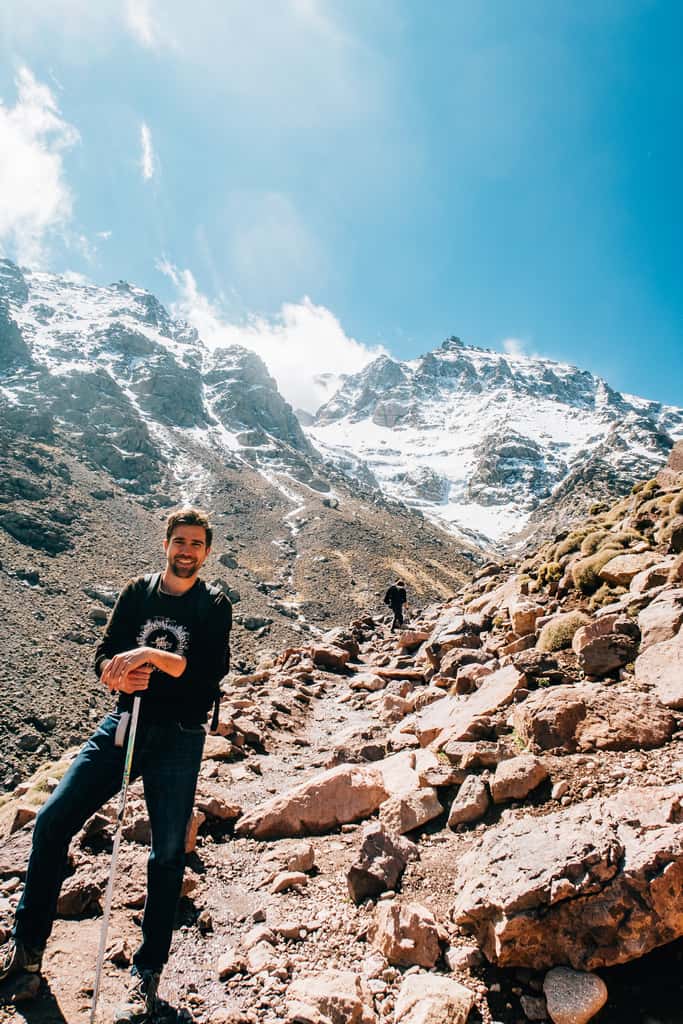
10. Staying at the mountain refuges in Toubkal
There are two mountain refuges on the way to the summit of Toubkal. One is called ” Les Mouflons ” and the other one is called ” refuge du Toubkal ”.
During the low season (winter and spring), there is no need to contact them ahead of time to book your stay there. You can just show up and there should be plenty of room.
I stayed in ” Les Mouflons ” and it cost me 280 MAD for the night with dinner and breakfast included. They have different prices depending on the time of the year.

If you visit Toubkal during the high season (summer and fall), I would suggest contacting the refugees ahead of time just to make sure they will have a bed available. These are the websites where you can contact them ahead of time:
- Les Mouflons
- Refuge du Toubkal

I hope you have an awesome adventure hiking from Imlil to Toubkal. It was one of the most challenging hikes I ever did but it was totally worth it. If you do climb Toubkal, let me know in the comments below how it went.
Related posts
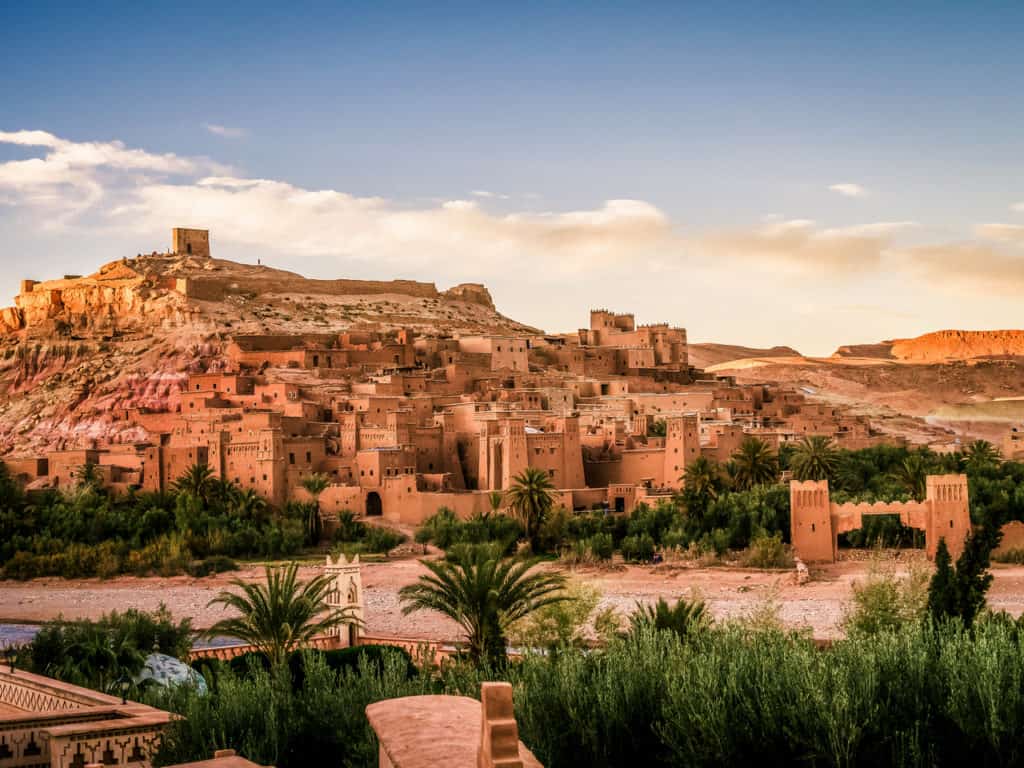
19 Very Useful Things to Know for Backpacking in Morocco in 2024 – The Complete Travel Guide to Morocco
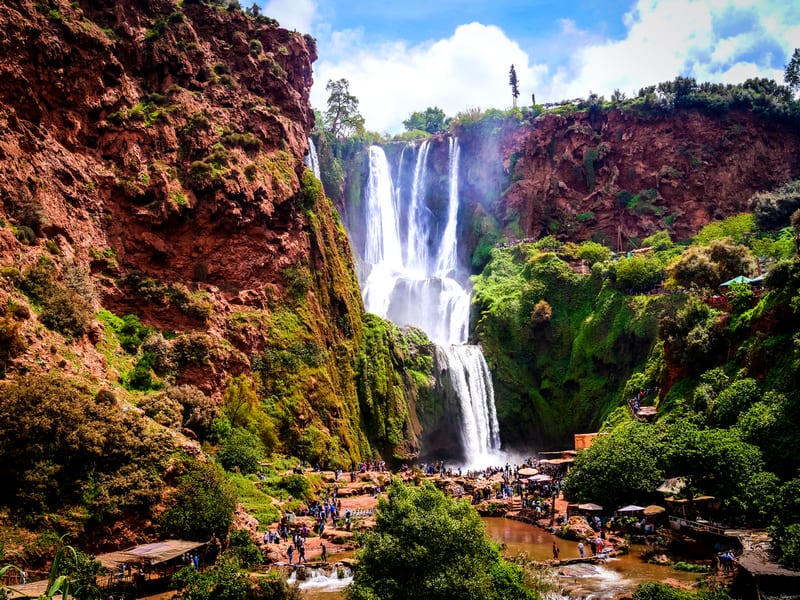
The 17 Best Places to visit in Morocco in pictures

The Honest Guide to Meknes Morocco and Volubilis – 9 best things to do and what to skip
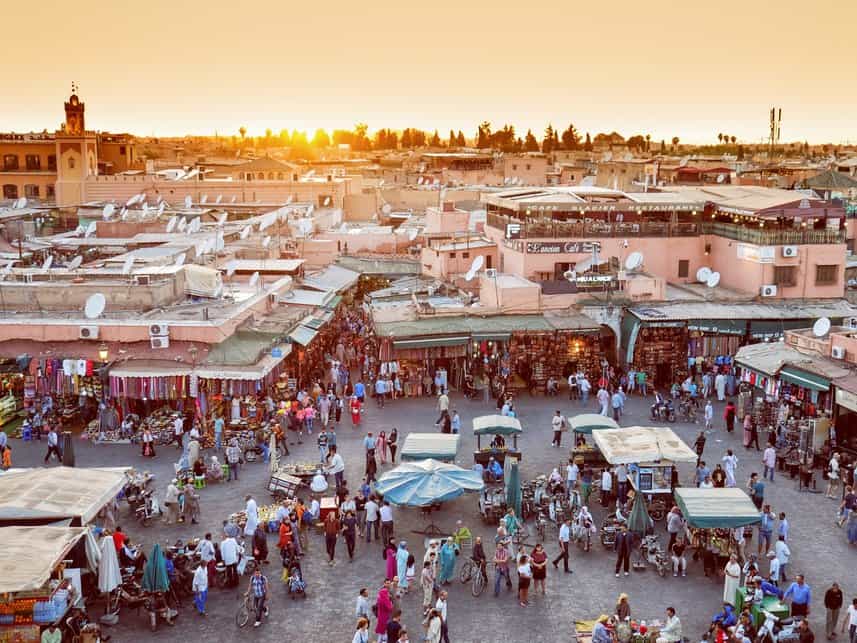
16 Top Things to do in Marrakech Morocco – The Complete Guide to Morocco’s Red City
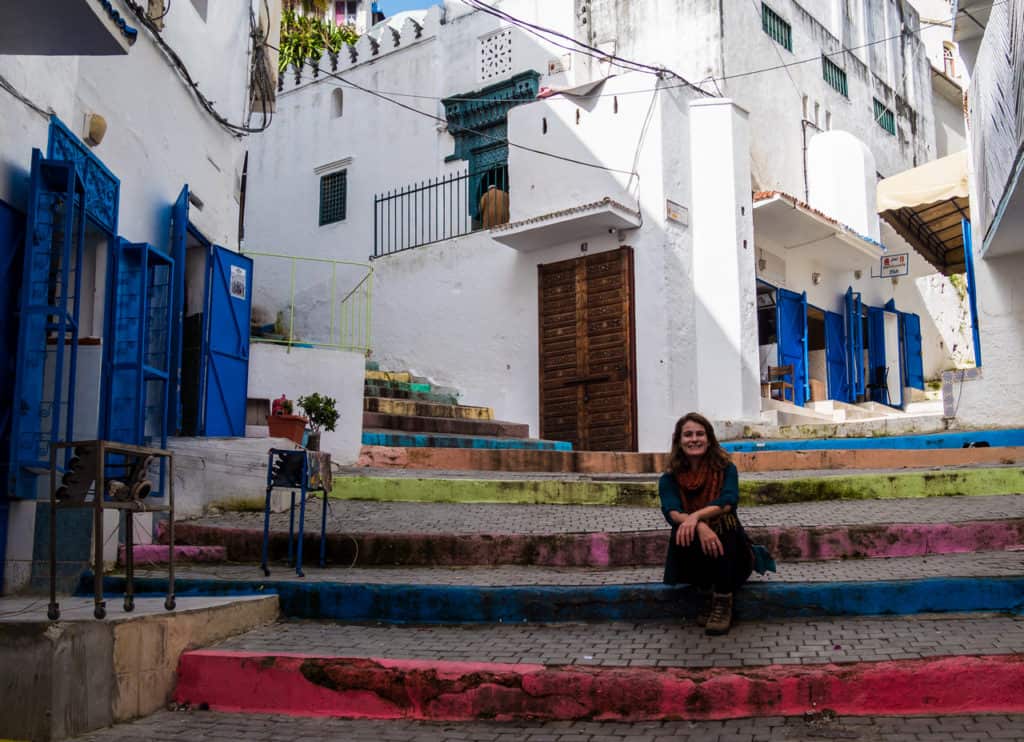
Is Morocco expensive – Morocco Budget Guide for 2024

11 Best Things to do in Rabat Morocco – The Complete Guide to Morocco’s Capital City
More morocco travel resources:.
- What you need to know before you go: 23 Travel Tips for Morocco
- Is Morocco Safe? Safety Guide to Morocco
- How to avoid the 12 most common scams in Morocco
- See the best of Morocco by following these 3 great travel itineraries
- Visit these beautiful 17 places in Morocco
- Tips for traveling to Morocco during Ramadan
- Morocco City Guides: Fez , Tangier , Essaouira , Chefchaouen , Rabat , Meknes , Marrakech , Casablanca , Agadir
- The best daytrips from Marrakech
- Fun things to do in the Sahara: how to plan a desert trip to Merzouga
- The Complete Guide to Imlil and Hiking Mount Toubkal
- Everything you need to know about visiting the Ouzoud Waterfalls
- Rock climbing and other fun things to do in the Todra Gorges and Tinerhir
- How to get to the Akchour Waterfalls from Chefchaouen
- A guide to visiting the Ouzoud Waterfalls
- Surfing in Morocco – The best surfing spots in Morocco
- How to visit Paradise Valley in Agadir
- What to wear in Morocco: Complete packing list for Morocco
- Morocco photography tips: How to take portraits of people in Morocco
- Extend your stay in Morocco using one of these 3 ways to renew your Morocco visa
- Useful tips on how to take the ferry from Tangier to Spain
- Books about Morocco: 10 Great Novels set in Morocco
11 thoughts on “Mount Toubkal Trek: The Complete Guide to Imlil and Best Ways to Hiking Mount Toubkal in Morocco in 2024”
Hello, Thank you very much for these informations.
In your review, you mentionnned you ended up climbing the mountain with an uncertified guide. Does Hassan is an uncertified guide?
Is it a problem to hike toukbal with an uncertified guide?
Hi Maxime, that shouldn’t be a problem as Hassan was also uncertified but… you definitely need someone who knows the region well and knows what to do in case of emergency.
May I know when did you do your hike? I am looking to hike in February , would the weather still be very cold and harsh?
Hello Ann, Niko did this hike at the end of March and there was still a lot of snow up Mount Toubkal. You can definitely expect snow and cold weather in February. Please prepare well!
Hello Niko! Congratulations for your work and adventures. I am organizing a 3 days trekking trip on Atlas Mountain in october. Hike to Toubkal and Ounakrim. I am aware of the necessity of having a guide. Is it so easy to find unofficial guide in Imlil? The price you have written is for one person a day? I also would like to contact Hassan but I do not speak french or spanish and he has not whatsapp account… Thank you for all information!
Yes, that would be the average price per person for one day, even with an unofficial guide. It will be very easy for you to find a guide directly in the streets of Imlil or at the guide office on the main street. Hassan, unfortunately, doesn’t have a WhatsApp but you could contact him by getting a local sim card upon your arrival in Morocco.
Hello I want just to tell that Hassan has an WhatsApp account now
Thanks for the info!
This blog was a great inspiration. We did the Toubkal Circuit last week and loved it! Hope to get more inspiration here for future hikes!
Hi there! Thank you so much for this detailed journal about Morocco. It’s super helpful. I was wondering if the prices mentored here are still the same in 2023? Taxi from Marrakesh to Imlil still around 250-300 MAD please?
It might be more expensive but I haven’t received any updates yet. Please let me and other readers know if it would be the case.
Leave a Comment Cancel Reply
Your email address will not be published. Required fields are marked *
Save my name, email, and website in this browser for the next time I comment.

- Best Hikes In The World
- Appalachian Trail
- European Hikes
- Nepal Hikes
- Patagonia Hikes
- See All Hikes
- Mount Kenya
- Mount Kilimanjaro
- Mount Toubkal
- See All Mountains
- South Africa
- New Zealand
- Switzerland
- United Kingdom
- Packing Lists
Climb Mount Toubkal – Complete Guide to North Africa’s Highest Summit
Africa , Hikes , Morocco , Mountains
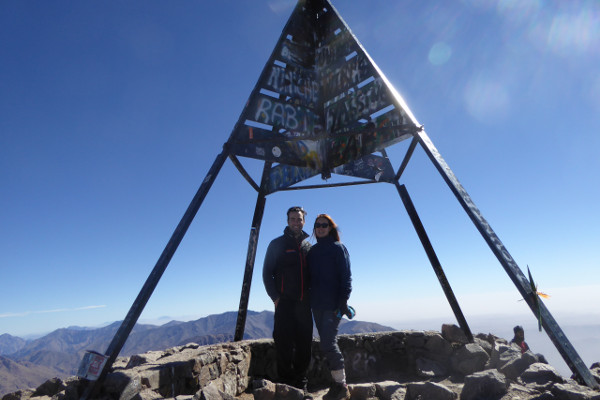
Welcome to our complete guide to trekking Mount Toubkal ! Immerse yourself in the vivid culture of Morocco and climb the highest peak in North Africa.
With breath-taking views of the Atlas Mountains, green valleys, and endearing Berber villages, Mount Toubkal will not disappoint. The trek may be moderate in difficulty , but the journey will be difficult to forget.
Below you will find a full guide on everything you will need to know before you climb Mount Toubkal . We booked our guided trip through a company called Skyhook , and had so much fun on this experience (see video below).
Mount Toubkal Overview
Where is mount toubkal.
Mount Toubkal or Jebel Toubkal is the highest peak in North Africa. Toubkal is apart of the Atlas Mountain Range and is located in the southwestern part of Morocco, about 60 km south of Marrakesh .
Can You Climb Mount Toubkal?
Mount Toubkal is a non-technical summit with its highest peak at 4,167 meters. At the peak awaits views of a dramatic border between land, ocean, and desert.
There are two approaches to reaching Toubkal, the South and the North. The Southern approach is the most popular and straightforward, while the Northern route is longer and best for experienced hikers.
One of the popular features about Mount Toubkal is that you can trek the mountain and be out of Morocco in 4 days. You would want to do this with caution in order to allow for acclimatization due to the high altitude, but this makes an excellent long weekend holiday full of adventure.
History Of Mount Toubkal
In 1923, Vincent Berger, Hubert Dolbeau, and Marquis De Segonzac were the first Europeans to summit Toubkal. A year later, the height of Toubkal was formally recorded and the trigonometrical structure was carried to the peak in 1931.
How Fit Do You Need To Be To Climb Mount Toubkal?
Toubkal is for keen walkers and hikers with a moderate fitness level. Toubkal is a fun and challenging trek with gratifying views from the peak. You will see the remote villages of the Berber people, roaring waterfalls, rivers, and the crash site of a cargo plane, depending on your route.
If you join an organised tour group, your guide will bring along food and mules with muleteers will be used to carry all of your things. If you decide to trek independently, then you will need to arrange refuges to eat and rest, and carry your own gear.
Join a Mt Toubkal Hike
Book with our recommended local guide
Typical Itinerary
This itinerary follows the most common route to Toubkal on the South. We highly recommend itineraries that build in one or two more days for acclimatisation.
Day 1: Arrive in Marrakech, drive from Marrakech to Imlil, and spend the night in Imlil
Day 2: Trek to Refuge Camp and spend the night
Day 3: Trek to Toubkal via South Side and descend via South Side
Day 4: Return to Imlil and spend night
Day 5: Return to Marrakech Menara Airport
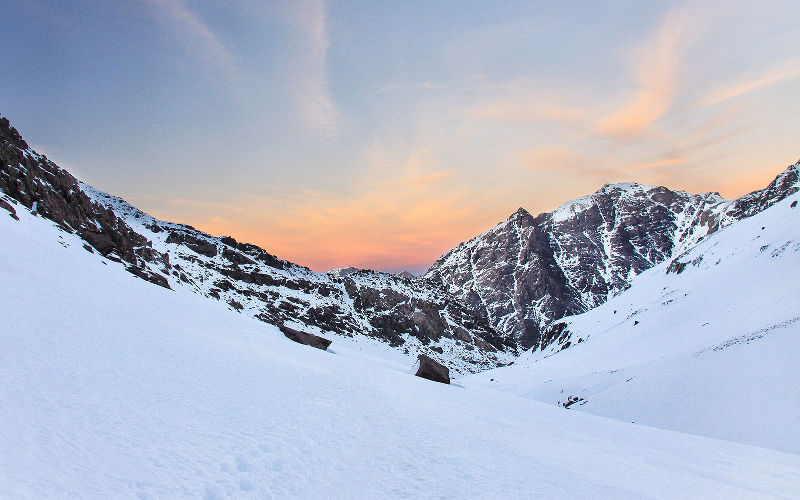
A Toubkal Winter Ascent is an awesome challenge, but does require some technical mountaineering skills.
Independent Trekking vs. Guided Treks
Why hike mount toubkal without a guide.
An experienced hiker could most definitely trek Mount Toubkal alone. There are many villages and settlements on your way to the peak in case you get lost. If you are trekking during the spring, you are likely to be surrounded by numerous amounts of hikers who could guide you in case you get lost.
There are two refuges at the base of the mountain (more on this below), where you can get food and sleeping quarters (please note: these refuges get busy during the peak season so booking ahead is advised).
It is important to note that there are many summits in this area. Ensure you are using the correct path to get up Mount Toubkal. Otherwise, you could get lost.
Why Hike Mount Toubkal With A Guide?
If you are not very experienced in hiking at altitude or just prefer having the logistics of a trip arranged for you, then we recommend you employ the services of a guiding company.
Guide companies typically arrange the whole trek for you. This is including accommodation, transport to and from Marrakech, food on the trek and mules to carry gear.
A guided group trekking experience allows you to interact with other hikers. You will have the opportunity to make friends with people who have similar interests.
A guide provides peace of mind, so you can focus more on the views and less looking at a map. They are likely to have gone up Toubkal hundreds of times and know exactly where to go and when to take breaks.
Guides ensure you get plenty of food and water, which is crucial for any trek. There will be water sources along the way but it is best to bring your own water bottle and water purification tablets.
Overall, having a guide is best for convenience and safety. A guide is especially useful when visiting Toubkal in winter due to the dangers of slipping and getting lost in freezing temperatures.
Popular Routes
There are two main approaches to trekking Mount Toubkal - the South and North Side routes. There are a few other variations but these require more experienced hiking and a longer expedition. The most common route begins on the South side.
The Southern route is mostly commonly used because it is significantly easier and has worn paths making the trail easy to follow. It is followed by 98% of trekkers. The Northern approach is a longer route and requires a skilled hiker. Even when taking the more difficult route for the ascent, it is recommended that you use the popular South side route for your descent.
During the spring and summer months, Toubkal is certainly a hike/trek rather than a climb.
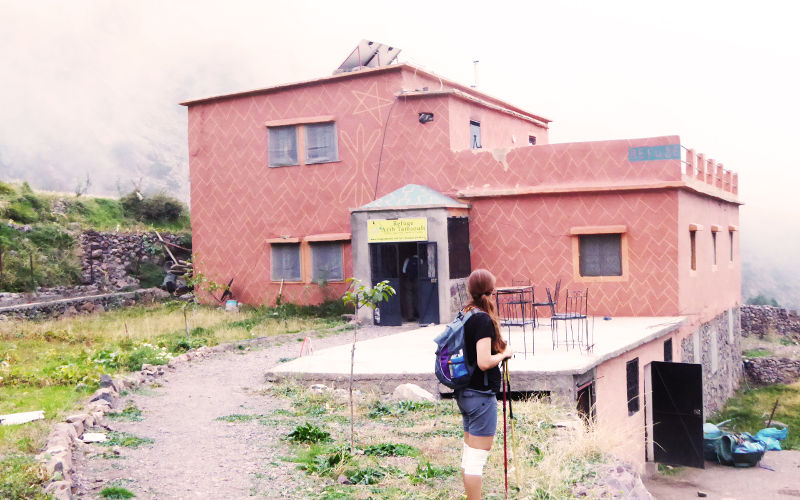
A cool Refuge at Azib Tamsoult.
It is non-technical but moderately difficult due to some steep slopes (no climbing required, but you will need to scramble occasionally) and the high altitude. You should be prepared to walk for several hours each day, depending on the route and duration of your trek. There is a risk of altitude sickness , but this is easily avoided through proper acclimatisation.
During winter, Toubkal becomes a technical hike and requires special gear. You should highly consider booking a guide and ensure you are familiar with using an ice axe and crampons (see details on a winter ascent below).
Trekking Toubkal should take you 4-5 days in order to properly acclimate and allow for a nights rest at Imlil and the refuge.
Acclimatisation Hikes
As trekking Mount Toubkal requires your body being at high altitudes, it is crucial to allow time for adjustment.
A rule of thumb is “climb high and sleep low.” It’s important to gain height slowly, about 500m a day once you are at 2,500m. You should be drinking plenty of water as well.
The best way to acclimatize to trekking Toubkal is to start with a good nights rest in Imlil and then stop at one of the refuges to sleep for the night. This allows your body to adjust gradually, as the walk from Imlil to the Toubkal Refuges is about 12km alone.
After spending the night at one of the Refuges, you will wake up early, feeling refreshed, and begin your trek up to the summit of Toubkal.
It is best to begin your trek in the early hours of the morning, with a headlamp, to avoid returning too late in the day and being obligated to sleep at the Refuge again. It is also great to get up to the summit for sunrise!
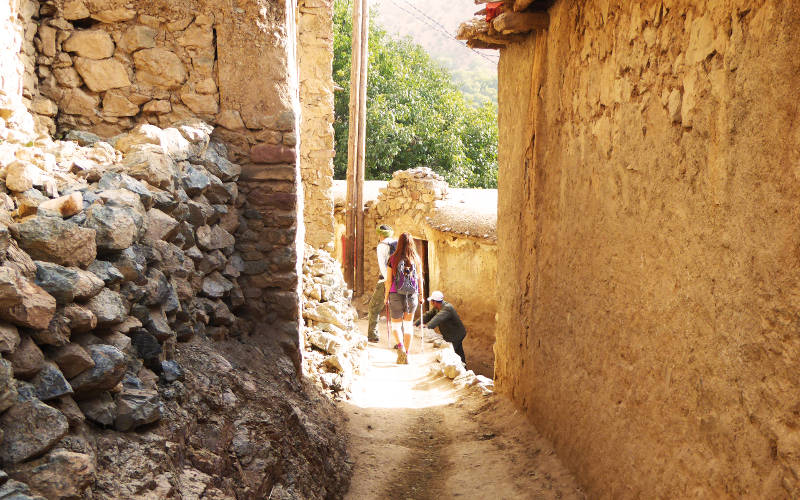
Inside a Berber village. Many of these villagers have Gites (hostels), where you can sleep the night.
Another option to acclimatise is to spend the night in Aroumd. This is on the way from Imlil and the village has plenty of gites (villagers homes) available. This way you would spend one night in Aroumd and the other at the refuge.
For a longer acclimatization, you are able to begin the trek in Ouirgane rather than Imlil. Ouirgane is a Berber village further from Imlil. You will have to spend two nights in different gites before reaching the refuge. This route is ideal for those who want to ensure they are properly acclimatized.
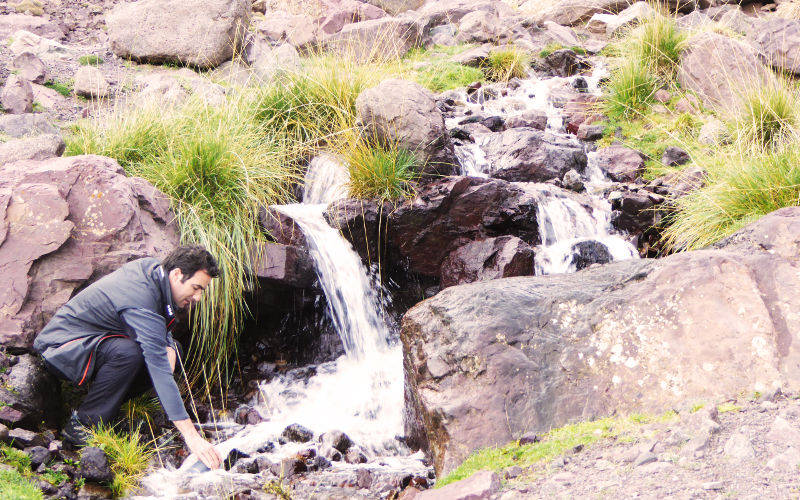
There are many streams in the High Atlas where you can collect water. Just make sure you bring water purification tablets to purify the water.
Toubkal Winter Ascent
Toubkal in Winter is more technical than a Spring or Summer trek as the terrain is completely covered in snow and ice.
Winter ascents of Toubkal start in November and run all the way through to the end of April.
A winter climb of Toubkal is achievable by someone who has never hiked on snow, but we highly recommend you do some basic winter mountaineering practice before undertaking the challenge.
The skills you need to be confident with are:
- Walking in crampons across snowy / ice surfaces, with mixed rock
- Using a straight handle ice axe to sturdy your balance and anchor your hike in areas that are a little exposed
- Confidence on 30-35 degree snow slopes
- Ability to traverse steep sections (sometimes you may need to hold or clip into a fixed rope, although this is rare).
- Ability to scramble up a mixed terrain surface of rock, snow and ice with crampons on
None of these skills are particularly difficult, but if you are doing this for the first time they can be scary and challenging. Hence, why we suggest you get some practice winter mountaineering skills.
Also, at high latitude and when the weather is bad, seemingly easy terrain can appear very challenging.
We recommend taking an experienced guide / joining an organised group if you are not very experienced. Guides are not instructors though. Most will not be able to formally train you on how to hike in snow, use an axe and crampons. It is up to you to determine whether you can handle utilizing these tools and manage on snowy terrain.
Join a Winter Mt Toubkal Hike
Toubkal refuges, les mouflons vs. cabine alpine francais (caf).
When climbing Mount Toubkal, you will most likely begin from the village of Imlil. It will take you about 5-7 hours to get to the Toubkal Refuges. It is not recommended that you complete the trek to Mount Toubkal in one day. You should be stopping here or at other villages to get your rest before completing the trek.
There are two Mount Toubkal Refuges. There is Les Mouflons and Cabine Alpine Fancais (CAF). The Les Mouflons is named after a deer (Mouflons) found in the Atlas Mountains. Cabine Alpine Francais is also called the “Neltner”, named after Mr. Louis Neltner, a geologist, and mountaineer. You are able to book both refuges online in advance.
The Refuges’ are by no means luxury, but they do the job. They are dorm style and have shared bathrooms.
When choosing a refuge, Les Moulfons is less expensive than CAF, so if you are on a budget choose Les Moulfons.
CAF has slightly better amenities (kitchen, rooms, toilet / bathroom facilities) and because of the higher price tends to be less busy.
It is always a good idea to bring some snacks of your own, as the Refuges offer very basic food. Take advantage of your time in Marrakech and purchase some delicious dried fruits and nuts.
If the weather is good and you have camping equipment, it is possible to camp outside the Refuges.
Getting to Morocco and Toubkal
To get to Mount Toubkal, you need to fly into Morocco. The closest big city to Mount Toubkal is Marrakesh. The only international airport in Marrakesh is the Marrakesh Menara Airport. The drive from the airport to Imlil is about 1 hour and 30 minutes. If you are planning to trek with an organised group then most meet in Marrakesh where you will likely overnight and explore the city.
The trip from Marrakesh to Imlil will cost you around 75 dirhams ($8) per person in a shared taxi, or 300 dirhams ($30) in a private taxi. Be careful when taking a private taxi and agreeing on a price. They will overcharge so negotiate with the driver as much as you can. The shared taxi station is near the Sidi Mimoun Garden.
Please note: There is no need to obtain the Moroccan Dirham ahead of your trip. You will be able to exchange currency upon arrival in the airport. It is a good idea to have some cash on you for your taxi, food, and the tipping of guides.
Best Time to Trek Toubkal
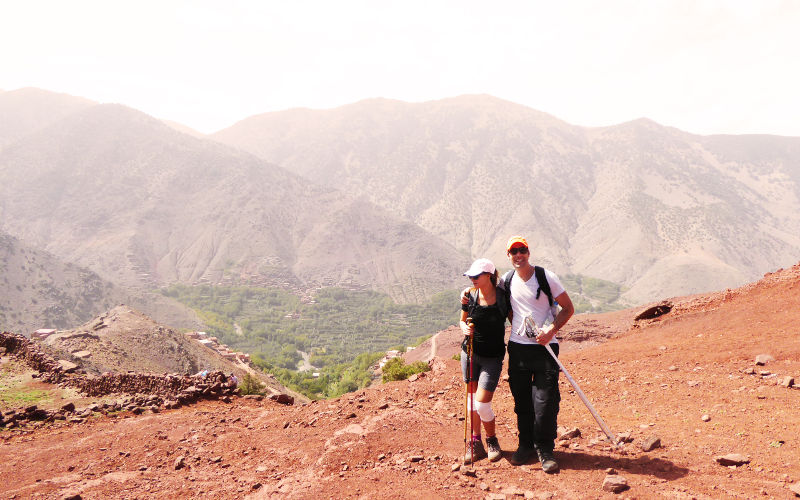
During the Spring and Summer months, the weather is hot throughout the Atlas. Temperatures drop in the evenings and early mornings. Winter months in the High Atlas are cold.
Trekking Mount Toubkal can be done all year round.
The best time to hike is in the Spring, April or May. The weather is not too hot and you are still able to see some snow on the mountains. Due to the rewarding weather, Spring is peak season.
The Summer months - June through to August - are usually very hot. Trekking in the Atlas is fine, but make sure you drink loads of water.
September and October are good shoulder months for trekking.
In Winter, from the month of November to April-May, Toubkal becomes a technical climb. You will need special equipment such as an ice axe, crampons, and fixed rope (see Toubkal Winter Ascents above).
How Difficult is Toubkal?
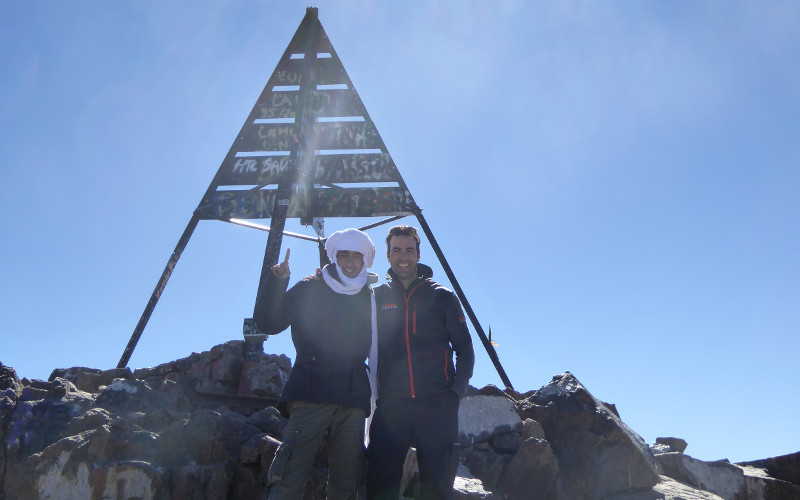
The summit of Mount Toubkal (4,167m)
Toubkal is a moderately difficult hike due to the high altitude. The actual hiking itself is pretty easy and the summit approach from the south side from May-October is relatively straightforward.
Winter ascents from November through to April are much more challenging. To undertake a winter ascent we highly recommend doing a basic winter mountaineering course, where you will learn how to use crampons and an ice axe. You should know the basics of how to do an ice axe arrest and be confident on 30-35 degree snowy slopes.
In terms of training, you will need to be comfortable walking for numerous hours each day for several days. At a minimum you should do one or two multi-day practice hikes that last 4-5 hours a day in your home country.
It would also be smart to build up endurance by doing a month or two cardio gym training before your trek. If you have managed multi-day treks in the past you will do just fine.
Mount Toubkal Gear List
The packing list for climbing Mount Toubkal is relatively straightforward. If you are trekking in the Spring and Summer months, then you can expect pretty good weather. Rain is always a possibility and temperatures in the Atlas mountains do get quite cold at night.
In terms of clothes you should think about layers - base layer , fleece layer, warm outer layer. See recommend items below.
In terms of Winter ascents on Toubkal, you will need more layers - specifically a hard shell waterproof jacket and trousers, a warm outer jacket (down or synthetic) and additional layering for your hands, feet and head. You will also need some technical gear, like crampons (and rigid sole boots that can take crampons), a straight handle ice axe and potentially a harness and carabiners to clip into a fixed rope (please confirm requirements with your tour operator).
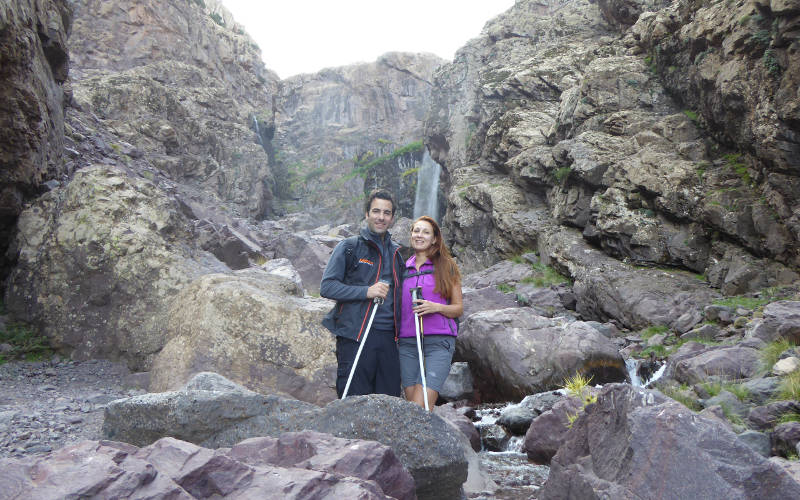
Packing list! In the summer and spring months, the climb doesn't require a lot of gear. Winter ascents will require more gear.
- Thermal baselayers (temperatures decrease in higher altitudes)
- Lightweight waterproof jacket
- Fleece jacket or warm jumper
- Trekking trousers and shorts in Summer
- Good trainers for valley treks / to wear after a days hiking
- Mid-weight hiking boots
- Lightweight thermal or fleece gloves
- Sunhat /warm hat
- Head torch and spare batteries - the summit push usually happens before sunrise!
- Personal lock (for unattended bags)
- Water purification tablets or water filter
- Trekking Poles
- 4 season sleeping bag (winter), or light 3-season sleeping bag (summer)
- Water bottle
- Soft Sided duffel bag (50-80 liters) - carried by mules. If trekking independently, then a 50-60L backpack.
- Lightweight day pack
Toiletries and First Aid
- Sunblock for body and lips
- Antibacterial hand wash
- First aid kit: antiseptic cream, diarrhea treatment, throat lozenges, painkillers, plaster and blister treatment, hydration salts, insect repellent
Other Items:
- Toilet paper
- Sleeping bag liner
- Therm-a-Rest (cushion for sleeping bag) - optional!
- Pen knife (keep in hold luggage when traveling)
- Repair kit (thread, needle, duct tape)
Winter Trekking Gear
- Ice axe - straight handle (60-70cm)
- Crampons - and hiking boots that can fit crampons
- Waterproof hardshell jacket
- Waterproof, lined trousers
- A warm synthetic or down jacket
- Gloves (inner thin and outer thick pair)
Important Info To Know Before Trekking Mount Toubkal
Visa, vaccinations and safety.
When entering Morocco, you are required to have a passport that has at least 6 months of remaining validity and two blank pages within the passport for entry and exit.
Most countries do not require a tourist visa to enter Morocco for a duration of 3 months. These countries include Britain, Australia, New Zealand, Canada, U.S., Japan, and other EU countries. South African citizens require a visa. Check with your relevant embassy or official Moroccan consulate for other nationalities.
If you are arriving from an area at risk of Yellow Fever, you will need your International Certificate of Yellow Fever.
Other vaccinations that are a point for good measure include diphtheria-tetanus-polio, measles-mumps-rubella, hepatitis A, and typhoid.
Road safety in Morocco is a concern. Make sure you only take rides with licensed taxi drivers and don't be afraid to ask your driver to slow down.
Morocco is a predominately Muslim country and therefore a conservative approach to dress and public behaviour should be adopted at all times. Sexual relations outside of marriage and homosexuality is prohibited. If you are travelling with your partner it is not unusual to be asked to show proof of marriage before checking into a hotel.
For more information on safety whilst travelling in Morocco, check out the UK FCO website .
People, Culture and Other Things To Do
Moroccans are people of Berber, Arab and Arab-Berber descent. The population is 33 million and most people follow the Islamic faith.
Morocco has many other cultural influences from countries like Europe, The Middle East, and Sub Saharan Africa. Women and men dress in a djellaba and men wear a red cap, a burnoose, for special occasions.
Moroccans are known for decorations and rich colours. The red colour is found naturally in most of the buildings. Moroccan cuisine is something you must try while visiting. It is extremely flavourful. Moroccans are famous for couscous, tajine, pastille, halwa, and mint tea served from a traditional long spouted teapot.
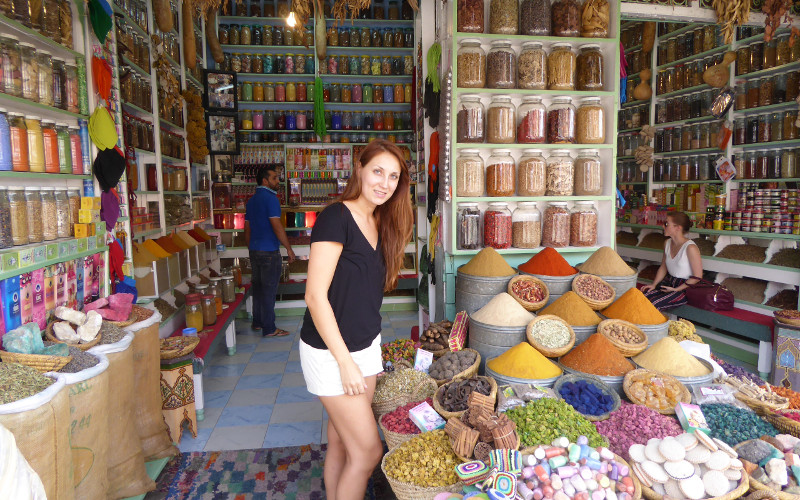
Moroccans are hospitable and welcoming to tourists. As most people follow the Islamic faith, it is important to be mindful of this. Both men and women need to be considerate of their dress, especially in rural areas. Women should cover their arms and shoulders, and wear garments that cover from the knees up. Men should cover their shoulders and be covered above the knee as well.
When entering a home, it is expected that you remove your shoes and follow the host. You are expected to leave tips. The rule of thumb is waiters at cafes receive about 1dh each, restaurants 5dh, and porters 5dh. However, taxi drivers do not expect a tip.
On Mount Toubkal you are able to go on skiing towers in wintertime, horseback and camel riding in the Atlas Mountains, and visit other mountains and Imperial cities. Morocco has so much to offer other than trekking Toubkal. Whether you want to shop the marketplace of Jemaa el-Fnaa, visit the Majorelle Garden, or explore the Sahara Desert and its wildlife. You are in for a vivid adventure.
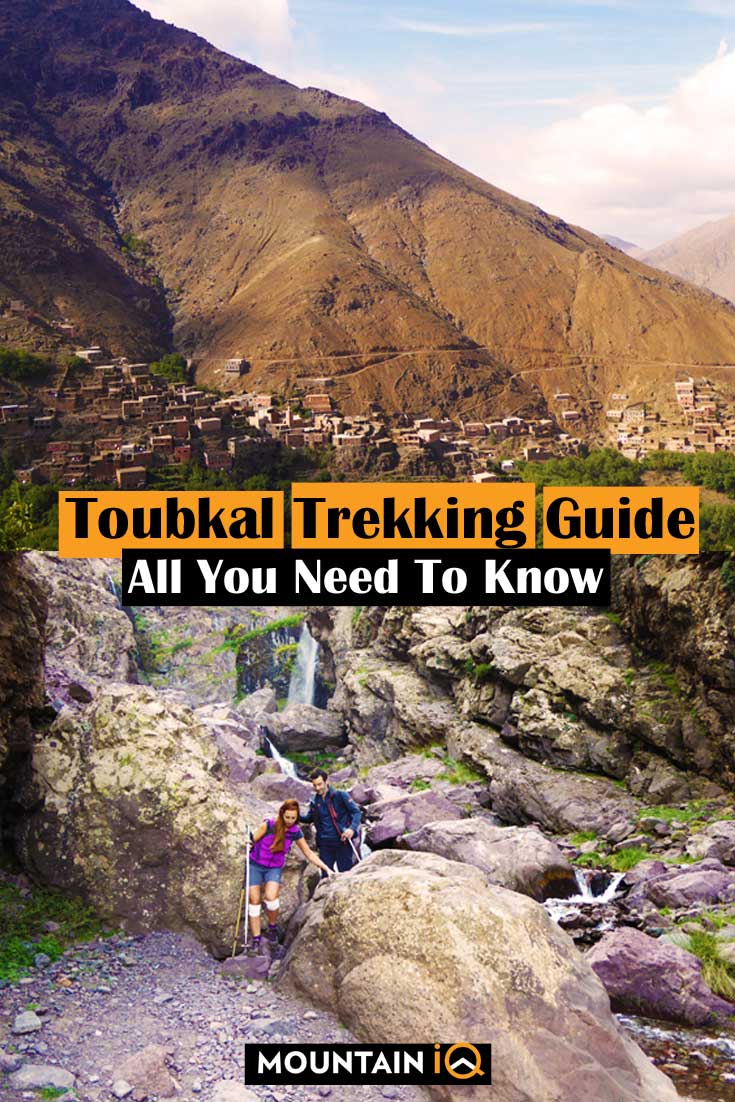
About the author
Mark Whitman
Mark has trekked extensively in Asia, Europe, South America and Africa. He founded Mountain IQ in 2014 with the sole aim to be the best online information portal to some of the most popular mountain destinations around the world. When not writing for Mountain IQ, Mark is out exploring the outdoors with his wife!
Leave a Reply
Your email address will not be published. Required fields are marked
i work as a guide in toubkal massif and i climb mount toubkal once a week everything you said is true thank you very much for sharing your experience with the world and making our region popular
2 Day Climb of Mount Toubkal
My girlfriend and I recently completed the 2 day Jbel Toubkal climb and it was without a doubt the highlight of a fantastic week in Morocco. We booked through Viator and were informed in our confirmation email that private-marrakech-day-trips.com would be our operator.
The transfers to and from the start point of the trek were good with a large and very road worthy 4×4 (i believe they also use these vehicles for the Sahara tours) taking us directly to and from Imlil the start point.
The trek itself is quite tough, with the first day taking 5 hours of uphill walking in moderate heat (this was July) and the second day being around 10 hours of walking! We were quite fit but relatively inexperienced so having a guide was a must. Omar our guide was excellent throughout.
A number of people we met on the mountain did not have a guide which did make me question the need for one. Regarding that question i can say emphatically that IT IS WELL WORTH HAVING A GUIDE! Even if you are a well experienced mountaineer the paths up Toubkal are very steep and not particularly clear at times. We saw many unguided people get abit lost and having to backtrack (usually to follow us). The guide also arranges all your meals and transfer of your excess luggage by mule, your accommodation and more. Having these done for you especially on the short 2 day trek is great. Also i doubt organizing these things would save you much money anyway as in Morocco there is a price the locals pay and a price tourists pay (as with most places).
Top tips: Take water with you as it is expensive on the mountain and your mule can carry the pre-bought supplies. If you want a more relaxed pace then go for a 3 day option (2days is quite intense). Take you camera because the scenery is amazing.
Hi – I’m considering doing this trek (probably in September/October time) and was wondering if you could tell me how much exposure there is? I’ve done quite a lot of trekking before but sometimes get a bit nervous if I have to hike along sheer drops for a long period of time. Is there much of this on this trek or is it mainly up the valley to the summit as it appears from your photos? Thank you – Anna.
Hi Anna, Sept / Oct is the summer season so there is basically no serious exposure. There are a few sections that require minor scrambling but in general Toubkal in the summer season is straightforward.
Very useful thanks. Just a bit surprised with the photo of woman in shorts and short sleeved tee shirt, just above paragraph on considerate dressing!!
Hi there, I enjoyed reading your article. I am in Morocco and I really want to hike the Toubkal mount but I want to do it in one day. I think I can say I’m an experienced hiker, recently I hiked Katahdin mountain in Maine USA. It’s not so long, around 8000 meters long and elevation gain of 3,982-ft, this trail is considered very strenuous clim and is very exposed. Do you think Toubkal can be done in 10-12 hours? And also alone without a guide. Just using trekking apps like Gaia.
Yes, Toubkal can be done in a day from Imlil, but you will need to be ultra fit and well acclimatised. Most people hike from Imlil to the refuges, overnight and then do Toubkal in the morning before returning to Imlil in the afternoon.
Great info, Thankyou. My husband has knee pain at the moment (usually comes and goes and settles down with time so he is still able to walk ok) but I’m wondering how bad the actual track is. I’m stressed if his knee is still playing up for our trip in Sept he won’t be able to go. Any extra advice/thoughts would be appreciated! 😫
Hi Mandy, the hike is pretty demanding and you will be on your feet for 5-8 hours a day hiking. The summit push is particularly long and hard. Coming down may be the biggest challenge for your husband. I recommend he takes a knee support and uses trekking poles.
Hi! We are going to trekking at the beginning of October. Is it true that taking a local guide from the control post at the village Armed is obligatory? We are experienced mountaineers and I am a certified Mountain Guide in Slovenia. Thanks for the answer.
Hi Marko, it’s been a while since we were in Morocco so things may have changed, but we didn’t need to take a guide when we went in 2014. If you do eeed a guide, you can get a super affordable deal on Skyhook: https://www.skyhookadventure.com/trips/toubkal-summer-ascent
Great information. Thank you for the post.
I will be climbing MT. Toubkal around July 23-24. Flying in Casablanca for a week to climb and tour Morroco. If anyone's itinerary is similar and would like to join would be great.
23rd Casablanca-Marrakesh-Imlil-Agadir-Essaouria-Safi-Casblanca. Flu out on July 28
Hi Abraham, you can join an open group trip here: https://www.skyhookadventure.com/trips/toubkal-summer-ascent
We work with local guides to offer great value adventures at unbeatable prices
Mount Toubkal Trek: Your Comprehensive Guide to Climbing North Africa’s Tallest Mountain
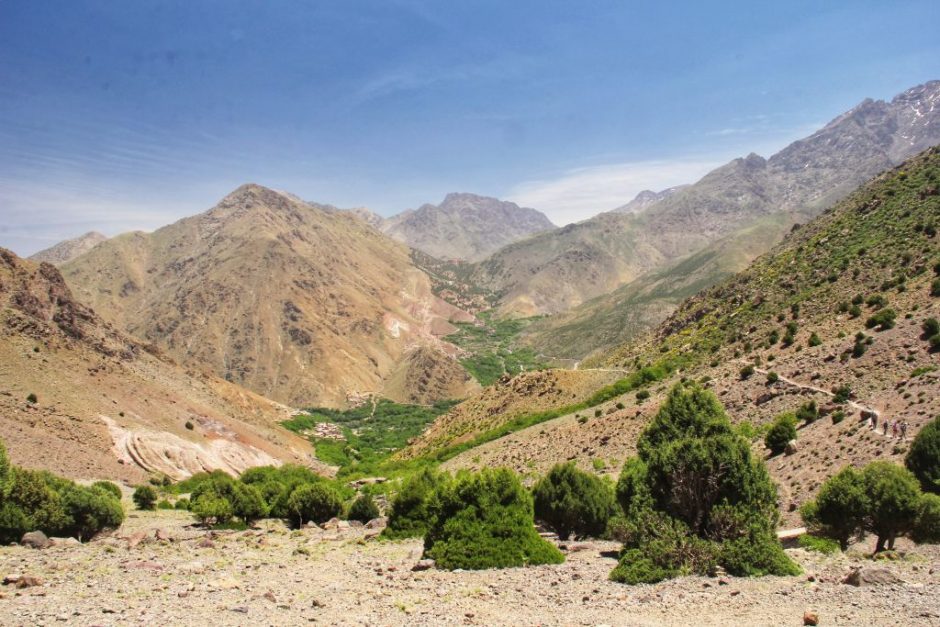
In this post you’ll find everything you need to know about hiking the Mount Toubkal trek, including routes, costs, preparation, what to pack and what to expect.
Some of the links in this post are affiliate links. All this means is that if you make a purchase through one of the links I have provided, I will earn a small commission as a result but the cost to you will remain exactly the same.
My friends and colleagues called me crazy when I told them I’d be spending almost the entirety of my four-day ‘holiday’ to Morocco climbing a mountain and sleeping in rudimentary mountain refuges at night, sharing a room with around 20 other hikers who may or may not have showered in the last few days.
Ok, I admit that I’m not a huge fan of the latter (pack your ear plugs and sleep mask!) but it’s all part and parcel of completing the three-day Mount Toubkal trek, and reaching the 4167 metre summit of North Africa’s tallest mountain.
The friends who I made the climb with had the slightly more sensible idea of spending a few days in Marrakech beforehand, to enjoy some relaxation time and an opportunity to acclimatise to the heat. Whereas I decided to finish work on the Friday, travel to Marrakech on the Saturday (I left my hometown at 10am and arrived in Marrakech’s medina 12 hours later) and then start hiking on the Sunday.
I won’t mention the fact that I arrived home at 4:30 a.m on the Thursday and was at work four hours later. Ok, my friends and colleagues may have been right after all 😉
Where is Mount Toubkal?
Mount Toubkal is located 63 kilometres south of Marrakech. The start and end point of the Mount Toubkal trek is the village of Imlil, 1800 metres above sea level. Imlil is a 90-minute drive from Marrakech.
When is the best time of year to make the climb?
This depends on exactly how much you want to challenge yourself!
Climbing Mount Toubkal in the Summer is difficult due to the heat (there’s not much shade on the trail) and in the Winter it’s bitterly cold and you’ll need additional equipment like crampons and ice picks. So the Winter climb is a lot more technical and also more dangerous due to the snow and ice.
For the optimum conditions on the trail, the best time of year to do the Mount Toubkal trek is Spring (April or May) or Autumn (September or October). We chose the former because we’d heard that there should still be traces of snow on the peaks and also some colourful Springtime flowers in bloom, both of which we thought would be good from a photographic point of view.

How fit to I need to be?
It’s not a technically difficult climb, but there are long days of hiking and lots of relentless uphill sections. I’d say that as long as you have a reasonable level of physical fitness and a positive mental attitude, then you’ll be fine. I don’t consider myself to be very fit, but I do lead a moderately active lifestyle. I walk to work and back every day, go running twice a week and usually hit the gym once or twice at the weekend.
One of the main issues with the Mount Toubkal trek is the altitude and the speed at which you ascend and descend. We climbed 450 metres on the first day, a whopping 1400 metres on the second day and then a further 1000 metres on the third and final day. And then we made the 2850 descent all in one go, with a short break for lunch.
Hiking when you’re suffering from altitude sickness is hard . Sometimes the symptoms can be so bad that you have no choice but to retreat to a lower altitude. Sometimes the symptoms come on so quickly and severely that you cannot even manage that. In that instance four-legged help would likely be utilised in order to transport you back down the mountain as fast as possible.
Although no-one is immune from altitude sickness, you can take the following precautions:
- Climb slowly . There’s no point rushing to the top when doing so could mean you won’t make it there at all.
- Eat carbs . When you’re at higher altitude you need more calories. So this is probably one of the few occasions you can gorge guilt-free on bread, pasta and potatoes. One of the symptoms of altitude sickness is a loss of appetite, so it’s important to eat even when you’re not feeling particularly hungry.
- Drink water . I’m so bad at remembering to drink water on hikes, but I made myself stop regularly to take a drink on this one and it absolutely paid off – apart from a bit of a headache on the way down, I didn’t suffer an ill effects at all.
- Avoid alcohol . This wasn’t hard for us in a Muslim country during Ramadan, but in most other situations, the temptation to have a cold beer at the end of a hard day’s hiking will probably be difficult to resist.
If you do get a headache, taking one or two ibuprofen tablets can help.
How long do I need?
It is possible to complete the ascent and descent in just two days (first day seven hours, second day around 10), but this route does involve returning to Imlil along the same trail you hiked in the opposite direction the day before.
Due to the high altitude, we didn’t want to rush the climb. We also didn’t particularly want to retrace our steps (although you do have to follow the same route up and down for the final part of the climb from the Toubkal refuge to the summit), so we chose a circular route, which is completed over three days.
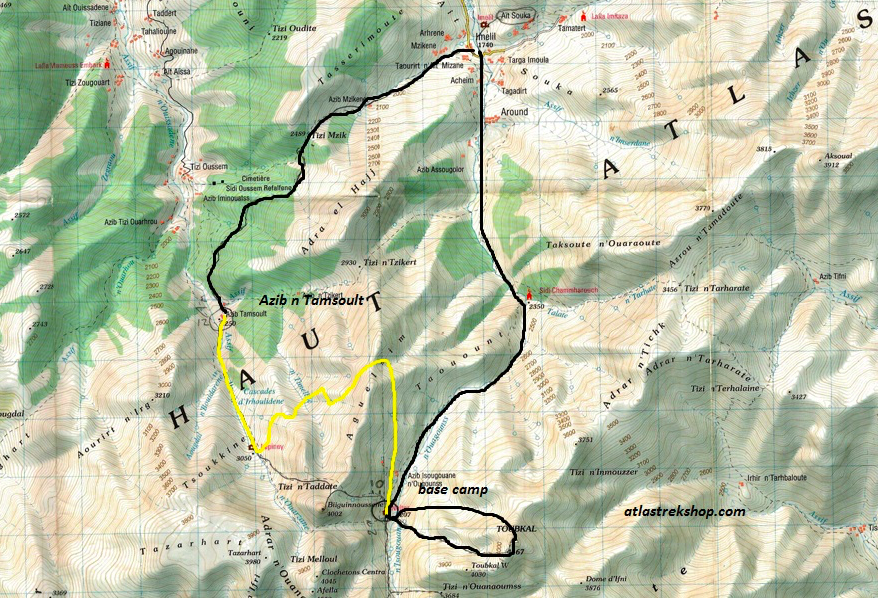
Photo credit: Aztat Treks (atlastrekshop.com)
It’s also possible to book longer treks, which include stays in traditional Berber villages. Having previously embarked on a similar adventure through the Atlas Mountains (but without the Mount Toubkal climb), I can thoroughly recommend this option if you have more time.
Can I make the hike independently?
Not anymore. Following recent events ( a couple of Scandinavian hikers were murdered in 2018 and there has been more than one fatal slip on the trail), qualified guides are now required even for the normal Mount Toubkal trek routes.
What should I pack?
This all depends on the time of year, but for an April/May climb, I’d recommend the following. The temperatures on the trail should range between 7 and 26 degrees, meaning it gets pretty chilly in the morning and at night, but daytime temperatures are pleasantly warm.
- Good, sturdy, worn-in hiking boots. I wore my Keen hiking boots .
- A comfortable, well-fitting day-pack. Around a 20-litre capacity should be sufficient. I try not to pack too much because, well, I’ve got to carry it all. And my DSLR already weighs a ton. I love my Osprey Tempest .
- Leggings. These take up less room than walking trousers, offer better freedom of movement, and are a lot more comfortable in my opinion. My favourite brands for leggings are Sweaty Betty and North Face .
- Good hiking socks .
- Quick-drying tops. I was advised that I should keep my shoulders covered (it being a Muslim country ‘n’ all), but I hate hiking in the heat when my underarms can’t breathe, so I did pack a couple of sleeveless tops as well as tees. I took Salomon , Sweaty Betty and Rab tops.
- A hat. There’s not a lot of shade on the trail, so a hat or cap will help to protect your head from the hot sun overhead.
- Sunglasses, obvs. Just make sure you get some that offer sufficient protection, preferably with polarising lenses.
- A head torch . Because you will be making the first section of final part of the climb to the summit in the dark. It’s also helpful to find your way to the bathroom in the middle of the night.
- Waterproof jacket. Weather is always a lot more unpredictable up in the mountains. We were lucky and I didn’t need mine, but there are no guarantees you will be. My Rab Downpour Jacket has never let me down, even when it was tested to its limit in Kerala .
- Waterproof backpack cover . Because there’s no point in keeping yourself dry if you’re going to have to put soaking wet clothes on at the end of the day. Electrical equipment (cameras, phones, chargers) and water aren’t friends either.
- Mosquito repellent. It appears that mosquitoes are not deterred by the altitude. I prefer to use natural mosquito repellents and find that they are just as effective.
- Long sleeve tops and a fleece to wear at night and first thing in the morning before the sun has fully risen. My current favourite fleece is this one by Rab . I love the seaglass colour and the fact that it has zipped pockets.
- Flip flops or alternative footwear to change into at camp. Believe me, after seven hours (or more!) of hiking, your feet will not want to stay in those hiking boots a moment longer!
- A quick-drying towel. I use this microfibre travel towel by Lifeventure .
- A light down jacket. I take this Rab Microlight Alpine Jacket with me on every trip and I love that it comes with its very own stuff sack (like a sleeping bag, so you can attach it to your backpack when not wearing).
- Trekking poles . Although you can complete most of the trek without them and I am usually much more comfortable hiking without poles, I must admit that they were helpful for the latter part of the final summit. You can hire these though, so there’s no real reason to pack them. The same applies to a sleeping bag .
- Ear plugs and a sleep mask . Because it’s the only way you’ll get a decent night’s sleep when staying in those mountain refuge dorms.
What can I expect from the trek?
In short, you can expect some incredible mountain scenery, gruelling climbs and welcoming Berber hospitality. But, as I’m sure you’ll want the answer in a little more detail, here’s what you can expect from each of the three days on the Mount Toubkal trek.
Day 1 | Mount Toubkal Trek | Approx. 5 hours of walking
Our guide and driver met us in Marrakech at 8:30 a.m on the first day of our trek. We’d transferred everything we needed for the Mount Toubkal trek into our daypacks and left the remainder in our main packs, which we could store for free at the trekking office in Imlil.
We had a short wait at the trekking office whilst our guide, cooks and muleteers got everything ready for our hike. However, as is tradition in Morocco, there was a plentiful amount of mint tea for us to drink while we did so.
We left Imlil somewhere around 10:30-11:00 a.m, climbing steadily as we did so. This is the part of the hike where the scenery is the most lush. Dense evergreen forests cover the valley floor, trees line the pathway and patches of bright yellow flowers create vibrant bursts of colour across the lower mountain slopes.

Another thing you’ll notice as being present on the lower slopes (but that disappears the higher you climb) is the sound of of bleating goats. Very quickly it became such a comforting, familiar sound that always managed to put a smile on my face.
Today’s hike is relatively easy in comparison to the following two days, but it will also probably be one of the warmest (heat doesn’t rise in the mountains; you lose around 10 degrees with every 1000 metres you climb) so you will still rejoice when you arrive at one of the mountain cafes serving huge glasses of freshly squeezed orange juice for just 15 dirham (£1.22).

Incidentally this was also the location of our lunch stop, 2489 metres above sea level and after around two hours of steady uphill walking. Our guide and porters assembled a couple of mattresses for us to sit on under the shade of the trees, and within minutes we were filling our bellies with a veritable feast of tomato, pepper and bean casserole, and an amazing pasta and cheese salad spread, accompanied by Moroccan bread and washed down with copious amounts of sweet mint tea.
Like my Inca Trail trek in Peru, I was amazed by the kind of food the cooks turned out on our Mount Toubkal trek, considering that all the food and everything they needed to prepare and cook it with had to be carried on the back of mules up the mountain.
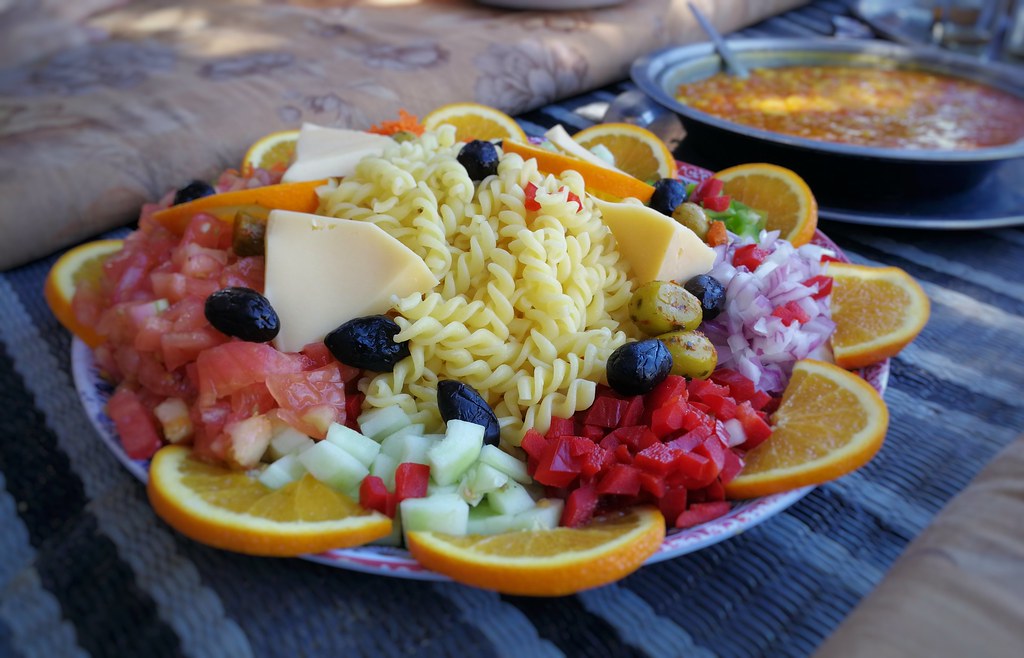
And, in front of us while we ate, these are the kind of views we were rewarded with.

After lunch we started our descent to the village of Tamssoult, 2250 metres above sea level.
The narrow track clings to the edge of the mountain, sometimes a little too precariously for comfort considering the number of loose rocks around. The spectacular views are both a help and a hindrance, providing a welcome distraction from the sight of your own feet but also the temptation to take your eyes of the track for a little while longer than it’s necessarily safe to do so.
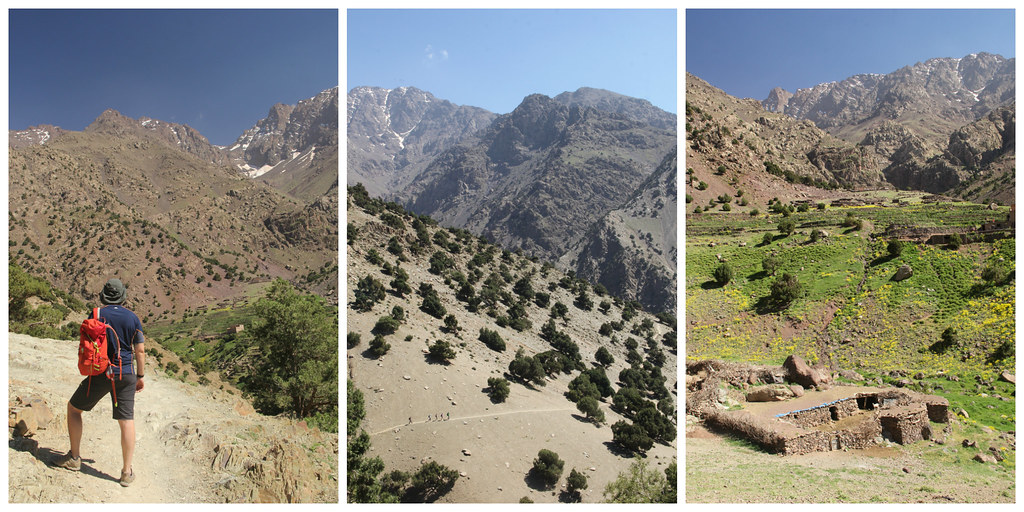
We made plenty of water and photo stops though, before beginning our approach down to the Azib Tamsoult mountain refuge – our home for the first night of our three-day Mount Toubkal trek.
We had a sunny terrace to sit out on and enjoy countless cups of sweet, warming mint tea, surrounded by fertile farmland, grazing mules and goats bleating as they made their way down the mountainside on the opposite side of the valley 🐐🐑
We also had hot (yes, properly hot – and powerful!) showers. Considering that I’d not anticipated having anything more than a bit of cold water to wash in, this was absolute bliss!
I’d advise you to take full advantage of the washing facilities here because those at the next refuge really have nothing on those at Azib Tamsoult!

Day 2 | Mount Toubkal Trek | Approx. 7 hours walking
Breakfast was served at 4:30 a.m on day two, for a 5 a.m departure. You may not feel like eating at this time of the morning, but trust me, you’ll need the fuel; the second day of this Mount Toubkal trek is a constant stream of relentless uphill stretches.
Be prepared for plenty of river crossings today as well. I haven’t got the best balance in the world so these aren’t my favourite, although I must admit that I was more concerned about the damage it would do to my DSLR if I fell in, rather than the actual concept of falling in. I was constantly taking my camera in and out of my backpack for the initial section of today’s climb.

However, it was lovely to witness the sun slowly rising up above the mountains.
To begin with, just the very tips of the mountain peaks were bathed in soft golden light, and then gradually more and more of the landscape would move from shadow into sunlight.

The majority of our climb out of the Azzadene Valley was along winding mule tracks that zig-zagged their way, seemingly endlessly, towards the Aguelzim Mountain Pass. I won’t deny it, in parts it was tough, and did require a lot of stubborn determination to make it through.
The best advice I can give you is to find your pace and to continue at that steady pace, stopping only briefly to catch your breath or to take a drink.
The photos unfortunately do not accurately reflect just how steep a climb this was and how thin the air was getting at over 3500 metres above sea level.

At the top, the views really were something else. We could literally see for miles, and it didn’t feel as though we could climb any further. And indeed we wouldn’t be on day two; we’d already made our 1400 metre ascent from 2250 metres to 3650 metres before we sat down to eat our lunch, and our legs knew about it!
From this point onwards, we once again followed a narrow ledge that clung to the edge of the mountain, craggy peaks rising up on either side of the valley.

By the time we stopped for lunch, it had been a very long time since breakfast and although we’d snacked on dried fruits and nuts along the way, we were all absolutely starving! That said, we still couldn’t finish the delicious feast our cooks had prepared for us.
Seeing as though our guide and our cooks and muleteers were all observing Ramadan (I honestly don’t know how they do these treks without eating or drinking a single thing from 4 a.m until 7:30 p.m every single day for a month!), the mules ended up eating everything we couldn’t manage. Ramadan is probably their favourite time of year 🙂

After lunch, we were on the home stretch to Les Mouflons mountain refuge , where we would spend our second night of the Mount Toubkal trek.
This refuge was a lot bigger and busier than Azib Tamsoult , and unless you fancy a luke-warm shower in the dark, I really wouldn’t bother with the bathrooms here. Every bed in our 16-bed dorm was taken before the evening arrived, and after realising that there was only one ladder down from the upper 4-bed bunk, I felt quite glad to have gotten there early and snagged one of the mattresses on the lower bunk.
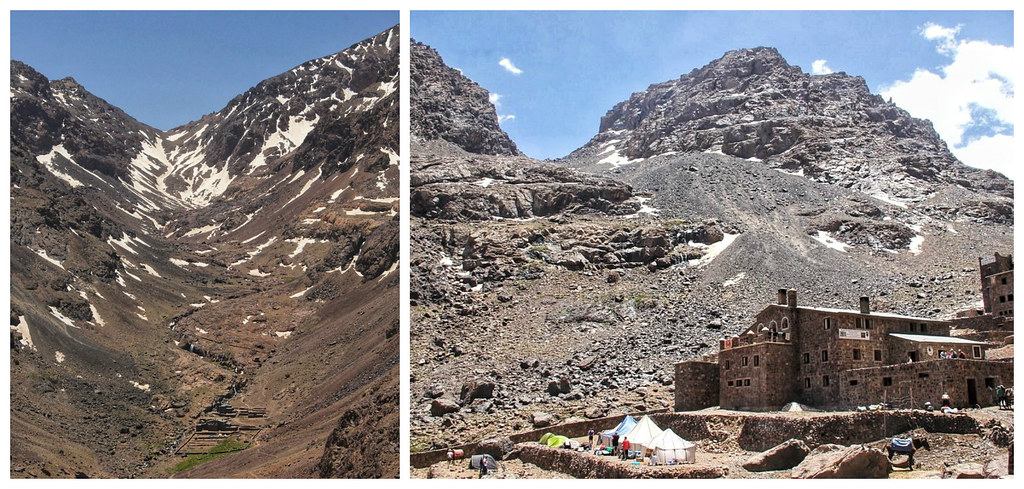
It’s also worth pointing out that electricity is only switched on in these mountain refuges at around 6 p.m, and there’s usually only one or two sockets in each dorm, so good luck managing to get any of your electronics charged. Pack a portable battery charger . Mine has been a life saver on countless occasions.
Seeing as though we’d be setting our alarms for 3 a.m the next day, in order to leave for our Mount Toubkal summit climb at 4 a.m, we ate dinner at around 6 p.m – giving our guide and cooks enough time to clear up after our meal before breaking their fast and eating their own.
Day 3 | Mount Toubkal Trek | Approx. 10 hours walking
I think I must have been the only one in our dorm who slept almost all the way through the night. Jayne had to shake me in order to wake me the next morning, I hadn’t even heard the alarm with my ear plugs in! Seriously, get yourself some ear plugs ; I never travel anywhere without mine.
We were all feeling a little apprehensive about this final part of the climb, partly because our guide had warned us that the ascent was much steeper than the day before, partly because we’d read online about how the upper section of the mountain is littered with scree slopes, and partly because we were worried about how much the altitude would affect us, having a further 1000 metres to climb, in order to reach the summit.
Our guide, Mohamed had strongly advised us that we use walking poles for this section, so we duly retrieved the ones we’d hired (that the mules had been looking after for us up until now), and set out in all our warmest layers and with our head torches illuminating our path ahead.
I actually prefer making steep climbs in the dark, because I think it helps not being able to see the route ahead. It was the same with the Trolltunga hike that I completed last year as part of a six-day budget adventure in Norway . When Jayne and I were making the final part of our descent from Trolltunga back towards the trailhead, we couldn’t believe it was the same section we’d walked up nine or ten hours beforehand. Yes, our legs were a lot more tired at the end of the hike than they were at the start, but that last downhill section was relentless, whereas at the start it hadn’t actually seemed that bad.
The initial section of our final Mount Toubkal climb consisted of scrambling over large boulders, which is rather difficult when you have a walking pole in each hand that you keep getting stuck between the rocks. I consistently had to throw my poles aside whilst I used my hands to pull myself up between the boulders and to steady myself as I walked. Half an hour in and I was getting ready to abandon them completely. Fortunately though, they were a lifesaver further up, so overall I’m glad I took Mohamed’s advice.
The final part of the climb to the summit of Mount Toubkal was certainly the most varied in terms of the kind of terrain you have to cross and the kind of challenges you’re presented with. For that reason, it required a lot more focus and concentration, which made it difficult to hike with my DSLR slung over my shoulder as I had done thus far. As a result, I don’t have many photos of this part of the climb. But here are a few mobile shots of a snowy section that was particularly treacherous – and freezing! Pack some gloves . I didn’t and had to borrow some from another more organised hiker.

I didn’t actually find day three of the climb as hard on the legs as day two had been. I did have to check my breathing a couple of times when I noticed myself getting short of breath, but on the whole I found it more of a slog than a battle.
And we were at the top in a period of time that felt like a lot less than the (just shy of) four hours it had taken us. My advice for an equally painless ascent is to think back to Aesop’s Fable, ‘The Tortoise and the Hare,’ where “slow and steady wins the race.” Successful high altitude climbs are all about being the tortoise: ascend slowly and keep a steady pace. You’ll likely be trekking with a group anyway, so you’ll need to stay relatively close to the guide or guides and other group members.
At the top, we couldn’t have asked for better conditions. The previous day it had reportedly been really windy and the day after rain was forecast. But on the morning we reached the top we had nothing but sunshine and blue skies.

My only complaint about about the summit was that we weren’t given long enough up there before making our descent. By the time I’d congratulated my fellow hikers, downed a ton of water, and waited patiently for my turn to pose in front of the heavily-graffitied pyramid-shaped summit marker, Mohamed was gesturing that it was time to leave. I would’ve appreciated maybe just 10-15 longer in order to snap a few more photos.
It was, after all, the only time I was going to find myself up there, 4167 metres above sea level, looking down upon the craggy peaks of the High Atlas Mountains.

The route down to the refuge seemed a lot longer than the route up had been (even though it actually took us just over half the amount of time), and I can’t quite believe that I managed to avoid falling over considering the amount of times I slid on the loose scree. Downhill is definitely not my friend!
We were all so ready for lunch at 11:30 – which was actually equivalent to eating lunch at 3:30 p.m, if we’d have woken up at a reasonable hour. After lunch we began our long (around 4 hours) walk back to Imlil. Although this route was a lot busier than the one we’d walked from Imlil, the scenery was absolutely stunning, and we could look back down the valley to the snow-capped peaks of the mountains we’d climbed earlier that day.

We kept ourselves entertained by singing (if you can call it that in my case) to each other. Mohamad sang a lovely traditional Berber song and I returned the favour by singing the theme tune to ‘Fraggle Rock’! Hey, what can I say? It’s upbeat, it’s short, and I know all the words to it 😉
Towards the end of the hike, my legs were so tired that even the soles of my feet were aching. I felt such an overwhelming sense of joy when we finally spotted Imlil in the distance.

But of course, we couldn’t rest just yet; we still had to make it back to the trekking office in order to pick up our transport back to Marrakech.
It had been an exhausting but exhilarating trek, and one I’m so glad I finally got to tick off my wish list.
Practical info
- We booked our trek through Aztat Treks , primarily due to their fantastic customer reviews, and we weren’t disappointed. We paid £190 ($241) per person, which included all accommodation, meals and transport to and from Marrakech, as well as a guide, cooks, mules and muleteers. As we didn’t want risk being part of a large group, we paid a premium for Mohamed to take solely the three of us. The cost of the trek comes down the more people there are booked on to it.
- We stayed in this lovely Airbnb in Marrakech before and after our trek. If you’ve not yet registered with Airbnb, you can get £25 of your first stay by following this link .
- We booked our return flights from Manchester to Marrakech via Skyscanner – a site I use religiously for researching and booking flights. I paid £85 for mine, but Jayne and Rob got theirs slightly cheaper, due to travelling out on a different date.
If you like this article, please share it on social media using the share buttons at the top of the post. And if you’d like to save it for reading later, why not pin to one of your Pinterest boards? Alternatively you can follow along on Facebook , Twitter , or Google+ or you can look me up on Instagram or Pinterest too!

Kiara Gallop
Hi I'm Kiara, the travel blogger and photographer behind Gallop Around The Globe. I can usually be found hiking up mountains, getting lost in the cobblestone streets of my favourite cities, making friends with a furry feline or two, photographing cacti, or grazing on olives and cheese.
You Might Also Like

Chefchaouen: The Blue Town in Morocco that’s a Delight to Photograph, Even in the Rain

Jardin Majorelle: One of the Most Colourful Gardens in Marrakech

Yes, You can See the Big 6 on a Budget! My $530 3-day Budget Safari with Red Chilli, Uganda
Nice Article Kiara!
Mount Toubkal is absolutely gorgeous, your photos are amazing. Quick question though, in terms of gear that you took, what would you say was an absolute must have for anyone else looking to do the same trek? Apart from the basics.
I did try to answer this in my article under the ‘What to Pack’ section. If I assume the basics to be hiking boots and clothing, I would definitely suggest that a head torch, warm layer and ear plugs/sleep mask are definite musts on top.
Thank you 🙂 and I absolutely was! I woke up the next morning and could feel every muscle in my thighs. It hurt to bend down and walk downstairs, and even walking wasn’t completely pain-free!
Leave a Reply Cancel Reply
Save my name, email, and website in this browser for the next time I comment.
By using this form you agree with the storage and handling of your data by this website. *
Yes please I'd like your new posts delivered straight to my inbox!

This site uses Akismet to reduce spam. Learn how your comment data is processed .
Alternative Tallinn (Beyond the Old Town): Exploring Kalamaja, Kadriorg and Rotermanni
Albania travel tips: 10 things to know before travelling to albania.

Find me on Facebook
Subscribe to my posts.
Email address:

All rights reserved - Photography cannot be used without my permission
The Complete Guide to Climbing Morocco's Mount Toubkal
:max_bytes(150000):strip_icc():format(webp)/Becker1-5b734a56c9e77c0025caddbd.jpg)
Getty Images
Mount Toubkal
Standing 13,671 feet (4,167 meters) in height, Morocco's Mount Toubkal holds the distinction of being the tallest mountain in Northern Africa. Located in the heart of the Atlas Mountains, Toubkal is a popular trekking peak, drawing thousands of visitors on an annual basis. And while it may not be as tall as its African sibling Mt. Kilimanjaro , it still holds a significant challenge for hikers looking to reach its summit.
If you're planning on visiting Morocco in the near future and are looking for an adventurous outing, a Toubkal climb may be exactly what you're looking for. But before you set out for the High Atlas, here is everything you should know.
Difficulty of the Climb
While Toubkal is mostly a non-technical climb –– meaning it doesn't require ropes, safety harnesses, or crampons –– it still offers a moderate challenge for experienced hikers . The mountain's height can make a trek to the summit a difficult one for those who aren't use to the thin air that comes with altitude or aren't in good physical condition . That said, this is an approachable climb for anyone who has a good sense of adventure, doesn't mind roughing it a bit, and enjoys a walk along an alpine trail.
What Toubkal lacks in altitude however, it more than makes up for with prominence. The mountain ranks 36th in the world in terms of total prominence, which is the distance from its base to the summit. In this case, Toubkal rises 12,320 feet (3755 meters) above the surrounding landscape, and climbers will have to hike up that entire distance to reach the summit. That's a lot of vertical gain and loss throughout the hike.
As noted, Toubkal is mostly a non-technical climb, though loose scree on the upper slopes of the peak can make trekking just below the summit a challenge. During the summer months, hikers can scramble up this rock and debris without too much trouble, but in the winter, ice and snow can add an additional layer of difficulty. During those times of the year, it may be necessary to use an ice axe or crampons to make your way to the top.
Safety Tips
Much like climbing Kilimanjaro, a trek to the summit of Toubkal is very safe. The trails are clearly marked and very easy to follow. For the most part, this is simply a challenging hike to the summit of a tall mountain with limited exposure to any kind of real danger. Serious injuries to climbers are a rarity, as are fatalities.
That said, there are certain inherent risks that come with hiking in high alpine environments, including the chance of contracting altitude sickness. This can lead to headaches, upset stomachs, and cause nausea, amongst other symptoms. Altitude sickness can also make it difficult to sleep or maintain an appetite as well. In severe cases, it can even lead to severe illness or death.
Fortunately, Toubkal's relatively low altitude means that these issues aren't a concern for most trekkers, but it is important to be aware of them before setting out.
Hiring a Guide
You do not need to hire a guide to climb Toubkal. If you are an experienced backpacker and feel comfortable in the wilderness, you can choose to go it completely alone, and many trekkers do just that.
Hiring a guide does bring some nice benefits however, including connecting with like-minded travelers on the trail and having someone to show you the best way to get to the summit. A guided trek also brings a higher level of safety too, as you'll have someone who is familiar with the mountain watching over you and checking on your health and wellbeing along the way.
If you're looking to join a guided trek, there are a number of good ones that can be found online, and we'll share some of our favorites below. But if you decide to wait until you're in Morocco to hire someone, that is fine too. You'll find plenty of local operators to book with in Marrakech and Casablanca , as well Imlil, a village located close to the mountain itself.
How Long It Takes to Climb the Mountain
One of the most common questions that hikers have is "how long does it take to hike to the summit of the mountain?" The actual number of days varies depending on whether you hire a guide or choose to go it alone, as well as your own physical conditioning.
Most guided Toubkal treks spend three days on the mountain, with the bulk of the climbing done on the first two days, with the descent coming on the third and final day. Some tour operators may add an extra day or two to help with acclimatization or for bagging smaller peaks nearby.
If you're making a self-guided trek up Toubkal, you can choose to go at whatever pace you like, spending as few as two days or many more. However, chances are if you feel comfortable enough going it alone, you'll probably be able to complete the climb in two to three days as well.
The Best Time to Go
While it is possible to climb Mount Toubkal at any time of the year, there are certain months that are better than others. In the spring, April and May provide cool, comfortable temperatures, with little rain or snowfall, and in the autumn, September and October tend to mirror those conditions.
During the summer months (June, July, and August) temperatures can be quite hot, making it a difficult time to be on the mountain. You'll still find plenty of trekkers making their way up Toubkal's slopes, but the warm conditions bring an added level of challenge.
In the winter, the mountain tends to be less crowded, but conditions are more challenging too. Snow and ice can make sections of the trail difficult to walk on, and it is not uncommon to use crampons or ice axes when approaching the summit. Less experienced climbers and hikers are encouraged to avoid December, January, and February, as high winds, cold temperatures, and unexpected snowstorms can increase the level of danger.
If you're looking to avoid the crowds, the shoulder seasons of late May/early June and late August/early September are a good time to go. In both cases, the weather tends to be manageable, but trekkers haven't necessarily started showing up in large numbers yet.
What to Expect on the Trail
As already mentioned, most Toubkal trekking itineraries are usually about three days in length. They tend to start in the village of Imlil and head up into the mountains from there. The early stages of the trek are easily managed, with only a slight, gradual rise in altitude. The day 1 route passes through another village or two along the way, and it is not uncommon to encounter vendors along the path who are selling food and drinks too. The trail is very easy to follow and offers little in the way of challenge.
After about four or five hours of hiking you'll reach the CAF Refuge, your campsite for the nights spent on the mountain. The Refuge can be crowded depending on how many other hikers are on Toubkal, but generally speaking, it is a relaxing place to get some sleep prior to summit day.
The next morning you'll launch your attempt on the summit at about sunrise. The second day brings more challenging trekking with steeper trails and rock-filled scree fields. It takes about three to four hours to reach the top, which is marked with a colorful, pointed tripod. On a clear day, the views from the peak can be very nice, but oftentimes, high winds can blow dust and sand into the air, obscuring even other mountains in the Atlas Range.
After spending some time at the summit, you'll head back down. The descent tends to be faster, requiring only two or three hours, but tired legs can make the hike a surprisingly difficult one. Loose scree can make for precarious footing at times, but trekking poles can prove invaluable for keeping your balance.
Once back at the Refuge, some trekking groups will elect to continue back to Imlil, completing the climb in just two days. Others will spend another night at the campsite before proceeding down the following day, which helps to break up the trek to a degree.
Gear to Pack for a Toubkal Trek
Traditional hiking gear and overnight camping equipment are a necessity on any Toubkal trek. You'll want a good pair of sturdy and comfortable hiking boots for instance, as well as comfortable hiking clothes that includes trekking pants and a breathable base layer.
Other recommended items include the following:
- Wind and waterproof jacket
- Trekking poles
- Sleeping bag and sleeping pad
- Backpack to carry all of your gear
- Tent (if trekking independently)
- Hat and sunglasses
- Light insulating layer such as a fleece pullover
- Light gloves
- Basic toiletries (toothpaste, chapstick, etc.)
If you're climbing during the winter, you'll also want warmer gear, including winter boots , thick socks , a down jacket , and a warmer sleeping bag too.
Climbing Toubkal With a Trekking Company
There are literally dozens of local trekking companies and guides that you can hire in Morocco that lead hikers up the mountain on a regular basis. Most are quite good at their job and take pride in what they do. But if you'd prefer to book a guide before you go, there are also some outstanding adventure travel companies that can handle all of the details for you. Here are a few that we recommend.
Intrepid Travel (7 Days) Intrepid Travel's Toubkal Trek is a bit longer than some others, but that's because the trip includes a few days to ascend North Africa's highest peak and extra time in Marrakech. This trip includes a stay in a traditional Berber home and an opportunity to explore Marrakech more fully too.
Flash Pack (5 Days) Based out of the U.K., Flash Pack specializes in organizing small group adventures for solo travelers in their 30s and 40s. The company's Toubkal trek is just five days in length, reasonably priced, and includes a day of unwinding at a luxury lodge in Marrakech after the climb.
Exodus Travel (8 Days) A leader in the adventure travel space for decades, Exodus Travel offers an eight-day trek up Toubkal that includes some pre-climb hiking through Moroccan villages, time to acclimatize prior to summit day, and bonus time in Marrakech.
KE Adventure Travel (Varies) KE Adventure Travel boasts seven different options for climbing Toubkal, including one itinerary specifically designed for teenage hikers and another for road cyclers . For the truly adventurous, the company even offers a winter ascent of the mountain, delivering a true mountaineering experience.
For further options for trekking Toubkal search online for other itineraries and hiking companies.
The Best Countries in the World for Adventurous Travelers
The Highest Mountains in Peru
The Top 15 Things to See and Do in Morocco
How to Choose and Prepare for a Hiking Trip
The World's Highest Places and Attractions That You Can Visit
5 Great Winter Hikes to Take in Vermont
Smith Rock State Park: The Complete Guide
Five Amazing Hiking Routes Among the High Mountains of the Himalayas
The Different Types of Adventure Travel
Want to Take Up Mountaineering? Get Started With These 8 Mountains
10 Best Mountain Treks in Africa
Extreme Adventure Travel Vacations
The 10 Best Hiking Trails Found Inside America's National Parks
Mohican State Park: The Complete Guide
13 Amazing Trips to Take Before You Turn 40
Hanging Rock State Park: The Complete Guide
- Active Adventures
- Beach Escapes
- Bucket-List
- Escape The Crowds
- For First-Timers
- Group Bookings
- Short stays
- Wildlife Trips
- Winter Getaways
- Safari Adventures
- Ambassador Adventures
Trip duration

New and trending
- Our Newest Adventures
- Bestselling Adventures
- Iconic Flash Pack Experiences
- Coming Soon
- Meet Your Travel Experts
- Meet your Pack Leaders
- Don’t be a tourist. Be a Flashpacker.
- The Flash Pack Foundation
How it works
- Payments, deposits & instalments
- Travel Extras
- About Solo Travel
- Careers at Flash Pack
- Partner as a Travel Agent
- Trip terms and conditions
- Safety with Flash Pack
- Flash Pack’s privacy policy
Latest deals
- Your latest travel offers
- Your last chance to book
Insider trips
Sorry no insider trips are available right now, check back soon.
- Feed your inspiration with all the latest stories from our content hub.
Relationships
- Career Tips
Top stories

Friendship Tips

- Travel Tips

- See all articles
Favourite Trips
Destinations
- Climbing Mount Toubkal: Everything you need to know about this amazing trek

The Flash Pack team 21st Sep 2023 8 min read
Thinking of climbing Mount Toubkal? Climbers have described it as staring down at an unforgiving cliff face, clouds forming and birds circling below. And for those those who successfully reach its summit, they speak of standing tall despite exhaustion and the kind of hysteric elation that topples you to the ground. All reflect on inhaling some of the world’s purest air and taking in the epic surroundings.
As the highest peak in Morocco ’s Atlas Mountains , Mount Toubkal may be smaller than Asia’s giants, but it’s the loftiest in North Africa. At 4,167m, it’s taller than the majority of peaks in the Americas, Europe and Oceania. Incredibly, and most importantly, you don’t have to be an expert to reach the summit, meaning the opportunity is open to anyone.
Here’s the lowdown on the majestic Mount Toubkal, from where to find it to how to arrange a climb.
Where is Mount Toubkal?

Mount Toubkal is located in southwestern Morocco , just over two hours (50 miles) south of the city of Marrakesh. It’s easily accessible from the village of Imlil, not far from the mountain, where qualified guides and porters can be hired. Climbers can enjoy views of the surrounding Atlas Mountains, Berber villages and, on a clear day, the Sahara Desert.
How high is Mount Toubkal?

Mount Toubkal is the highest of the Atlas Mountains, reaching a towering 4,167m. While it’s the highest peak in Morocco, and across North Africa, it’s not a particularly challenging mountain and those who are reasonably physically fit shouldn’t have any issues hiking to the peak. Mount Toubkal offers a moderate climb that is simple to navigate, with spectacular views for a truly memorable experience without the need for any technical climbing ability.
How long does it take to climb Mount Toubkal?

If you factor in the journey to Mount Toubkal from Marrakech , climbers can expect to put aside at least two days for their trek. In the winter, weather conditions make the climb more challenging, so the journey can take a little longer. Other factors include how long you choose to rest and acclimatise at Base Camp, as well as the particular route you take up the mountain.
It takes around an hour and a half to drive from Marrakech to the start of the Toubkal mountain trail at Imlil. From here, you’ll trek uphill for around 6 hours before reaching Base Camp, at which point you’ll have climbed an elevation of around 1,500m. After acclimatising and refuelling, usually overnight, it’s time to head for the summit.
The trek to the summit takes 3–4 hours, after which you’ll want to spend ample time taking in the magnificent views and enjoying a well earned rest. With the help of gravity and the downhill trajectory, coming back down to Base Camp takes a little less time, around 2–3 hours. After recuperating at the refuge, it takes around 4 hours to retrace your steps to Imlil, where your transport will take you back to Marrakech.
Our guide to climbing Mount Toubkal

While climbing Toubkal isn’t the same as the challenge of Everest or K2, some preparation is advisable in terms of health and fitness. Here are some of the important things you need to know as you prepare for a Toubkal Mountain climb.
Physical preparation
For the most part, climbing Mount Toubkal can be described as a trek or hike, with just a few spots where you might need to scramble. It’s not a particularly technical or challenging ascent but you will want to be in good physical condition as you’ll be walking uphill for several hours across multiple days.
In the months leading up to your Mt Toubkal hike, make sure you eat healthy, nutritious meals and head out on regular hikes, preferably with lots of uphill walking.
During the warmer months, you likely won’t need any technical equipment for climbing Mount Toubkal. However, if you’ll be climbing Toubkal in the winter, it’s advisable to bring a few key items such as ice picks, crampons and a fixed rope to prepare for icy conditions.
Otherwise, you should be able to complete your Mount Toubkal trek with ordinary hiking and camping gear, including a warm jacket, hiking socks and warn in boots, waterproofs, a first aid kit, water bottle, toiletries and high energy snacks . While there are two refuges at Base Camp, you can also camp outside if the weather is good in pre-erected tents with sleeping mats provided.
Mental preparation
While the climb itself isn’t too challenging, it’s important to be mentally ready for what’s ahead. Looking at Mount Toubkal as something that could beat you won’t help. There’s little chance anyone will give up, but understand that some do and that’s fine – it’s usually as a result of mental, as much as physical, surrender. Preparing mentally for what you’re about to experience – a challenging gruelling trek in incredible surroundings – can help you to put your best foot forward.

Climb with a group
It is possible to hire a private sherpa or travel in a group of like-minded comrades. While solo travel offers a true sense of adventure, nothing quite beats the feeling of accomplishment that comes with completing a trek like Mount Toubkal as part of a team. After all, a problem shared is a problem halved. A united group encourages each other and is patient, understanding some will find it harder than others. Weights on shoulders, aches in legs and weary spirits can be easily be lifted as a team.
Be prepared to dig deep
With so much to see and do, and challenging terrain to cover, you’ll need to dig deep. It’s possible to start your journey slowly with a full day hiking through some of Morocco’s most unique rural scenes. There’s the pretty village of Aroumd, hanging off the hillside, or Sidi Chamharouch, an isolated site of religious pilgrimage by a rocky mountain river.
On summit day, you’ll most likely be waking at the crack of dawn with a long trek up the mountainous terrain. You’ll stare upwards at a near-vertical incline, snowbound in winter, terrain slipping away beneath shoes during warmer months. Then , after you’ve made it to the top, you’ll still have to come back down in far fewer hours.
Usually, after conquering Mount Toubkal, you’ll return by vehicle to Marrakech on the same day. However, for those that like an additional challenge, it is also possible to opt to stop for a night at a cosy mountain gite in the Berber village of Imlil after an additional eight hours trek.
Remember to enjoy yourself
Don’t focus too hard on putting one foot in front of the other; remember that a hike on Mount Toubkal is an exciting adventure packed with incredible views, historic sites and a variety of plant and animal life. Whether you’re climbing with friends or as part of a group of solo travellers, there’s plenty of fun and enjoyment to be had along the way.
And remember, your guide leading the way isn’t simply there for directions as they have a wealth of knowledge, so do ask questions and learn along the route.
Why climb Mount Toubkal?

Put simply, climbing Mount Toubkal is an amazing experience and you’ll see incredible things along the various routes, but be prepared to work a little for them, not least because of the altitude. Be accepting if you get a little emotional, too. There’s a hugely moving, contemplative atmosphere at the top of a mountain. It’s a place where reflection comes easy because you’ve taken on, and conquered, a demanding challenge, reaching the wooden pyramid marking the very highest point.
With unparalleled views, unspoilt serenity and indescribable elation, nothing beats climbing Mount Toubkal. So, what are you waiting for…
Flash Pack is a global travel company that specialises in small group adventures for like-minded people aged 30-50. Intrigued? Join one of our Morocco adventures.
Got a story or adventure that could inspire a solo traveller like you? Tag @flashpack on social or email [email protected] to be featured.
Images: Unsplash
After breaking my back, I learned to live again on a group trip to Costa Rica
By Rick Prokupek
FLASH PACK STORIES
Your latest travel inspiration

Local Food Guides
Inside the wonderful world of Brazilian cuisine with chef Manu Buffara
The Brazilian chef who’s reshaping our connection to food with creative, community-led flavours.
Anna Brech 25th April 2024 8 min read

The magic of work friendships: Lauren and Emma
These two forged a deep workplace connection – despite living 3,000 miles apart.
The Flash Pack team 17th April 2024 8 min read

Find your people: why friendship could be key to better mental health
Strong, loyal friendships are a source of lifetime happiness and health – and they become more important as we age. Here’s why.
Anna Brech 4th April 2024 8 min read

Destination Guides
The ultimate solo travel guide to Chile: Everything you need to know
Want to travel solo in Chile? Discover everything about heading to Chile as a solo traveller including top destinations and safety tips.
Amy Swales 4th April 2024 8 min read
Subscribe to our newsletter
Sign up to our newsletter.
Hear about our new adventures before anyone else
Hear about our new adventures before anyone else.
Be the first to hear about exclusive Flash Pack offers.
Access exciting competitions.
Receive weekly inspiration and travel stories from solos just like you.
You are browsing our US website.
Please choose your current location below:
You are browsing our UK website.

We're sorry, your browser does not support some of the features on this website.
Why not try upgrading your browser. Browse Happy
Ian Taylor Trekking PO BOX 5973 Vail Colorado 81658, USA
+1 785 9179436 +353 1 2544011 Email: [email protected]

Latest Blog Posts
Aconcagua: the normal route verses polish traverse route, summit night on aconcagua, 20 things you need to know before climbing kilimanjaro, leave a testimonial.
- [email protected]
- +1 785 9179436
- +353 1 2544011
- +44 20 8123 2876
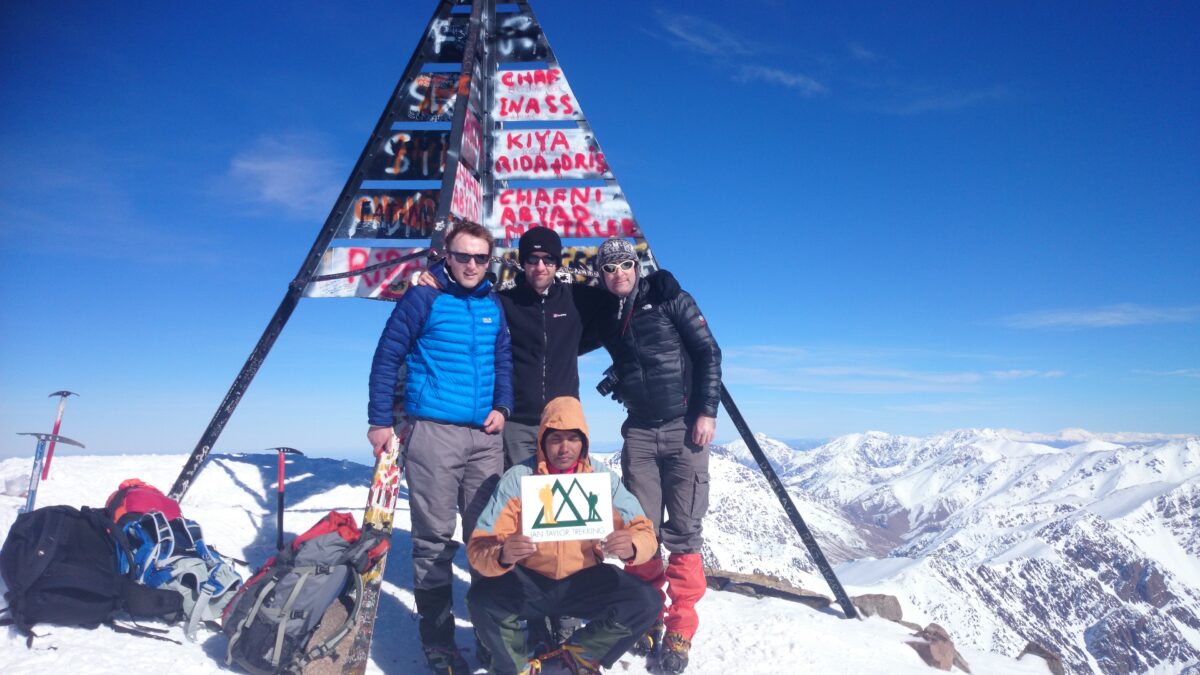
Climb Mount Toubkal: An Unforgettable Adventure in Morocco
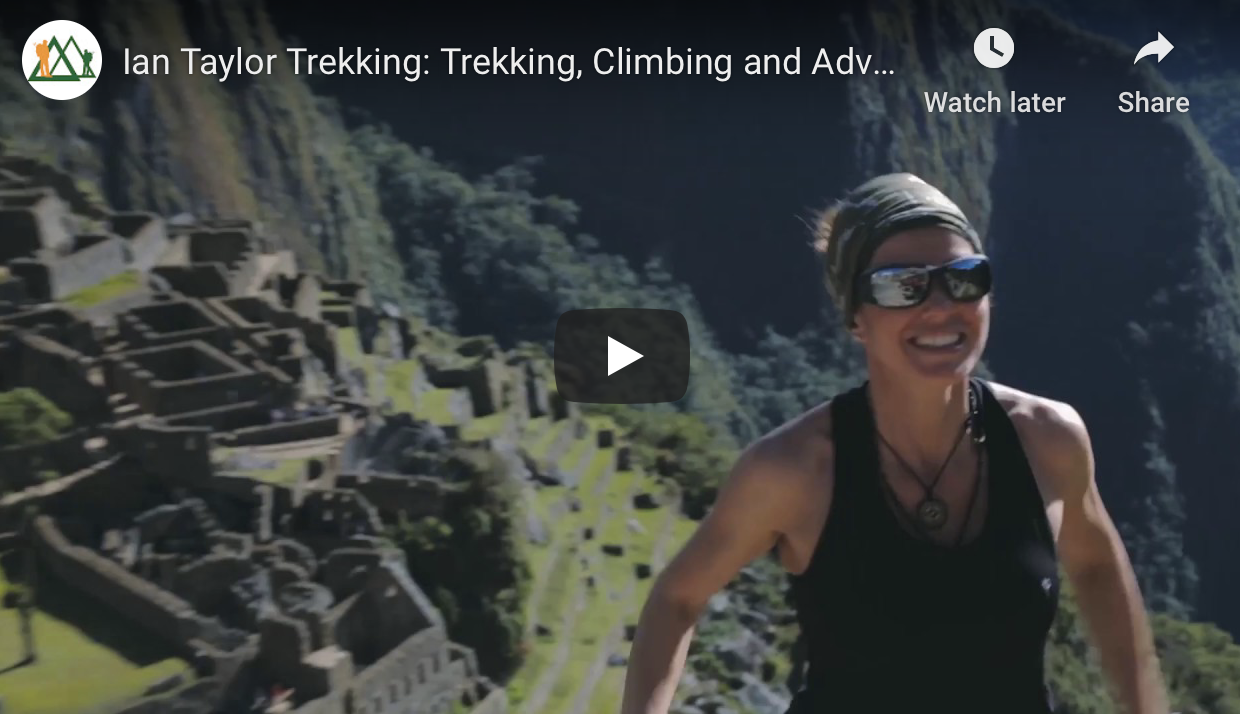
Tips and Advice
Do you want to climb in Winter or summer. You need to decide as they will be two very different experiences and require different gear. In summer there is minimal or no snow so trekking boots would be required. In winter, mountaineering boots, crampons and some technical equipment would be needed.
2). Acclimatization
Check out our itinerary we have added in a spare day for an additional summit attempt. This is important to give you the best chance at success. here is one thing that needs your highest consideration and that is the itinerary and the approach to high altitude. We always have additional acclimatization built into all our itineraries.
3). Training for Toubkal
Toubkal does require a descent level of physical conditioning, more so if you are thinking of climbing in winter. We recommend very specific training and happy to share our advice on how best to prepare.
4). Bringing the Right Clothing
Make sure you have all items on the gear list and know how to use them. Having lightweight clothing and equipment will make a difference in how much weight you are carrying. Also, practice using your gear and equipment and make sure it fits comfortably. Having lightweight equipment and clothing means you will have to carry less weight up and down the mountain.
5). Understanding Altitude Sickness
If you have been on a number of altitude expeditions with us you will know all about altitude related issues and problems. Read and understand the principles of acclimatization and altitude illness. By picking an itinerary with more acclimatization, you give yourself a safer journey into extreme altitude. You also need an itinerary with built in contingency days for bad weather especially if you decide to climb in winter months.
6). Consider Diamox
If you are taking prescription drugs, make sure you bring a sufficient supply to last more than the length of your trip. We highly recommend taking Diamox for the duration of the trip. Our high altitude specialist doctor recommends 125mg in the morning and 125mg in the afternoon. Make sure your Diamox is in tablet form. You will also need to bring a number of antibiotics. There are alternatives to taking Diamox and you most certainly should bring ibuprofen on this trip. Ibuprofen will aid with sleeping at high altitude.
7). Hydration
One of the most important tips we will give you is to make hydration a priority. Hydration at high altitude is extremely important. When you wake up you need to drink 1 liter of water before breakfast. You need to drink 2 liters before lunch and another 1 to 2 liters in the early afternoon. Using a water bladder system is ideal because you can then drip feed water into your body on a regular basis. This will be used on the trek in and lower on the mountain, however during winter it can not be used as it will freeze. Forcing water in, is not a good idea as you will just pee it out. You will need hyper hydration sachets, multi-vitamins and electrolytes while on this Toubkal trip.
Preparation and Training
Train with weight on your back.
Essentially, you need to be able to walk 10 miles a day in your training on a multi day basis. Also, your training always needs to be done with a weighted backpack as you built up to the trek. On the trail you will need to have a proper backpack with a good waist strap, and you will carry 6kg+/ 12lbs+ in that pack. In your training, you will want to be comfortable with carrying double that amount of weight. We can help you understand this trip so you can come fully prepared.
Strength and Endurance Training is the Most Important
You are entering the realm of high altitude, with 30% less oxygen than you would have at sea level running through your blood stream and muscles. You have to walk for 5 days to reach the summit at 4,167m / 13,671 feet.
You need your muscles and body to cover distances, at high altitude, then you need to train and condition your muscles prior to arriving in Morocco. You need to be comfortable on steep terrain up and down and have the physical conditioning, or muscle memory, by walking up and down hills, with a weighted pack, prior to your trek.
You Should be Training 4 Days a Week
When I am training for a trek, I will go out once a week, walking 2/3 hours up and down hills, with a weighted pack. I will build the weight in my backpack as I go, from 5kg to 10kg (11lbs to 22lbs) over a period of time usually 2 to 3 months before my treks. In addition to that, I add in 3 or 4 other training sessions per week, depending on time available. These will range from 6k to 10k jogs, weight training, walking up hill with weight on a stair master, biking up-hills for long distances or hiking. All training sessions will be done with a weighted backpack or else focused on strength/endurance building.
The key is getting active and trying to get as much hill work in as possible. I hike at a slow and steady pace, trying to drink a liter of water for each hour of exercise. Let us help you prepare as we know most of you are coming from sea level with limited or no access to hills to train on. If you don’t have hills, then you need to use a stair master for the best results.
Not everyone will have access to hills, but this is the best way to train your body and legs for down hill hiking. Depending on your chosen adventure you do need to assess the level of downhill. We have elevation gains available for all of our key trips. I encourage you to review the daily elevation drops and what type of terrain you will be walking on.
For example, on our Inca trail treks you will be drop 700m/ 2,296 feet to 1,000m/ 3,280 feet on different days all on steep rocky stairs. On Kilimanjaro you will drop 2,800m/ 9,186 feet in one day on scree and rock and this is very challenging on your legs and joints.
You have just walked for days on end you have reached your goal but not you have to retrace your steps, often in a quicker time frame. Hiking downhill will take its toll on your joints. Fore sure, the downhill hike will take more wear and tear on your joints and muscles than the uphill.
You do need to use effective training techniques to minimize the impact on your body. Descending using good technique means that you move faster and feel lighter. Remember, 80% of accidents happen on the way down.
Keeping Knees Healthy
We live in Eagle-vail Colorado with amazing access to altitude and a wide range of mountain terrain to train on. In Colorado we can train all year round on hilly terrain preparing for Kilimanjaro, Himalayan trekking and mountaineering trips. I know most of you are joining our trips from sea level and with minimal access to hill training. I encourage you to get out to Colorado doing some multi-day hiking in preparation for your chosen adventure.
If you do not have access to hills and mountains, you must figure out other ways to prepare your knee joints to handle downhill stress. From a knee perspective, downhill hiking means eccentric loading and typically thousands of repetitions of it. Eccentric loading (the lengthening phase of a contraction) is especially challenging to what is called the patellofemoral joint of the knee. This is where the knee cap, meets the femur. Inadequate strength, poor mechanics and lack of exposure to this type of loading can turn downhill forces into injury producing stress. Prior to your trekking trip you need to start implementing sport specific training into our general preparedness programming.
Hiking Uphill and Downhill
Hiking uphill is all concentric muscle action (muscle active while shortening) at the knee joint without any eccentric loading (loading while muscle is lengthening). Concentric only exercises tend to cause less mechanical stress, load and pain to joints and tendons than do exercises that have eccentric phases. What goes up must come down.
You must prepare our body and specifically your knees to handle downhill hiking. Depending on the trip, you really need 6 months of some sport specific training into our general preparedness programming.
The strength movements below are similar but slightly different in specific ways. We purposely only hit each one once per week because too much volume of these exercises could quickly lead to an over training injury, so be careful. I would recommend adding in additional hip flexor and quadriceps mobility work at the end of your training sessions as well to maintain good length tension relationships and to protect your spine.
The Point of These Exercises
Increase vertical loading volume of the knees with a sight posterior to anterior (back to front) force vector. Get exposed and accustomed to decelerating the vertical and forward forces using primarily a knee strategy. Transition from doing most lunges and squats with a 3 points of contact foot position to a more heel elevated position where we contact and press through the forefoot.
The 3 points of contact foot position is the most stable position for the foot and encourages a balance of hip and thigh musculature – great for general preparedness training. Transitioning to a heels elevated position where the forces are applied through the forefoot places most of the stress on the quadriceps and knees – optimal for downhill hiking training.
Exercises for Downhill Hiking
You should consider adding these movements into your weekly training 2 times per week. Add 3-5 sets of 10-15 repetitions (per leg)
1). Heels Elevated Goblet Squat 2). Forward Alternating Lunge with Farmers Carry Loading 3). Forward Alternating Drop from Box Lunges 4). Banded Posterior to Anterior (PA) Forward Lunges
Carrying Weight
One of the best ways of mitigating the risk of musculoskeletal issues is by carrying a light pack. Then build up the weight you carry over time. An overly heavy backpack is not recommended in the early stages of your training.
Extract its biggest toll on your body during steep and/or long downhill sections, so a hiker should always aim to travel as lightly as the dictates of their skillset and the environment into which they are venturing allow.
If you are carrying weight on longer hike you should slowly build up the weight you carry. You should also consider carry water uphill and dump as much water/ weight as possible for your downhill. Always assess the weight you are carrying for each hike and always build up slowly over time. You do not want to get injured.
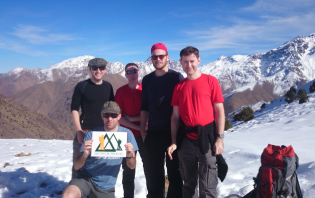
Daily Distances
Day 1 arrive in marrakech international airport.
Arrive to the Menara Airport of Marrakech. Our guide and driver will meet you for the short transfer to your 4* hotel. After a welcome cup of fresh mint tea and Moroccan pastries, the guide will do a briefing with you to talk through the days to follow as well as to go over some local rules/traditions to follow while you are in Morocco. If time allows, you can explore the old parts of the Medina such as Bahia palace, Majorelle Garden, Koutoubia Mosque and More.
Day 2 Drive from Marrakech to Imlil 1,747m/ 5,731 feet
We will leave the busy city behind us this morning and drive south towards the craggy peaks and plunging valleys of the Toubkal Massif. Crossing the Haouz Plain, we pass through the tiny town of Asni, from where our road begins to climb towards the foothills of the Massif. Below us the valley of the Oued Gheraya stretches out into the distance and small villages cling to the sides of the steep hills as we meander. We should arrive to Imlil by midday, and after lunch you will have time to walk into one of the surrounding passes or Villages as a warmup for the next day. Overnight in a guesthouse/Riad, breakfast, lunch and dinner included. 2 to 3 hours walking today. There is an optional cooking class that you can join in the afternoon with our Berber chef – free of Charge
Day 3 Imlil – The Toubkal Refuge (Base camp)
Today we will start our trek, heading along the Mizane Valley, first towards the village of Aremd and then onto the shrine of Sidi Chamarouch. Built on a moraine spur overlooking the valley floor, Aremd is the largest village in the valley and provides an interesting mix of traditional terraced farming, gites and streets that seem to be permanently gridlocked by goats and cattle. For generations, the local Berber villagers have worked these lands, producing corn, potatoes, and walnuts in the harsh landscape. Continuing east and crossing the flood plain, our route takes us along mule tracks and up into the high rocky cliffs above the valley. Crossing the river, we eventually come to the pastoral shrine of Sidi Chamarouch, which attracts tourists and pilgrims alike (although only Muslims are allowed to cross the stone bridge to visit the shrine itself). The village sits beside a small waterfall, a jumbled cluster of houses that seem to melt together into an anarchic mass. From here the trail continues to climb steadily, snaking and zigzagging its way up to the snowline, and the Toukbal Refuge at 3,200m/ 10,498 feet, our stop for the night. Approx 5hrs hiking and 11km/6.8mi. Breakfast, lunch and dinner are included today.
Day 4 Acclimatization Day
Today is an additional acclimatization day built into the itinerary. We will take the trail, which traverses uphill, to the famous Tizi Ouanoumss Pass at 3,600m/ 11,811 feet. From here, you will be rewarded with stunning views, overlooking the lush Tifnout Valley and Ifni Lake at 2,500m/ 8,202 feet. After enjoying the surroundings, we will return back to Base Camp. The total distance today is 8km/4.9mi. Breakfast, lunch and dinner are included today.
Day 5 Summit Day - Jebel Toubkal 4165m/ 13,665 feet
Early in the morning, we will make our attempt to climb the summit of Jebel Toukbal, the highest peak in Northern Africa. Our route takes us up the south cirque, crossing the stream above the refuge and then heading across one of the mountains numerous scree fields, where we will have to negotiate a seemingly endless carpet of boulders and rocks. The walking is relatively straightforward, but the scree and the altitude will make the going quite difficult in parts, however, the views along the way make the journey more than worthwhile. Cresting the ridgeline, we find ourselves on the plateau, from where it is a short walk to the summit and the vistas out across the surrounding landscape are breathtaking. From here there are unrestricted views in every direction, from the Marrakesh Plain to the High Atlas in the north and as far south as the Anti-Atlas and the Sahara. After taking our time enjoying the views and our accomplishment, we will descend back to the Refuge and stay overnight. Today will be a challenging day with 8k/4.9mi of steep and challenging terrain. Breakfast, lunch and dinner are included today.
Day 6 Toubkal Basecamp – Imlil –Marrakech
After Breakfast at the Basecamp, a pleasant descent takes us from an arid mountain landscape to the irrigated valleys below. We will follow the trail through Sidi Chamharouch (marabout) to the beautiful, cultivated area of Aremd 1,900m/ 6,233 feet before we reach Imlil. This will be another 11km/6.8mi day for our final hike! From here, we will be picked up in private transport for the one-and-a-half-hour drive back to Marrakech and our hotel for the night. We will have a team dinner tonight in the city to celebrate our success! Breakfast, lunch and dinner are included today.
Day 7 Fly Home
Today is the final day of the itinerary and we will pick you up at the hotel and transfer you back to the airport for your onward journey! Breakfast included today.
A bit more about Climb Mount Toubkal
This trek is a truly unique and exhilarating way to experience the Atlas Mountains as well the fascinating Moroccan culture. Climbing Toubkal in Morocco is a great introduction to high altitude mountaineering. The climb to the summit of Mt Toubkal is challenging, but requires no mountaineering experience and the panoramic view of the High Atlas Mountains makes the hard work worthwhile! The trek passes through impressive landscapes on well-defined paths encompassing breathtaking scenery. As we climb higher, the paths become steeper and rugged in places, however the gain in altitude awards dramatic views towards Marrakesh. Row after row of sharp granite peaks in the Atlas Range. This rewarding trek passes through remote villages and terraced fields offering us an insight to the life of the hardy and friendly Berber people. Climbing in the Atlas Mountains in Morocco is no longer the domain of professional climbers and a few amateurs. Times have changed and now there are treks for all times of year and all levels of fitness. There are treks to test the fittest athletes and other where you can have your bags carried, arrive to find your lunch laid out for you and sleep in luxury. The High Atlas, the greatest mountain range of North Africa, is perhaps the most beautiful and intriguing part of Morocco. It has retained a remoteness which until recent decades was virtually complete, and contains villages where the way of life has changed little for centuries.
Be Aware of the Potential Risks
The high altitude and remoteness make the mountains a huge commitment when undertaking. Be physically prepared before the trip and know how to cope with altitude while on the mountain. The trek leader has absolute authority regarding the welfare of the group. If the leader decides to send somebody down the mountain, either for the team member’s or the group’s safety, the guides instructions must be followed. However, given proper preparation and fair weather conditions, there is no reason why fit and healthy trekkers will not be able to reach the summit. In contrast, Marrakech provides an interesting start and finish, where you can relax and enjoy shopping and eating in the French area boulevards or the narrow alleyways of the medina. For those who enjoy haggling, it’s a must to visit the Souk (local market) in the centre of Marrakech, and to try and negotiate a bargain. Enjoy the local cuisine, couscous, mechoui, pastilla and tajine, as Moroccan food is considered by many to be the best in Africa. In the souk markets, many try and haggle for souvenirs. All meals (breakfast, lunch and dinner) are included on trek. Whilst in Marrakech meals are provided from dinner on the first evening with breakfast the following morning, then dinner on the last night with breakfast on the morning you depart. You only normally require warm clothing above 3,000m where it is cooler.
What people said about our Climb Mt. Toubkal trips
Mt. Toubkal 2012
I joined a team of 10 people to Climb Mount Toubkal in 2012. We trained in the Wicklow mountains every week. Our goal was to climb Kilimanjaro and Toubkal really set us up nicely for our 2013 Kilimanjaro ascent. I really felt the training was vital for the Toubkal climb. We went for the nicer rooms, hotels and the set up, food, accommodation and guides were amazing. Mohamed really looked after the whole team and we have 4 guides for the team of 10. The villages, mountains and over all experience was great and worth visiting. I might be back but Kilimanjaro is next up.
Mt. Toubkal 2014
I have been on 2 Ian Taylor Trekking trips and really can say enough out both experiences. The information, training advice and experience were on show at all times. I truly enjoyed my time in Morocco, on Toubkal and in the local villages. The trip was a great introduction to mountaineering as we climbed in January. I had a great experience and stood on the roof of North Africa. Thank you guys are an amazing trip.
Ready to go?
Are you ready to climb Mount Toubkal. Our itinerary will give you the best chance of success. Our Toubkal climbing team, pride ourselves in making sure that you have every opportunity to succeed on the mountains, including professional training advice, gear lists and much more.
We are always available 5 days a week to answer any questions you may have by email or phone, so contact us today!


The one thing you didn’t know you had to do in Morocco: Trek Toubkal
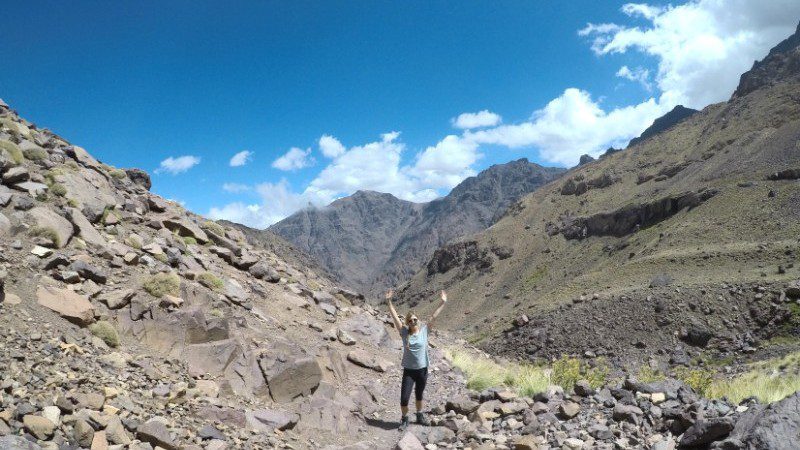
I’d never hiked a mountain. I’d pranced around the English countryside of Epping Forest and run away from ponies on Dartmoor, but I’d never come close to hiking a mountain.
So it’s fair to say I was completely out of my comfort zone when I took on Mount Toubkal in Morocco .
Our local guide challenged me with the phrase: “Walk with your mind, not your muscles” which sounds biologically impossible (because it is) but the poetry of it starts to ring true once you embark on this epic climb.
It was quite the challenge, but here’s why you should consider it.
To the Atlas Mountains
Despite the backdrop of the Atlas Mountains, most people would associate Morocco with wandering around the souks, camel rides through the desert and enjoying copious amounts of mint tea. While the latter is true, Mount Toubkal is a peak that isn’t so well known amongst non-mountaineers, but stands at an impressive 4,167 metres (13,671 ft) with incredible views of rural Morocco.
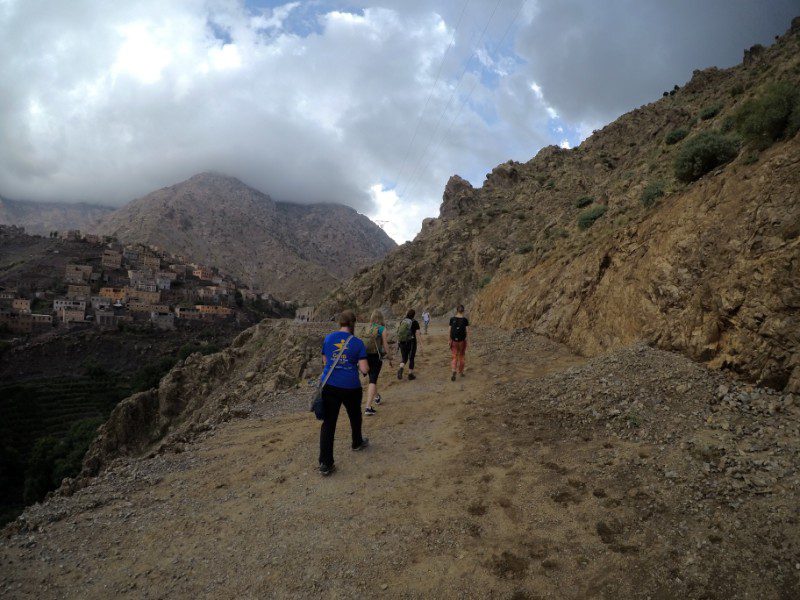
The walk from Imlil to Aroumd
We ventured on a condensed version of Intrepid’s Mount Toubkal Trek trip, which took us just two days from Aroumd and back again, rather than the usual three. Why? Well, a group of staff members from the UK and Marrakech office were taking on the Toubkal challenge to raise money for The Intrepid Foundation project, Education For All – an organisation which provides girls from rural areas of Morocco with access to education by building and running boarding houses.
And so, with boundless trepidation and many packs of blister plasters, 12 of us headed out of the city to tackle the highest peak in North Africa.
EXPERIENCE MOROCCO’S WONDERS FOR YOURSELF ON A SMALL GROUP TOUR WITH INTREPID
On our first day we were dropped at the mountain village of Imlil, from there we took a short walk to Aroumd, where we settled in for the night at a traditional mountain gite. Getting to know each other over tagine, we talked as the sun set behind the mountains that surrounded us. We couldn’t quite see the peak, but we knew that the next few days would be challenging.
From Aroumd to base camp
Our guide, Youssef, prepped us the day of the hike, advising us that this would be a long journey to the summit and not to take it lightly. Already a little apprehensive, I hoped that mistakenly pouring olive oil over my porridge instead of honey on the morning we set off wouldn’t be a bad omen, but I tried to cast that aside and concentrate on getting to base camp.
Zigzagging through the beautiful Ait Mizane Valley, we made our way on a six-hour hike, stopping every now and then to snap a picture and take in the beauty of it all. The paths leading us there were rocky and steep, but the high peaks and scattered waterfalls made it a breathtakingly scenic hike. We had to be mindful not to take too much time dawdling, as Youssef would yell “yallah yallah” as a polite way of telling us to hurry up, a phrase which we’ve since all adopted into everyday use.
READ MORE: 10 (OTHER) EXPERIENCES EVERY TRAVELLER SHOULD HAVE IN MOROCCO
Passing Berber families and mules along the way, I enjoyed every minute. It was so peaceful up in the hills and every time I looked around I couldn’t quite believe the scale of the mountains around me. “You’re climbing a mountain”, I kept reminding myself and for a cause that I felt truly passionate about.
SUBSCRIBE TO INTREPID’S NEWSLETTER FOR TRAVEL STORIES, COMPETITIONS, GIVEAWAYS & MORE
All 12 of us shared a dorm the night before the hike to summit, sleeping in the base camp refuge. With just a few hours sleep to rely on, we woke up at 5am to start the climb. I was incredibly thankful for the early start as the first ascent isn’t quite as daunting when seen in total darkness! With the help of our walking poles we clambered over rocks and journeyed upwards.
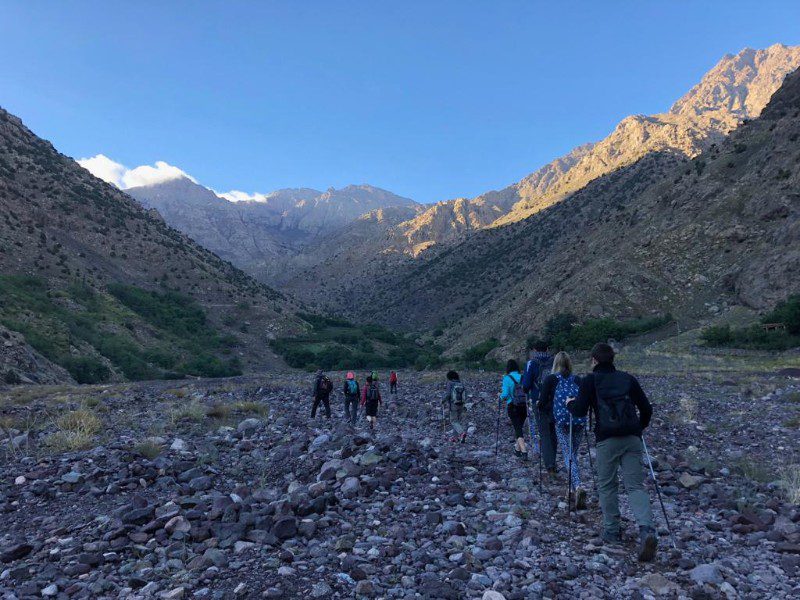
Every time we stopped I felt more and more confident that we could do it. It was going well, and although a steep climb, it was completely doable and made worthwhile each time I stopped to look behind and see how far we’d come.
TREK TOUBKAL WITH INTREPID ON OUR 7-DAY ADVENTURE
After some time we stopped again and Youssef announced that we were at 4,000 metres above sea level, just one last little push and we would be there! The adrenaline was kicking in and I felt I could almost run to the top. Walking past other trekkers smiling and reassuring us that we weren’t too far from the summit was incredibly encouraging and before we knew it, there we were, right at the top of Mount Toubkal.
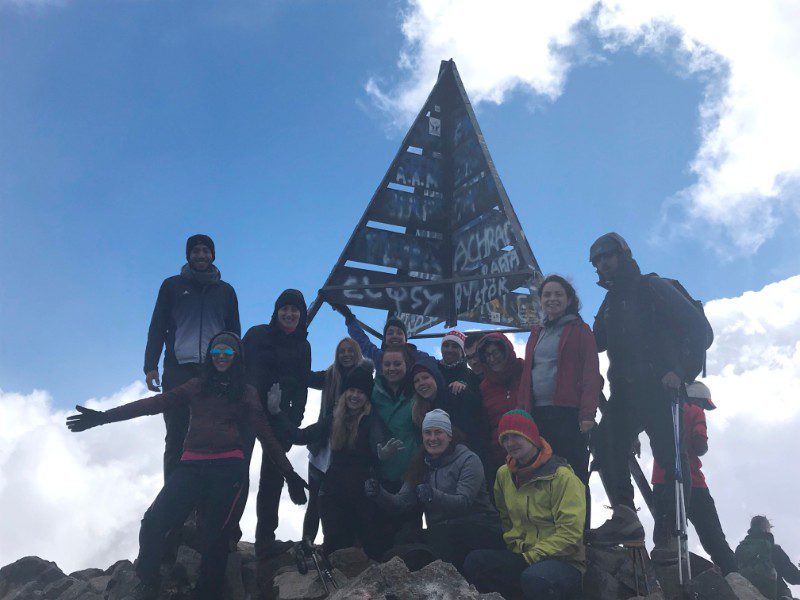
A trek to remember
While the walk back down was as much of a challenge as the walk up, we were able to watch the mountains and think about what an incredible trip it had been.
A highlight for me was the sense of togetherness that comes with travelling as a group. That’s not just the sharing of tissues, hand sanitizer and bites of cereal bars, but how we helped each other when we had a little doubt. We kept reminding each other why we were doing this and the difference we were making for the girls at Education For All .
First mountain climbed maybe, but hopefully the first of many.
Want to experience the magic of Toubkal for yourself? Check out Intrepid Travel’s Morocco hiking trip.
Education For All was established to help girls from remote, poor villages in the High Atlas region of Morocco receive an education. Living in these rural areas, access to education, particularly for girls, is not a given. Donations will go towards covering the costs of daily meals, transportation home at weekends and for holidays, access to educational materials, books and computers, the running of the boarding house and other essential items. Intrepid Group will DOUBLE whatever you give, so together we’ll be making twice the impact. To donate, click here .
(Image credits: Lauren Ellis x4, Sam Briggs, Lauren Ellis.)
Feeling inspired?
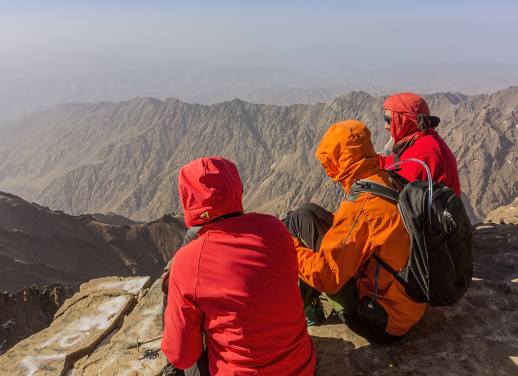
Lauren Ellis
London born and bred, Lauren is the PR Manager at Intrepid’s Brixton office. Working in travel for a number of years, Lauren’s been lucky enough to travel regularly, exploring five continents so far. Having taken Intrepid trips to Iran, Northern Cyprus and Morocco in the past year, the question is, where next?
You might also like
The 7 best places to go on a..., from delhi to udaipur, here are the five..., galapagos or madagascar which unique destination should be..., travelling to chile here’s the best time to..., 10 reasons to visit samoa, travel globally and think locally with intrepid leader..., follow the leader: tu vu will never stop..., turkey’s most underrated experience: mountain biking in cappadocia, the 10 antarctica questions you want answered, australia or new zealand where to go on..., 10 epic spots to stop at on your....
Dave's Travel Corner
Seeing the World One Step at a Time
Visitor submitted travel journals. Submission guidelines
Mount toubkal trek guide: conquer north africa’s highest peak.
March 10, 2024 by Hamza Ben Leave a Comment
Ever dreamed of standing on the highest peak in North Africa, surrounded by spectacular views and a sense of accomplishment? Welcome to Mount Toubkal, an adventurer’s dream come true. Located in the heart of Morocco’s Atlas Mountains, Mount Toubkal rises to a height of 4,167 meters. It’s a journey into the heart of Morocco, offering a window into the country’s natural beauty and cultural richness. In this article, we’ll take you through everything you need to know to start your journey to Mount Toubkal.
Why climb Mount Toubkal?
The views: Imagine watching the sunrise over the vast Sahara desert, its golden colors stretching as far as the eye can see, or looking out over the rough terrain of the Atlas Mountains, with a picture of natural grandeur. That’s the reward that awaits you at the summit of Mount Toubkal.
Cultural immersion: The journey to the summit takes you through Berber villages, where you’ll experience firsthand the warm hospitality of the locals. It’s a chance to immerse yourself in Morocco’s rich culture, sample traditional cuisine, and understand a way of life that has remained unchanged for centuries.
The challenge: Reaching the highest point in North Africa is no small feat. It’s a challenge that will test your endurance, but the sense of accomplishment when you reach the summit is unique. You’re not just climbing a mountain, you’re conquering a personal Everest.
Affordability and accessibility: Compared to other high-altitude treks around the world, Mount Toubkal is both accessible and affordable. It’s an adventure that won’t break the bank, making it a perfect choice for those looking to experience high-altitude trekking without the high price tag.
Local legends and stories
Let’s dive into the stories that make this mountain more than just a pile of rocks.
The marabout of Toubkal : Imagine this: a holy man living in a cave near the summit, known far and wide for his wisdom and miracles. This is not a scene from a movie; it’s the real story of the Marabout of Toubkal. Adored by the locals, he died in 1952, but his legacy lives on. Trekkers and locals alike still visit his tomb, a humble reminder of the man who once blessed these mountains with his presence.
The legend of the Seven Saints : Marrakech is home to a protective circle formed by the tombs of the Seven Saints. Near Mount Toubkal is the tomb of Sidi Bel Abbas, one of these revered figures. It’s not just a tomb, but a place of pilgrimage for those seeking blessings and protection. This legend binds the city to the mountain in a spiritual embrace that’s as old as time.
What these stories tell us: These stories are windows into the soul of Morocco. They reflect a deep respect for nature, a belief in a power beyond the visible, and a community united by shared beliefs and traditions. When you set foot on the trails of Toubkal, you’re walking on sacred ground, enriched by the legends that have grown from it.
4-Day Hiking Guide to Mount Toubkal
Embarking on the Mount Toubkal trek is an adventure that unfolds over four action-packed days. Here’s a sneak peek at what each day has in store for you:
Flying to Marrakech
The quickest way is to fly directly to Marrakech Menara Airport, just 6 km from the city center. The airport receives flights from many international destinations, especially Europe. Upon arrival, you can take a taxi, bus or shuttle to your accommodation. Another option is to fly to Casablanca and then take a train or bus to Marrakech.
Day 1: From Marrakech to Imlil, Then Aroumd
Your adventure begins with a drive from Marrakech to Imlil, the gateway to Toubkal. From Imlil, you’ll hike to the charming mountain village of Aroumd. This stage is about 5 km and takes a couple of hours, allowing you to ease into the trek. You’ll spend the night in a cozy guesthouse, taking in the local culture and preparing for the days ahead.
Day 2: Aroumd to the Neltner refuge via Sidi Chamharouch
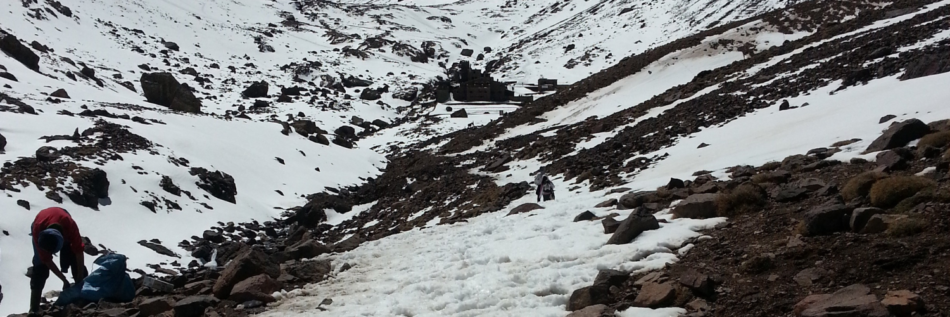
The real trek begins as you hike from Aroumd to the Neltner refuge, a distance of about 10 km. You’ll pass the sacred shrine of Sidi Chamharouch, a spiritual landmark embedded in the mountains. The trek will take you through a variety of landscapes as you gradually gain altitude. Expect to see a rich variety of plants and animals unique to the Atlas Mountains. The refuge offers simple but comfortable accommodations where you can rest and recharge.
Day 3: Summit day

Before dawn, you’ll begin your trek to the summit. This is the most challenging part of the trek with a 3-4 hour climb. When you reach the summit at 4,167 meters, you’ll be rewarded with breathtaking views of the surrounding Atlas Mountains and the Sahara Desert in the distance. After savoring the moment, descend to the refuge for a rest.
Day 4: Return to Imlil and Marrakech
On the final day, you will hike back to Imlil, a journey that will allow you to reflect on your accomplishments. From Imlil, you’ll drive back to Marrakech with memories and stories of your conquest.
Preparing for Your Mount Toubkal Trek: Fitness, Gear, and Logistics
Choosing the route.
Mount Toubkal offers two main routes to the summit: the South Route and the North Route. The South route is your friend if you’re new to this adventure, thanks to its less demanding terrain and shorter duration. It’s like a welcoming handshake to the world of high-altitude trekking. The North Route, on the other hand, challenges even the most experienced hikers with its steeper climbs and longer journey. But the reward? Unbeatable views that make you feel like you’ve stepped into an epic painting.
For beginners, we suggest an itinerary that gently introduces you to the wonders of Toubkal, perhaps with a guided tour from a reputable operator. More experienced adventurers may opt for the northern route and test their strength against the mountain’s might. When planning your trip, consider the best time to trek (spring and fall are golden), visa requirements, travel, and budget.
Getting fit and acclimatized
Mount Toubkal is no walk in the park. At 4,167 meters, it demands respect and preparation. Start by getting your body in shape with hiking, running, or swimming. Remember, the mountain air is thin, and altitude sickness is a real party killer. Symptoms include headaches and dizziness, but you can combat them by taking it slow, staying hydrated, and eating well. Altitude training as much as possible before your trip can make a big difference.
Pack the right gear
Your backpack is your trusty companion on this trip. Essentials include weather-appropriate clothing (think layers), sturdy boots, a sleeping bag, trekking poles, and a lightweight pack. Consider bringing a camera to capture the views, a headlamp for those early starts, and a power bank to keep your gadgets charged. Leave the jeans and cotton at home; they’re not friends of the mountain.
Reaching the summit
The final push to the summit is both a challenge and a celebration. You’ll face cold winds, rocky paths, and perhaps a personal test of will. But the view from the top? Absolutely worth it. Start early to make the most of the daylight, dress in layers to beat the chill, and use those trekking poles to navigate the rocks. And when you get there, take a moment to enjoy the glory of your accomplishment. You’ve earned it.
Tips for a successful summit
Climbing Mount Toubkal is an adventure that will leave you with memories that will last a lifetime. Here’s how to make the most of your trek:
Choose the right route : Whether you’re a beginner or an experienced hiker, choose the route that matches your skill level. Beginners should choose the southern route, while experienced trekkers may find the northern route more challenging and rewarding.
Get fit and acclimatized : Prepare your body for the trek with regular exercise and, if possible, acclimatize to high altitudes. Remember, slow and steady wins the race, especially at high altitudes.
Pack Smart : Bring the essentials – good hiking boots, layers of clothing, a sleeping bag, trekking poles, and a lightweight backpack. Don’t forget your camera and headlamp!
Know what to expect : Familiarize yourself with the itinerary, from the drive from Marrakech to the breathtaking views from the summit. Understanding each stage will help you set realistic expectations.
Additional tips for an unforgettable trek
Hire a local guide and porter : This supports the local economy and enriches your trekking experience with expert knowledge of the terrain and local stories.
Respect the environment and culture : Follow Leave No Trace principles to preserve the beauty of Mount Toubkal. Embrace local customs to show respect for the communities you visit.
Celebrate your achievement : Reaching the summit is a momentous occasion. Celebrate with a cup of mint tea and ask for a certificate of achievement to commemorate your adventure.
Explore more of Morocco : Combine your trek with visits to other Moroccan highlights: Marrakech, Essaouira, and the Sahara offer rich cultural experiences to complement your trekking adventure.
Post-Trek Relaxation Options
After conquering the majesty of Mount Toubkal, it is important to take time to relax and rejuvenate your body and mind. Here are some perfect ways to unwind and immerse yourself in the local culture:
Visit a traditional hammam : A must-do experience! Hammams such as the Hammam de la Rose in Marrakech or the Kasbah du Toubkal in Imlil offer a sanctuary for relaxation. Enjoy a steam bath, a scrub, or a massage, and let the soothing soak melt away the fatigue of the trek. It’s a ritual that refreshes you inside and out.
Explore the markets (souks) : Dive into the souks of Marrakech or Imlil for an explosion of colors, smells, and sounds. Whether it’s the Semmarine Souk or the Imlil Souk, you’ll find unique souvenirs, exquisite handicrafts and aromatic spices. Shopping here is an adventure in itself and offers a glimpse into the local way of life.
Escape to a quiet retreat : After the hustle of trekking, places like Marrakech’s Jardin Majorelle or the Azzaden Valley near Imlil offer a peaceful retreat. Surround yourself with nature, take in the amazing views and enjoy the peace. These retreats provide the perfect setting to reflect on your journey and recharge for your next adventure.
Conclusion
Climbing Mount Toubkal is an adventure that offers the physical challenge of reaching the highest peak in North Africa and a rich cultural experience.
As you plan your trek, remember the importance of preparation, respect for the environment and culture, and the many ways to enrich your experience before, during, and after the climb. Your Mount Toubkal adventure is a gateway to a deeper understanding of Morocco’s heart and soul.
Q: Do I need a guide to climb Mount Toubkal?
A: It is possible to climb Mount Toubkal without a guide, as the trails are well-marked and easy to follow. However, hiring a guide can enhance your experience, as they can provide you with local knowledge, cultural insights, and logistical support. You can find many reputable guide services online or in Imlil, the starting point of the trek.
Q: What is the best time of year to climb Mount Toubkal?
A: The best time of year to climb Mount Toubkal depends on your preference and experience. The most popular season is from April to October when the weather is warm and dry, and the trails are clear of snow. However, some trekkers prefer the winter season, from November to March when the mountain is covered in snow and ice, and the crowds are fewer. Winter climbing requires more equipment and skills, such as crampons and ice axes.
Q: How long does it take to climb Mount Toubkal?
A: The duration of the climb depends on the route you choose and your pace. The most common route is the south side, which can be done in 2 to 4 days. The north side is longer and more challenging and can take up to 6 days. The summit day usually takes 6 to 8 hours, depending on the weather and your fitness level.
Related posts:

Leave a Reply
Your email address will not be published. Required fields are marked *
Save my name, email, and website in this browser for the next time I comment.
This site uses Akismet to reduce spam. Learn how your comment data is processed .
- Above the Clouds
- Highlight of the Month
- Press Releases
- Book Reviews
- Quiz: Geography
- Quiz: Travel
- Tour Booking
- Travel Insurance
- Travel Products
- Contributors
- Media Coverage
Theme tagline
Mount Toubkal Treks
Conquer Morocco's highest peak, Mount Toubkal, with expert guides. Experience stunning landscapes, cultural immersion, and the thrill of reaching new heights on an unforgettable trekking adventure.
Our collection of the most popular Treks.
Mount Toubkal popular packages
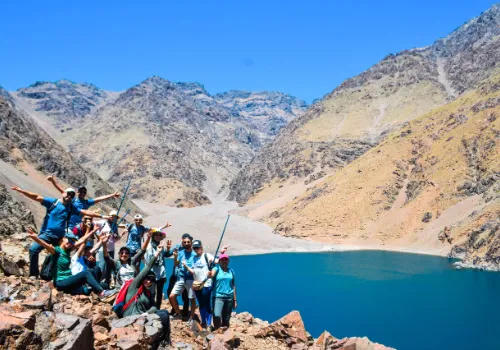
High Atlas mountains 6 Days Discovery Trek
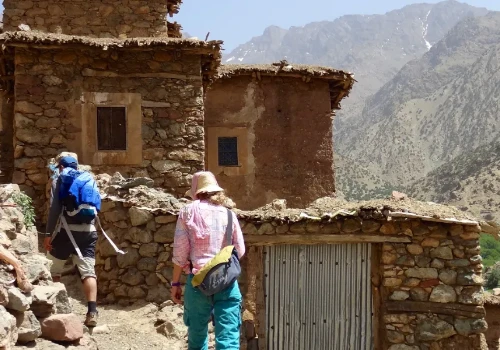
Imlil Day Trip From Marrakech
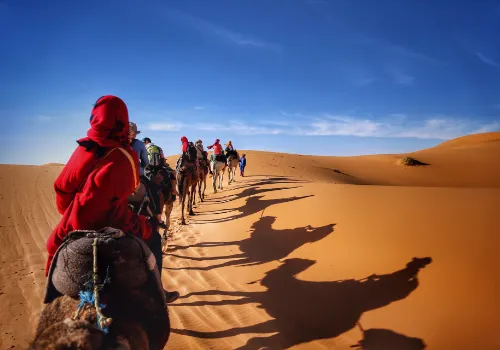
Toubkal and Sahara Combined Trip
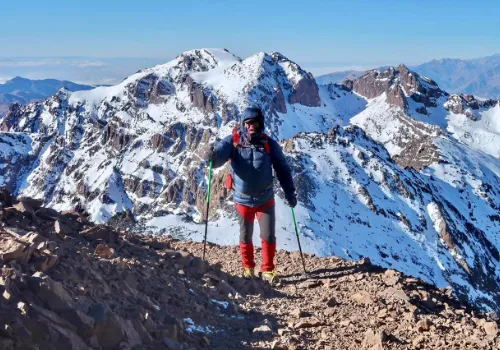
Mount toubkal 2 days Climb
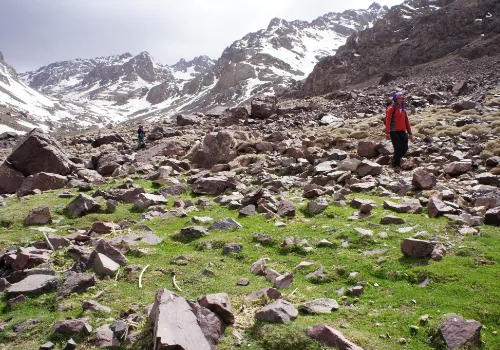
Toubkal Ascent 3 Days Adventure
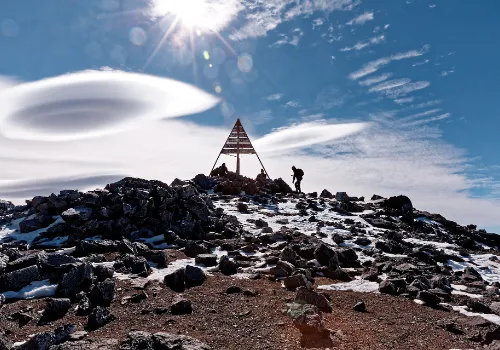
Mount Toubkal 5 Days Expedition Trek
Our Travel Categories
Toubkal Summit Travel Categories
12 tour packages
Embark on an unforgettable journey through the breathtaking landscapes of Mount Toubkal, Berber villages, and the Atlas Mountains. Choose from our diverse trekking categories, offering adventurous trips, cultural immersions, and stunning vistas. Whether you seek a solo adventure, a family-friendly experience, or a budget-friendly getaway, we have the perfect package to suit your travel style and create lifelong memories.
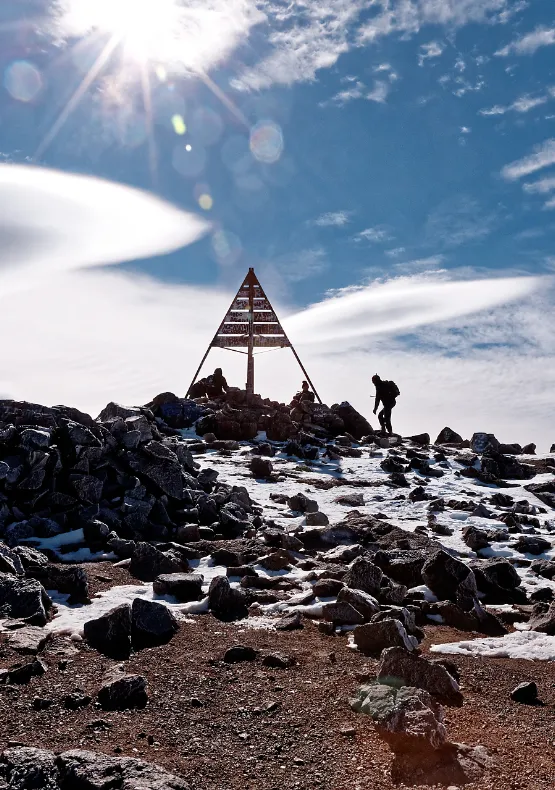
Mount Toubkal Trekking Packages
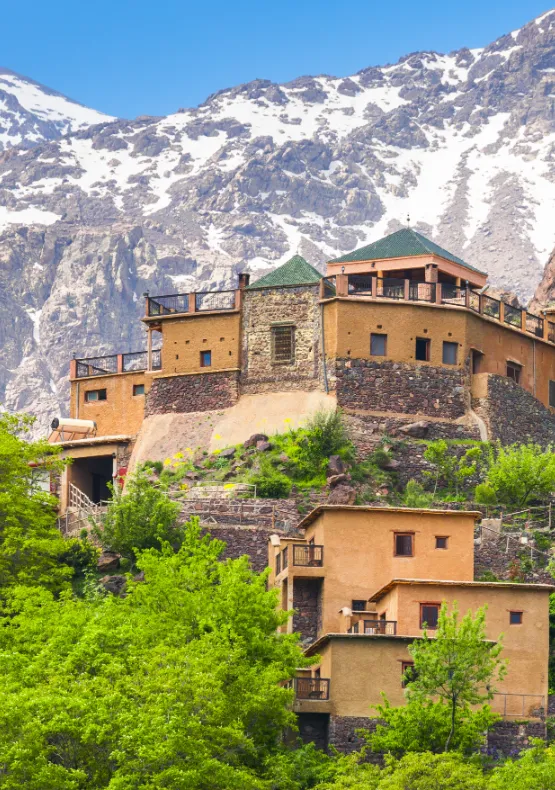
Morocco Berber Villages Treks
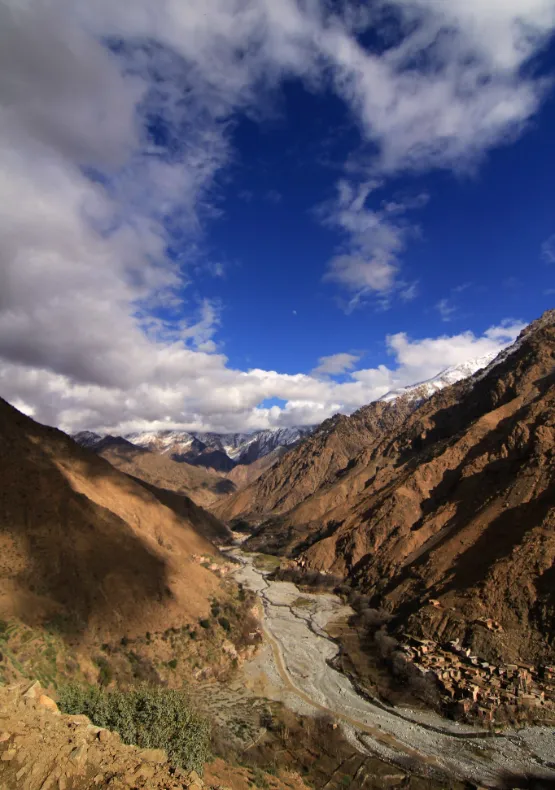
Day Trips From Marrakech
Toubkal trekking adventures: explore morocco's majestic peaks, berber villages, and sahara desert.
Morocco is a top destination worldwide, drawing many travelers who seek adventure vacations. Visitors come from all corners of the globe to explore its magnificent mountain ranges, breathtaking scenery, rich history, and welcoming communities. We provide exceptional trekking experiences in Morocco, featuring the renowned Toubkal peak, Berber villages, and valleys that offer an opportunity to immerse yourself in the generosity of these communities and the stunning landscapes. Another highly recommended option is a trip to the Sahara Desert, where you can ride a camel to the campsite and experience the tranquility of the golden dunes under the stars. We also offer combined tours to Morocco's historical cities, tailored to your specific needs. Simply send us an email, and we will be at your disposal. No matter what you choose, an incredible adventure awaits you in Morocco.
Check our last blog articles
Mount Toubkal Summit Blog
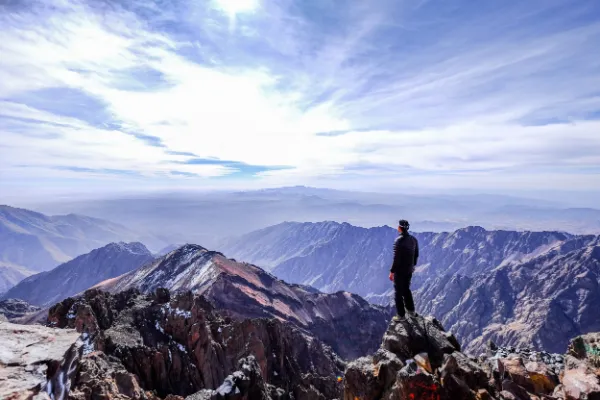
Unveiling the Majestic Charm: A Guide to Trekking in Morocco
Introduction:Embark on an extraordinary journey through Morocco's diverse landscapes, as we explore the captivating world of trekking. From the towering peaks of the Atlas Mountains to the endless dunes of the Sahara Desert, Morocco offers a wealth of trekking opportunities that promise breathtaking...
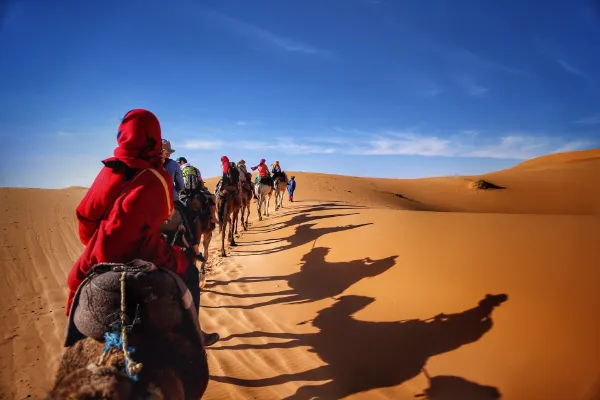
Traveling to the Moroccan Sahara Desert: Tips for a Memorable Adventure
The Moroccan Sahara Desert is an awe-inspiring landscape that attracts travelers from around the world. From the golden sand dunes to the vibrant culture of the nomadic Berber people, there is no shortage of adventure and beauty in this region. Here are some tips to help you plan your travel to the...
- Last Minute
- About KE Adventure
- KE Office Team
- Awards & Accolades
- The KE Experience
- Grades Explained
- Flight Information
- Booking with KE
- Travel Insurance
- Booking Conditions
- Frequently Asked Questions
- Book with Confidence
- Sustainability
- Climate Change
- Carbon Absorption
- Partnerships and charity
- Sustainable Travel
- Enquire now
- Canary Islands
- Czech Republic
- Netherlands
- North Macedonia
- Switzerland
- United Kingdom
- South Korea
- Reunion Island
- Sierra Leonne
- South Africa
- New Zealand
- Papua New Guinea
- El Salvador
- French Guiana
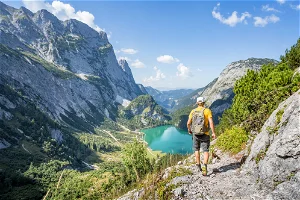
The world’s best walking routes from leisurely footpaths to challenging trails.
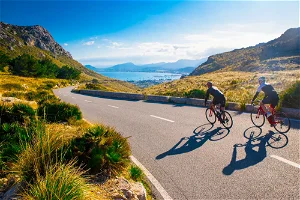
Road, mountain, adventure and leisure cycling holidays across the globe.
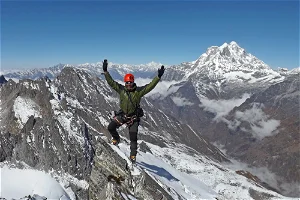
Taking you high into the world's most spectacular mountain ranges.
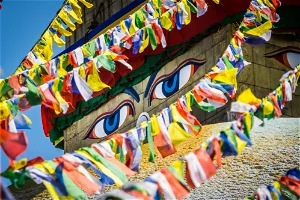
Active journeys focusing on the cultural highlights of a country.
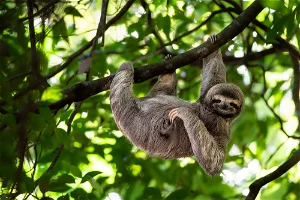
Wildlife experiences and safaris to see the world's most incredible animals.
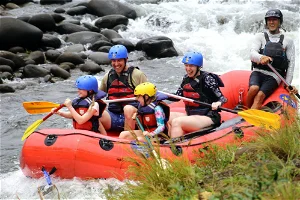
Fun-filled adventures to share with all the family, led by specialist leaders.
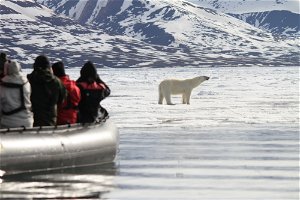
Discover the unique wilderness landscapes and wildlife of the Arctic and Antarctica.
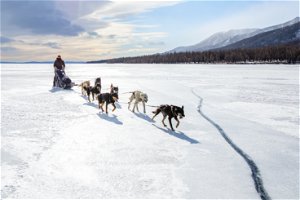
Thrilling snowy escapes away from the downhill crowds.
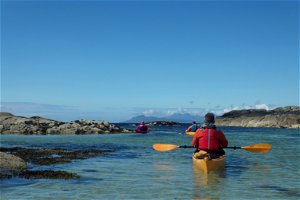
Explore the world from a different perspective on one of these adventures.
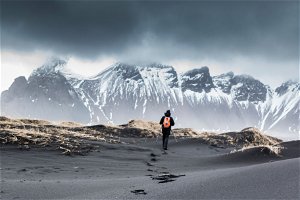
Unique, expedition-style trips; adventures you never knew existed.
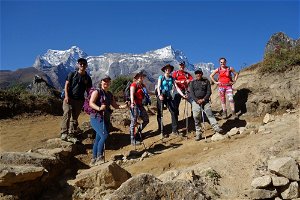
Small group holidays led by fantastic local KE leaders.
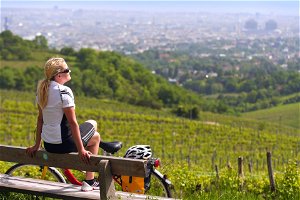
Travel at your own pace while we arrange all the logistics.
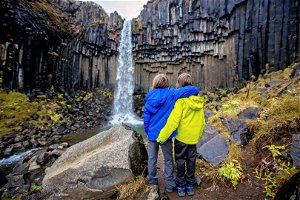
Experience our guided adventures, exclusively for your friends and family
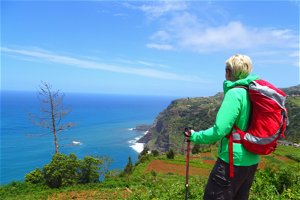
Join like-minded travellers on our guided group adventures, or travel Self-Guided.
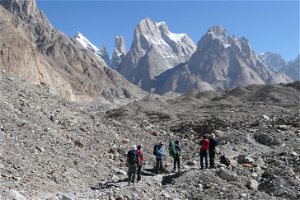
Encapsulating the spirit of KE from the past 40 years of adventure travel.
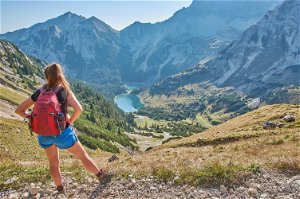
An adventurers playground, from quaint alpine villages to towering peaks.
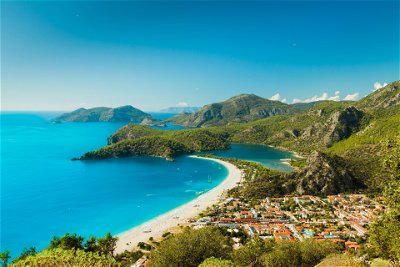
Gaze out to sea and follow rugged trails past golden beaches.
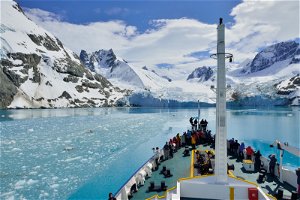
Once-in-a-lifetime adventure across the frozen oceans.
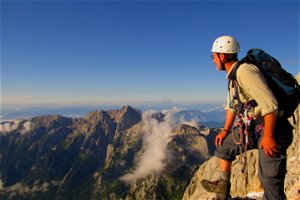
For the peak-baggers! Climb the highest peak in each country.
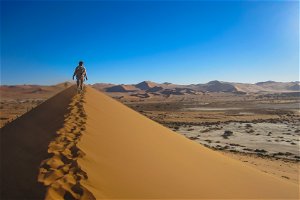
Incredible landscape by day, stargaze the endless sky by night.

Island-hopping in the Galapagos to the Canaries to the paradise trails of Bali.
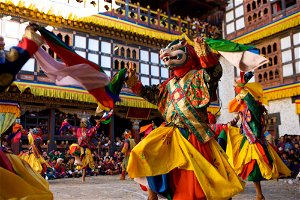
Timing your holiday right to coincide with a local festival.
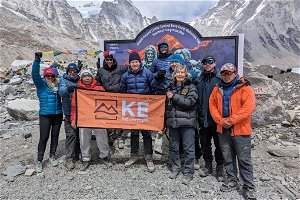
Step into one of our best-selling adventures.
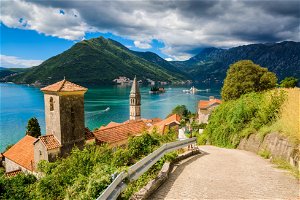
Enjoy the fabulous climate, food and routes all around The Med.
- Destinations
Mount Toubkal Trek
Towering above Morocco's rugged landscapes, this iconic mountain offers adventurers a captivating ascent through diverse terrain. While a formidable mountain, it caters to all skill levels. With easy access and low technical requirement, it is the perfect mountaineering escape.
From the bustling streets of Marrakech to the serenity of the High Atlas trails, Mount Toubkal beckons with its summit as a rewarding challenge that unveils panoramic views and a sense of achievement like no other. Whether it's trekking in the picturesque foothills or summiting the 4,167 metre peak, a Mount Toubkal trek offers a once-in-a-lifetime experience that no outdoor enthusiast should miss.
Featured Toubkal Treks
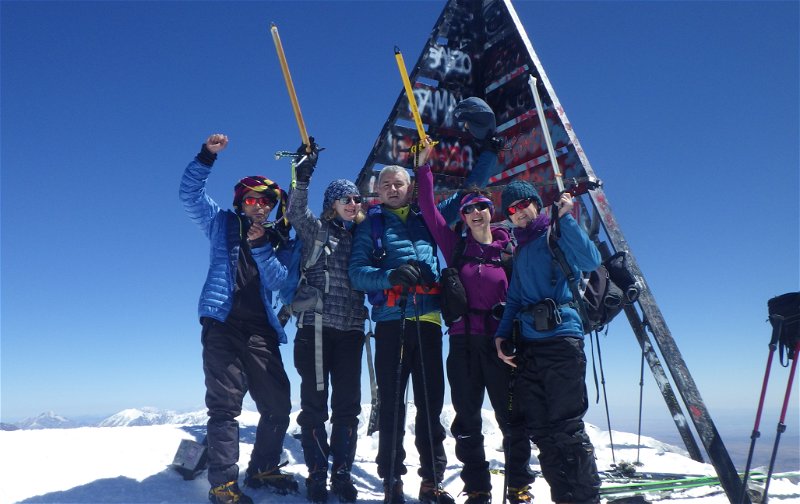
Mount Toubkal in Winter
Winter trekking holiday to the summit of North Africa`s highest peak Toubkal (4167m) in the High Atlas Mountains of Morocco
8 days from
US$1,370 without flights
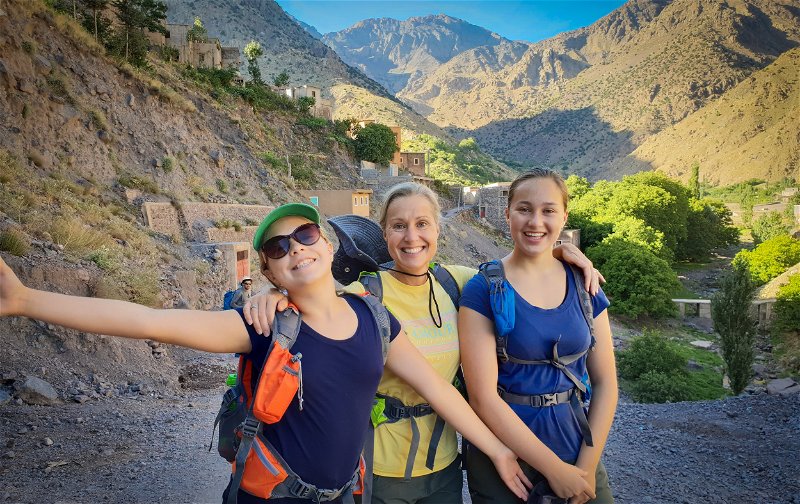
Family Teenage Toubkal Ascent, Morocco
Climb Mount Toubkal, North Africa’s highest mountain, with your family. Perfect summit objective for teenagers.
US$900 without flights
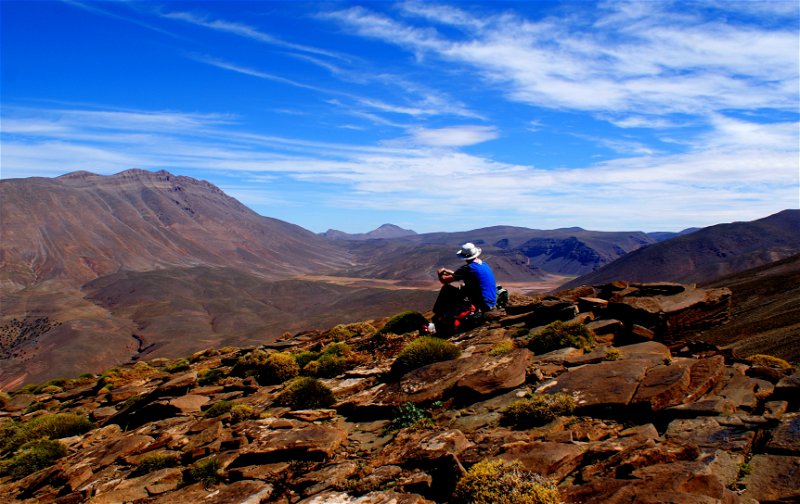
Across the High Atlas Trek
An epic trekking holiday to Mount Toubkal traversing the High Atlas Mountains including the three highest peaks in Morocco.
21 days from
US$2,320 without flights
20 Years of Trekking on Toubkal
KE Adventure has over 20 years trekking experience on Mount Toubkal. Over this time we have learned the best routes, the best places to stay and things to do and also built up an infectious rapport with our local guides and the wider Moroccan community.
5 reasons why a Mount Toubkal Trek Should be on Your Bucket List
Trekking Mount Toubkal offers breathtaking vistas, cultural immersion, physical challenge and a real sense of accomplishment, making it a must-do bucket list experience.
Breathtaking Views
Throughout every stage of your Mount Toubkal trek, you'll have the opportunity to pause and savour the breathtaking views that unfold before you. As you ascend, the majestic Atlas Mountains will come into view, their peaks adorned with clouds, creating a surreal and ethereal atmosphere. On a clear day, you will be able to see the undulating sands of the Sahara Desert stretching out into the horizon, a stunning picture that showcases the diverse and awe-inspiring natural wonders of Morocco.

Friendly Locals
Moroccans welcome travellers with open arms. From the bustling medinas to the quiet oases, their infectious hospitality traanscends language barriers. With mint tea ceremonies, vibrant markets and tales of ancient cultures, they offer a kaleidoscope of experiences. Embracing visitors as honoured guests, they share the secrets of their land, creating lasting bonds that linger in the memory long after the journey ends.
Accessible All Year Round
Toubkal can be climbed all year round, and any reasonably fit and prepared person can reach the summit of this non-technical peak. In the summer and spring months, Mount Toubkal is adorned with vibrant wildflowers and the trails are clear of snow, making it an excellent time for hikers to revel in the stunning landscape and flourishing flora.
However, a winter trek in Mount Toubkal offers a different kind of allure, as the landscape is blanketed in snow, creating a serene and magical atmosphere. Winter mountaineers flock to Toubkal during this time, seeking the thrill of snow-covered trails and a truly unique ascent. Regardless of the season, Mount Toubkal's rugged beauty and accessibility beckon adventurers from around the world to experience its grandeur.
Experience the Silence of the Moroccan Countryside
Escape the bustle and sensory overload of Marrakech and enter one of the quietest regions on Earth. Embarking on a Mount Toubkal trek immerses you in the peaceful embrace of the High Atlas Mountains , where the only sounds are the gentle rustling of wind through the valleys and the crunch of your footsteps on the mountain trails.
Sense of Achievement
Standing at the summit of Mount Toubkal, the enormous sense of achievement is overwhelming. Mount Toubkal’s peak stands at an impressive 4,167 metres, making it the highest peak in North Africa. The combination of the challenging ascent, the sheer altitude and the stunning vistas make you feel on top of the world, both figuratively and literally.
More Information About Mount Toubkal
Mount Toubkal's elevation is approximately 4167 metres (13,671 feet) above sea level making it the highest peak in North Africa.
The best time for Mount Toubkal treks is during the spring (March to May) and autumn (September to November) when the weather is mild and stable. The winter months offer a different experience for experienced trekkers but can be challenging due to snow and cold temperatures. However, Winter trekking of Mount Toubkal is still a very popular and rewarding way to do it.
Essential items include appropriate clothing for varying weather conditions, comfortable hiking boots, a sleeping bag, a backpack, a headlamp, a refillable water bottle, sunscreen, and a hat.
Yes, many trekkers choose to combine their Mount Toubkal trek with visits to other Moroccan cities and attractions, such as Marrakech, Casablanca, or the Sahara Desert. It's a great way to experience the diverse culture and landscapes of Morocco.
Yes, acclimatisation is crucial to prevent altitude sickness. Our trips to the summit often spend a night in a village like Aroumd or Imlil before attempting the summit.
KE has been taking groups to the summit of Toubkal for over 20 years and over that time we have built up a fantastic team of experts in the KE office and in Morocco. We have a superb team of leaders, local guides and trek crews with whom we have worked with for many years. Our expert team of local KE leaders receive regular winter and summer training, ensuring you are in the hands of some of the best leaders in Morocco.
A lot of positive thinking and plenty of trek preparation! The best way to prepare for any Toubkal trek is to lace up your walking boots and get out in your local hills combined with regular exercise to increase your overall level of fitness. Cycling, jogging and running are perfect for building up your stamina and this combined with hill walking days of 6 to 8 hours will ensure you are fully prepared. Try to get used to walking in the footwear you’ll be wearing for the trek and remember the fitter you are when you join the trek, the greater your level of enjoyment will be.
The summit of Toubkal is 4,167m and most people who are trekking in the High Atlas will feel some minor effects of altitude such as a slight headache and shortness of breath whilst ascending on the trail. These symptoms are a normal response to the shortage of oxygen and nothing to be concerned about. Furthermore our experienced local team will ensure that everyone walks at a pace which will help us prepare for summit day. It’s always good to arrive in Morocco fully rested and if you have a long flight, it may help if you arrive a day or two before the holiday starts so you can catch up on any lost sleep and start the trek feeling refreshed and fit. Keeping properly hydrated helps the acclimatisation process so it makes sense to drink plenty of water during your holiday along with the refreshing Moroccan mint tea! Trekking holidays are not the time to diet! Morocco offers a wonderful melting pot of flavours and a healthy balanced diet will keep you feeling energised and ready for the trail ahead plus help in your body’s acclimatisation process.
At KE we work hard to ensure that our local leaders, staff and pack animals are well looked after whilst trekking. Wherever possible we use local gites and guesthouses as we feel working directly with local accommodation owners helps build up relationships and contributes directly to the local community. On all our of Toubkal treks we recommend the use of water purification tablets to try and cut down on the buying of water in plastic bottles. Furthermore, we invest in our leaders by providing regular training courses which includes first aid, winter and avalanche training.
The beauty of group travel is trekking alongside a group of like-minded travellers with a wide range of ages, interests and abilities. Each day is planned to ensure there is plenty of time to take photographs, enjoy refreshment stops and take in the fantastic scenery. Although there is a certain distance to cover each day, a group holiday is not a “route march” so our leaders don’t expect everyone to walk at the same pace. At KE we’ll ask you about your previous trekking experience to ensure you book on the right holiday and grade for you; it is your holiday after all!
The summit of Toubkal is 4167m and most people who are trekking in the High Atlas will feel some minor effects of altitude such as a slight headache and shortness of breath whilst ascending on the trail. These symptoms are a normal response to the shortage of oxygen and nothing to be concerned about. Furthermore our experienced local team will ensure that everyone walks at a pace which will help us prepare for summit day. It’s always good to arrive in Morocco fully rested and if you have a long flight, it may help if you arrive a day or two before the holiday starts so you can catch up on any lost sleep and start the trek feeling refreshed and fit. Keeping properly hydrated helps the acclimatisation process so it makes sense to drink plenty of water during your holiday along with the refreshing Moroccan mint tea! Trekking holidays are not the time to diet! Morocco offers a wonderful melting pot of flavours and a healthy balanced diet will keep you feeling energised and ready for the trail ahead plus help in your body’s acclimatisation process.
At KE we work hard on having a responsible approach to travel and this includes the buying of mineral water in plastic bottles. For all our holidays in Morocco we ask you to take water purification tablets with you, which cuts down on the use of mineral water and also means that along the trail it is possible to fill up your bottle in local villages and and then pop in a couple of purification tablets - easy!
Morocco is so much more than couscous and one thing that people praise our local team on, is the food. Coucous is the main staple of North Africa but Morocco has a lot more to offer and you'll never go hungry on our trekking holidays. Each day you'll find yourself sampling a rich variety of local ingredients and fresh vegetables alongside soups, stews, pasta, potatoes and tagines. Colourful fresh salads decorated with olives, cheeses and lentils are also in abundance!
Remember Morocco is a Muslim country and any holiday is more enjoyable if you pack the right clothing. Knee-length or trekking shorts for both men and women are acceptable, whilst "zip-off" trousers are a fantastic item of trekking clothing, especially as the bottom of the trousers can be zipped on and off when needed. Technical, quick drying t-shirts covering the shoulders are perfect for trekking and more practical in higher temperatures than heavy cotton t-shirts. A long-sleeved trekking shirt is ideal for covering up in the daytime when the sun is strong or late in the afternoon when the sun is setting and temperature drops.
A lot of positive thinking and plenty of trek preparation! The best way to prepare for any trek is to lace up your walking boots and get out in your local hills combined with regular exercise to increase your overall level of fitness. Cycling and running are perfect for building up your stamina and this combined with some longer hill walking days of 6 to 8 hours will ensure you are fully prepared. Try to get used to walking in the footwear you’ll be wearing for the trek and remember the fitter you are when you join the trek, the greater your level of enjoyment will be.
We strongly recommend on our Moroccan treks that you take along a sturdy kit bag. The trek team will consist of a team of muleteers and their mules for transporting baggage in the Atlas Mountains. Each morning you'll say goodbye to your kit bag which will be packed onto the mules and transported to your next accommodation. This means no "heavy back-packing" which leaves you free to enjoy the views and the spectacular scenery. When you arrive at your next overnight your kitbag will be there ready and waiting for you!
At KE we pride ourselves on honesty so it wouldn't be true if we were to tell you that you'll have the High Atlas and Toubkal all to yourself! However with a wide range of routes available there is plenty of space for everyone and sharing the trail with a wide range of nationalities plus local and international travellers is one of the highlights of trekking. Meeting other travellers is after-all the reason why people chose group travel and the incredible melting pot of people you meet along the way are always willing to share their stories and experiences. On a few of our longer trekking holidays there will be days when you won't see any other trekking groups and will indeed have hours on the trail to yourself! We can't promise you complete solitude but we can promise you an unforgettable experience and memories to last a lifetime!
Worldwide Adventure Holidays
We offer over 360 active adventures in 100 countries worldwide. Best known for our pioneering itineraries and challenging trips with an 'edge', we also offer a range of easier guided and self-guided walking, cycling, family and wildlife journeys throughout the world. Based in Keswick in the Lake District, we are passionate about creating unique travel experiences for our customers.
40 years of operating; fully bonded and your money 100% protected.
From leisurely walking and cycling to push-your-limits expeditions.
400 Guided Group and Self-Guided adventures in 100 countries.
Sustainable
100% carbon absorption. Caring for the environment and local communities.

Contact Hours
Your wishlist.
Start your next adventure.
Click the heart icon on the search or holiday pages to save a holiday to your wishlist.
{{ result.name }}
{{ result.locations['country'] }} , {{ result.locations['region'] }}
{{ result.introduction }}
{{ result.duration }} days from
{{ result.fromPriceWithoutFlights }} without flights
{{ result.fromPriceWithFlights }} with flights
Holiday Search
- [email protected]
- Call +212 690 026006

Climb Mount Toubkal The Complete Guide in 2023
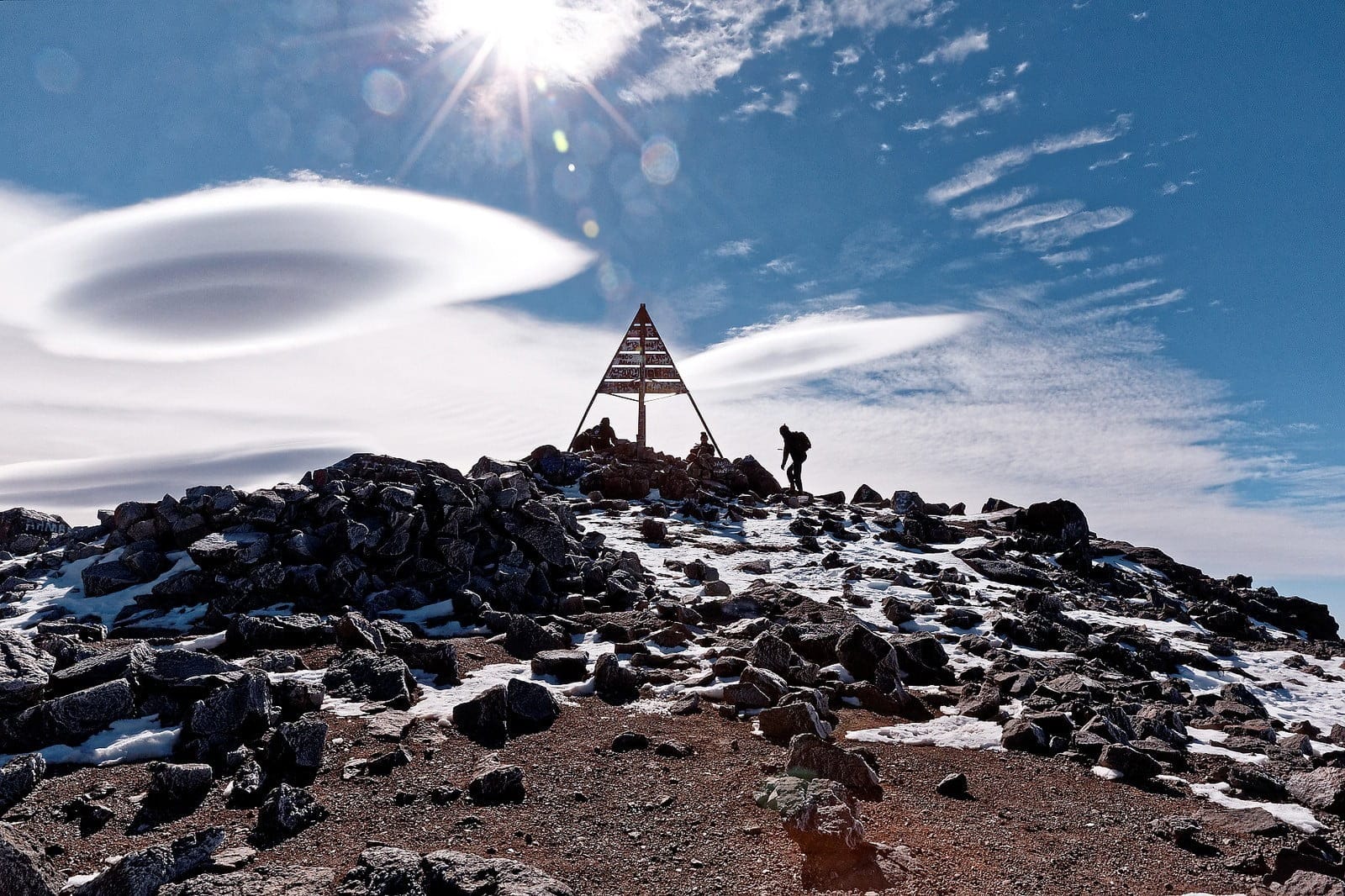
- Toubkal Morocco
EVERYTHING YOU NEED TO KNOW ABOUT THE MT TOUBKAL!
Mount Toubkal is a mountain peak found in Toubkal National Park in southwestern Morocco. With its height of 4,167 metres (13,671 feet), Toubkal is the highest peak in North Africa. It’s situated in Morocco’s southwestern region about 60 kilometers south of Marrakech, just part of the Atlas Mountain Range. A popular destination for climbers, it is the highest peak for over 2000 km.
As well as it’s ever changing weather, Mount Toubkal s is also famous for its incredible views across the surrounding countryside(Dowar), attracting both experienced hikers and trekking newbies alike! If you’d like to climb Mount toubkal and experience the stunning highlands, here’s how to do it …
REGISTER NOW
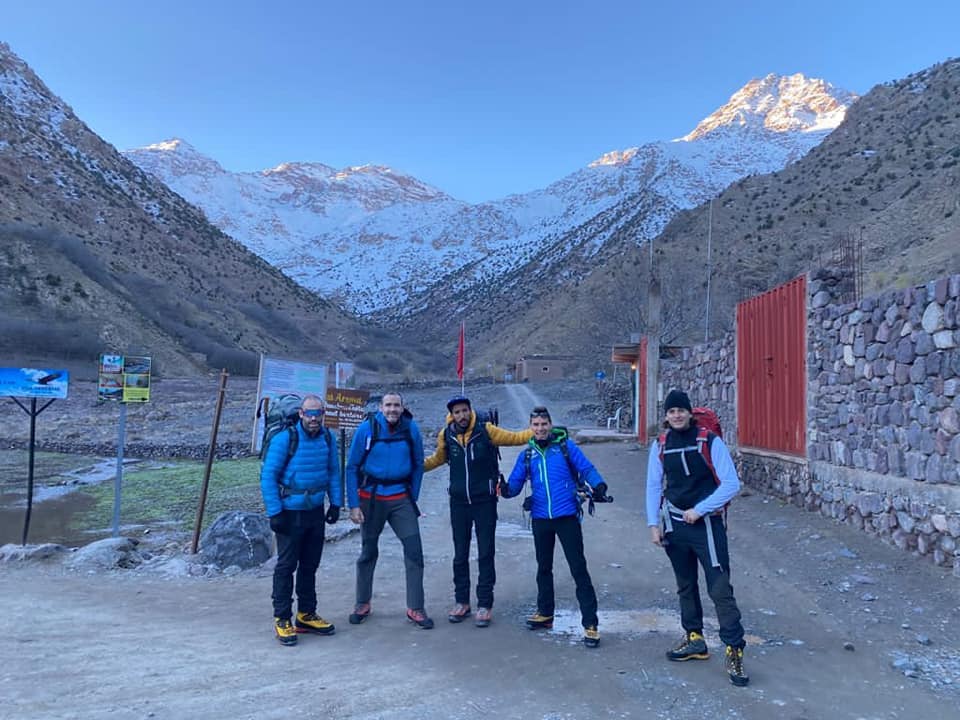
WHEN SHOULD I CLIMB MOUNT TOUBKAL?
The best months to climb Mount Toubal are April and May, and September and October.However If you are an amateur walker, then you should only Clim Mount Toubkal during the summer months (June-September). Snow is often seen at the summit all year round, however during winter months the mountain is likely to be thick in snow and ice, covering the paths and making the journey to the top extremely dangerous.
Prior to setting off you should always double check the weather forecast . A day in June and July may feel like a lovely summer’s day at the bottom of the mountain, however by the time you reach the summit it can feel just like winter. The average annual temperature at the summit is below 0°! Therefore, it is so important to make sure you are fully prepared before setting off. Check out our Adventure Journal post, What Do I Need to Climb Ben Nevis, for a full list of packing essentials!
Also, avoid trekking to the summit of Mount Toubkal alone, ensure someone knows where you are going, what route and when you should be back and finally make sure you register your mobile phone or email with 999 for text messages (more information on this can be found HERE ).
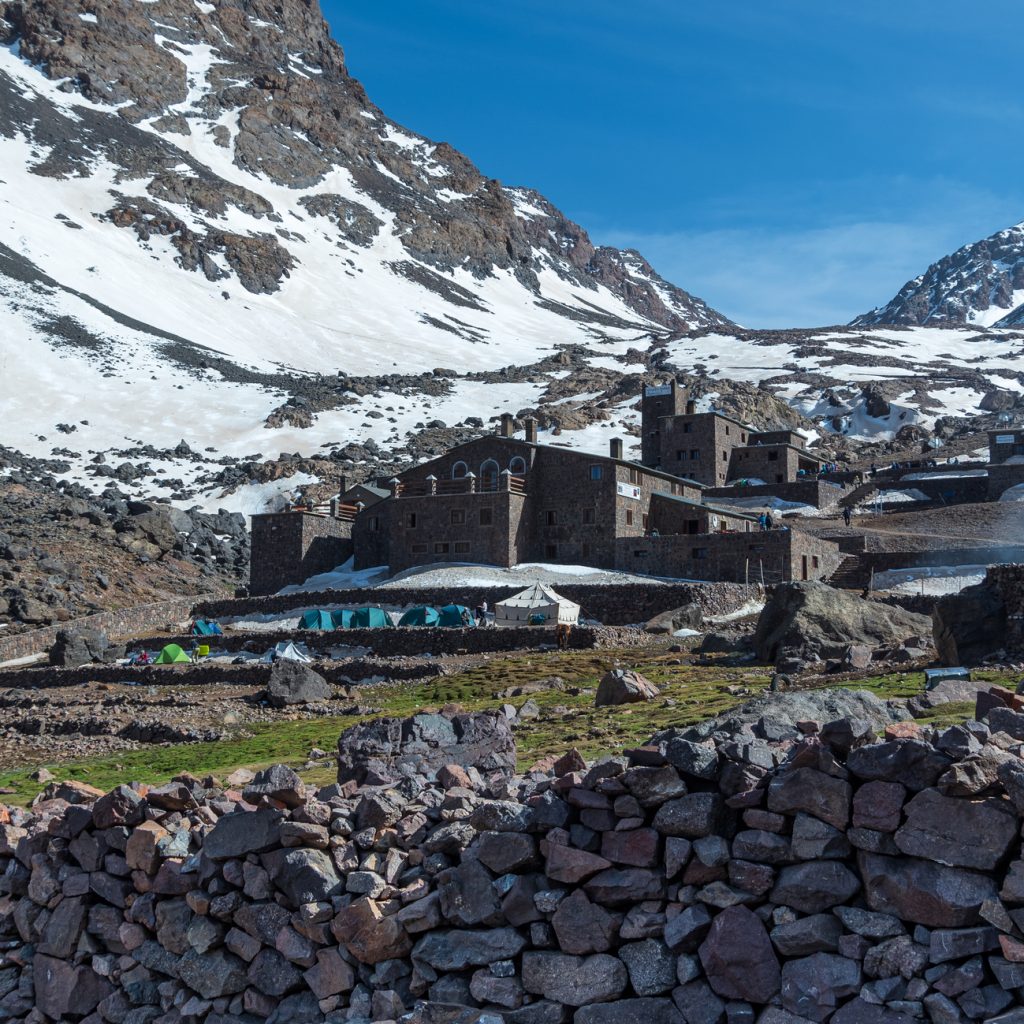
WHERE IS MOUNT TOUBKAL?
Mount Toubkal is located near Imlil village , The peak is situated 40 miles (60 km) south of Marrakech in the High Atlas (Haut Atlas) , and is part of Parc National du Jbel Toubkal
WHAT ROUTE SHOULD I TAKE TO THE SUMMIT?
There are two main routes to the top of Mt toubkal both varying in the difficult,The Mountain Path is the route taken by the majority of visitors is Imlil valley Path, Whilst The Lac Ifni route is a much more challenging invloing long time disctence and long scramble along the traverse of the arete.
The Ifni Lac route is challenging, but spectacular route involves 1506m of ascent and a total walking distance of 17.5km. This is a tough ascent – and should only be taken by experienced trekkers.
We highly recommend trekking to the summit of Mount Toubkal via Imlil Valley.
Climbing Mount Toubkal via Imlil Valley
Typical itinerary.
This itinerary follows the most common route to Toubkal on the South. We highly recommend itineraries that build in one or two more days for acclimatisation.
- Arrive or be in Marrakech, drive from Marrakech to Imlil in the morning
- Trek to Refuge Camp and spend the night
- Trek to Toubkal via South Side and descend via South Side
- Return to Imlil then Marrakech
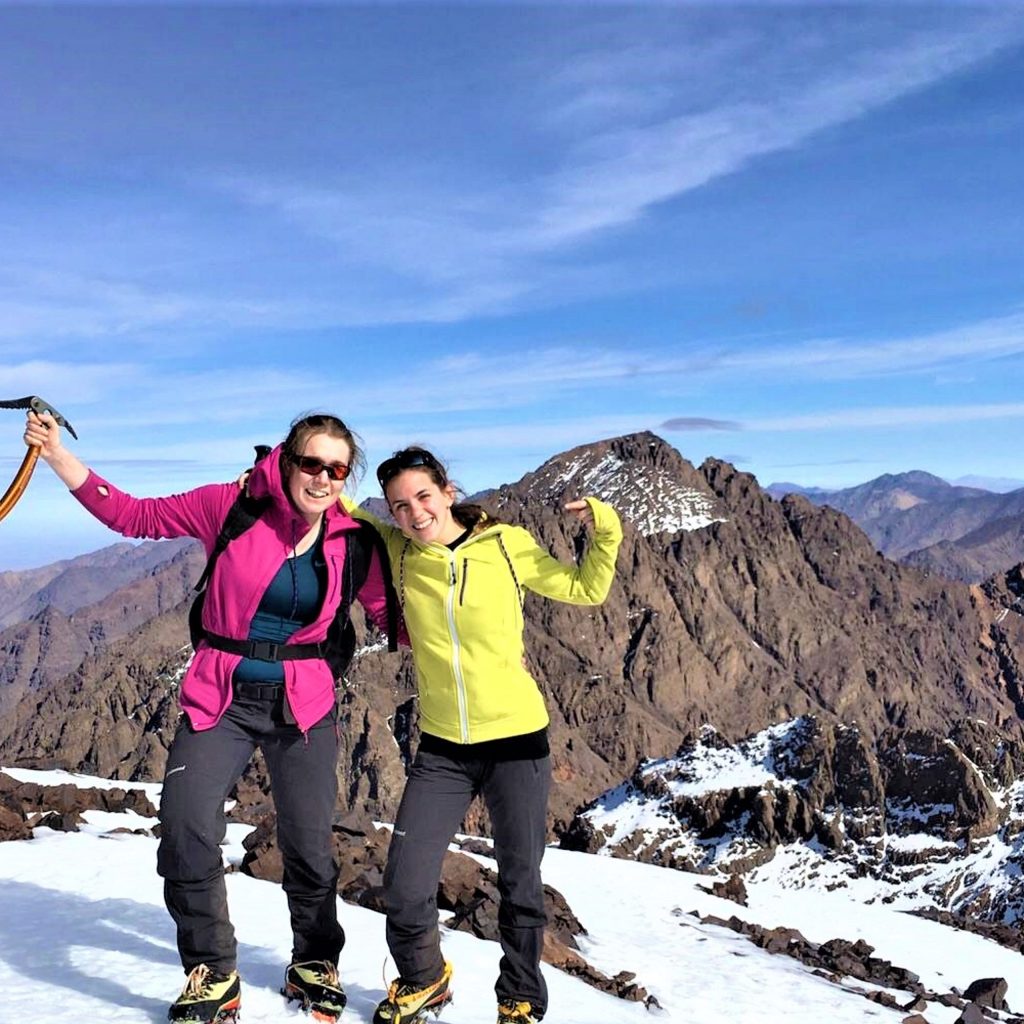
The Imlil valley Route is taken by the majority of visitors because it much easier and have 3 phases
The First Phase: From Imlil Valley 1340 meters to Chamharouch 1506m of ascent most of the route is normal and easy.
The Second Phase: From Chamharouch to the Refuge 3207 here you will stop for lunch which will be prepared for you. After, you will carry on walking uphill to the refuge where you will spend the night. It will take around 5 to 6 hours walk. The road here is not that difficult also very easy.
You will feel like you have accomplished half of the adventure when you arrive in the refuge, where you will meet other travelers from different countries. After dinner, we recommend preparing your gear before starting the journey to the summit.
There are two Mount Toubkal Refuges. There is Les Mouflons and Cabine Alpine Fancais (CAF). The Les Mouflons is named after a deer (Mouflons) found in the Atlas Mountains. Cabine Alpine Francais is also called the “Neltner”, named after Mr. Louis Neltner, a geologist, and mountaineer. You are able to book both refuges online in advance.
The Refuges’ are by no means luxury, but they do the job. They are dorm style and have shared bathrooms.
It is always a good idea to bring some snacks of your own, as the Refuges offer very basic food. Take advantage of your time in Marrakech and purchase some delicious dried fruits and nuts.
If the weather is good and you have camping equipment, it is possible to camp outside the Refuges.
- Thermal baselayers (temperatures decrease in higher altitudes)
- Lightweight waterproof jacket
- Fleece jacket or warm jumper
- Trekking trousers and shorts in Summer
- Good trainers for valley treks / to wear after a days hiking
- Mid-weight hiking boots
- Lightweight thermal or fleece gloves
- Sunhat/warm hat
- Head torch and spare batteries – the summit push usually happens before sunrise!
- Personal lock (for unattended bags)
- Water purification tablets or water filter
- Trekking Poles
- 4 season sleeping bag (winter), or light 3-season sleeping bag (summer)
- Water bottle
- Soft Sided duffel bag (50-80 liters) – carried by mules. If trekking independently, then a 50-60L backpack.
- Lightweight day pack
Toiletries and First Aid
- Sunblock for body and lips
- Antibacterial hand wash
- First aid kit: antiseptic cream, diarrhea treatment, throat lozenges, painkillers, plaster and blister treatment, hydration salts, insect repellent
Other Items:
- Toilet paper
- Sleeping bag liner
- Therm-a-Rest (cushion for sleeping bag) – optional!
- Pen knife (keep in hold luggage when traveling)
- Repair kit (thread, needle, duct tape)
Winter Trekking Gear
- Ice axe – straight handle (60-70cm)
- Crampons – and hiking boots that can fit crampons
- Waterproof hardshell jacket
- Waterproof, lined trousers
- A warm synthetic or down jacket
- Gloves (inner thin and outer thick pair)
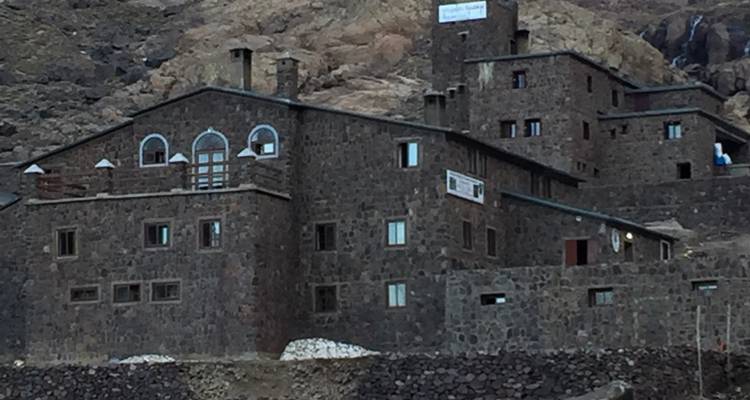
Following dinner, you meet your guide and arrange tomorrow’s starting time
It depends on the season and better. Getting to the summit at the right time is crucial, because if you go early, it will be too cold, and you won’t be able to stay for more than 20 minutes, which means you will miss the sunrise.
The claim of tomorrow feels conformable to you as you sleep early
The Final Phase: From the refuge to the summit , As soon as you wake up early, you eat your breakfast. It’s better not to eat heavy food that will make you dizzy. You take your backpack and water and stuff to take pictures.
You leave the refurege in dark time (in the snow times you have to make your shoes very well in a better and guide gonna help you)and then you listen to your guide advice and step by step because there is an upside there and stones
Having a positive outlook and expectation that you will reach the summit, my advice as a professional guide is to walk slowly at first, but if you see your guide going faster, ask him to slow down. After 30 minutes on the path you will reach a place with a lot of stones. You need to take a few minutes to breathe (3-4 minutes)) When you stop for long periods of time in the winter, your blood will be cold and you need to drink lots of water during the rest time. Then you continue to the path until you reach a point called (Asaghli) where you find a small upside that takes 10 minutes to climb, so I advise you to watch in front of you and be cautious, and then you reach point 2 (Tizi).
Taking a little rest and taking a picture, walking for 10 minute until you can see the summit above you, your feeling now is great and happier.
As you walk toward the edge of the last dangerous challenge place, you must pay close attention and go straight ahead, keeping yourself far from others. Once you pass this place, you finally reach the summit, where you rest and feel like you have won, and you become a successful adventurer.
As a suggestion, if you are taking pictures, stay in the center and see the sunrise with beautiful views. It is available only in North Africa. If you stay on the summit for 10 minutes in the winter and 20-25 minutes in the other months, you will be able to see Ourzazate city and Marrakech’s light.
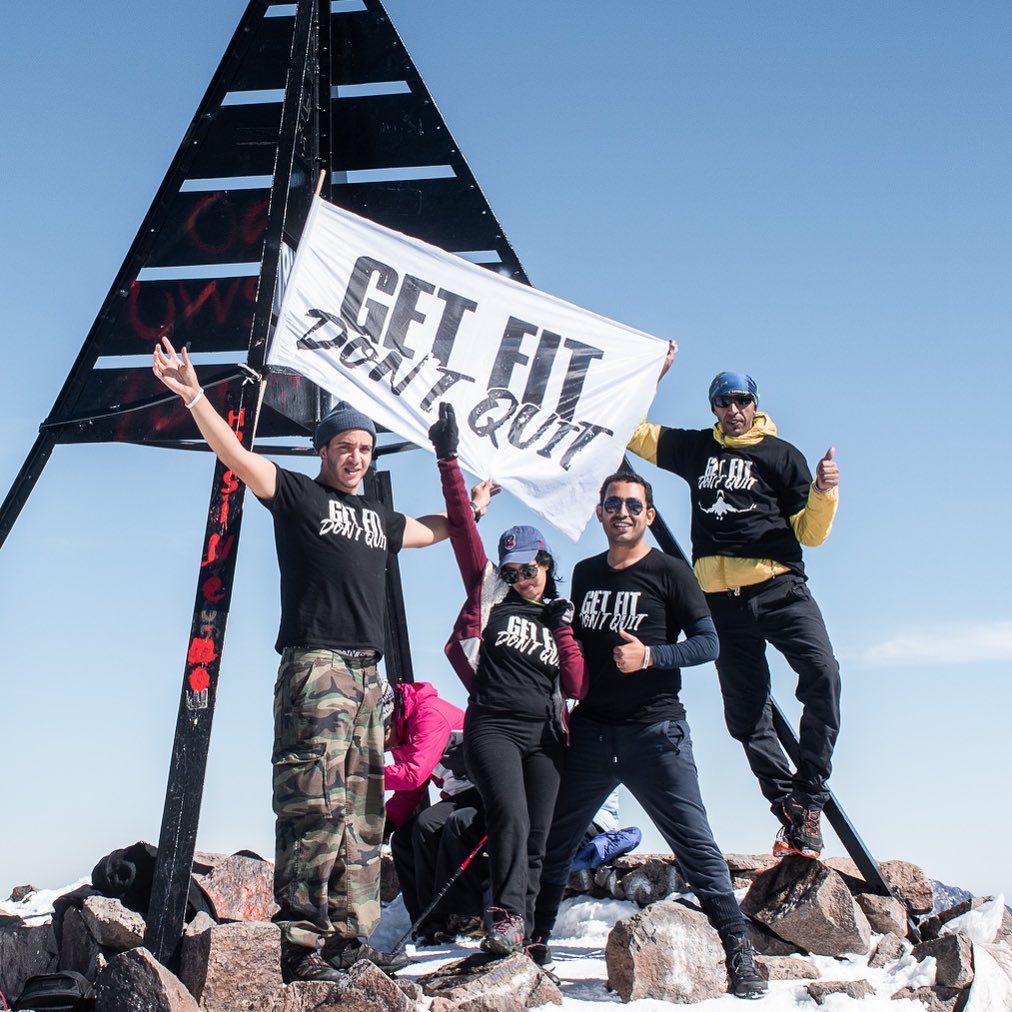
After returning to Tizi Point, there are two routes: there is a nearby place, which is very close to the Refige, but it is much more dangerous. For this reason, we recommend taking the other path, which is a little farther away, but is much safer as the stones don’t fall very often, so you don’t have to pay attention so much. Also, don’t ski because the cold ice is not skateable, so just walk, don’t spend too much time walking.
Then when you arrive at the refuge (9-10am), you rest a little and collect your things. It is best to take a little time to collect your things and then decide if you would like to eat lunch in the refuge or on the trail. Afterwards, you walk through Chamhachoch and drink a Moroccan cup and see the white store, and then you see the path and you feel a good go back feel toward reach hard good but with work everything I’d checked the you arrive art you strategy point and my experience.
Abdel Jalil Azadour
Comment (0), leave a reply cancel reply.
Your email address will not be published. Required fields are marked *

or continue with
Reset Password
Enter the e-mail address associated with the account. We'll e-mail a link to reset your password.
CHECK OUT ALL DESTINATIONS HERE
01769 309007, [email protected], mount toubkal trek.
Hotels, Refuges & Guesthouses
Long Days of Trekking
When you book onto one of our trips you will receive a login to the Vamoos app. This will provide you with all the information you need including countdowns, weather, itineraries, documentation and advice for your trip. Click here for more info
Africa , Morocco , Toubkal
London or Marrakech Airport
10% OFF MOROCCO TRIPS!
Challenge rating
Who said Morocco was all sand, sun and sea? Join us on a Mount Toubkal Trek and you’ll probably see snow too.
If you want to tick a serious mountain off your Bucket List but you’re not the most experienced of climbers just yet, Toubkal is the perfect peak to set your sights upon (and your crampons).
This 4-day trek to the highest peak in North Africa will both challenge and reward you at every turn. On your way to the summit, you’ll learn about Berber life, see some of the most spectacular views on the planet, and test the strength of your calves too.
Experience the unforgettable and discover one of Africa’s most authentic hidden gems as you conquer the majestic Mount Toubkal. (And yes, of course, you’ll get the chance to barter with the souks in Marrakech too.)
What is 'Mount Toubkal Trek' like?
Mount toubkal trek gallery, what's included in our mount toubkal trek.
All Activities Mentioned In The Itinerary
Max 16 Travellers Per Group
3* Hotel, Guest Houses and Refuge (Twin Share)
Private Transport
Porters To Carry 12kg During The Trek
7 Breakfasts, 4 Lunches & 4 Dinners
Expert Guides With You Throughout The Trip
Mount Toubkal Trek Itinerary
Day 1: arrive in marrakech and explore the souks.
ARRIVE IN MARRAKECH AND EXPLORE THE SOUKS You will meet your Bucket List Leaders at the airport and fly out as a group for Bucket Lister + Trips. If you have booked a Bucket Lister Trip we will see you in Morocco soon! If you have transfers with us we will take you to the hotel. For those making their own way, we will see you in Marrakech. Special Information: Your adventure begins with a Welcome Meeting at 6 pm today.
Day 2: FREE DAY IN MARRAKECH AND OPTIONAL HOT AIR BALLOON RIDE
FREE DAY IN MARRAKECH AND OPTIONAL HOT AIR BALLOON RIDE Today we will enjoy a free day in Marrakech. Walk through the colourful souks in search of souvenirs, and visit Jemaa el-Fnaa square, the Bahia Palace and Koutoubia Mosque. Alternatively, you can choose to enjoy an add-on experience, taking a hot air balloon ride from nearby. This is a unique way to see the Moroccan countryside in all its beauty. Before dinner, you will meet with your guide at the Riad for a trek briefing.
Day 3: TRANSFER TO IMI OUGHLAD, TREK TO TIZI OUSSEM
TRANSFER TO IMI OUGHLAD, TREK TO TIZI OUSSEM You will be transferred from Marrakech to Imi Oughlad (1350m). You will then trek to Tizi n’Tacht Pass (2100m) and Tizi Oussem (1800m) where you will sleep overnight at a Berber house.
Day 4: TREK FROM TIZI OUSSEM TO IMLIL
TREK FROM TIZI OUSSEM TO IMLIL In the morning you will trek from Tizi Oussem (1800m) to Tizi Mzik Pass (2489m) and then Imlil (1740m) where you will sleep overnight at a guesthouse.
Day 5: TREK FROM IMLIL TO REFUGE TOUBKAL
TREK FROM IMLIL TO REFUGE TOUBKAL Today you will trek from Imlil (1740m) to Refuge Toubkal (3206m). The route will climb up a river gorge, passing waterfalls, Berber settlements, and mountainside shops.
Day 6: SUMMIT MOUNT TOUBKAL
SUMMIT MOUNT TOUBKAL Trek from Refuge (3206m) to the summit of Mount Toubkal (4167m). This incredible mountain climb affords stunning views over the High Atlas mountains, Anti-Atlas, and even the Sahara desert in the distance. Once we have reached the summit, we then descend via the Refuge to Imlil.
Day 7: TRANSFER BACK TO MARRAKECH
TRANSFER BACK TO MARRAKECH After breakfast we will be picked up from the guest house and driven back to the Riad in Marrakech. Enjoy one last evening in Morocco, eating delicious tagine and drinking a tasty Moroccan mint tea.
Day 8: RETURN FLIGHT TO THE UK
RETURN FLIGHT TO THE UK This marks the end of our Moroccan adventure.
Mount Toubkal Trek Food & Accommodation
3* riad – twin room, berber house- multi share, guesthouse – multi share, refuge toubkal – multi share, our different types of trips, bucketlister trips.
Bucketlister trips are our standard for all our incredible trips. When you book a Bucketlister trip we will organise everything for you from the first to the last location on your adventure and you'll have a local guide with you every step of the way. All you'll need to organise is your own flights and transfers. (Additional Options for Land Only Transfers)
Bucketlister+ Trips
Bucketlister+ trips are a done-for-you service from start to finish. We organise everything for you. You'll have a UK Guide with you all steps of the way and all you'll have to do is just pack you bag. (Additional Options for UK Group Flights & Transfers)
Trailblazer Trips
Trailblazer trips are our first run throughs of our trips. Get the benefits of a Bucketlister+ Trip at the cost of a Bucketlister and all we'll ask for in return is your feedback! For more information click here!
Bucketlister trips are our standard for all our incredible trips. When you book a Bucketlister trip we will organise everything for you from the first to the last location on your adventure and you’ll have a local guide with you every step of the way. All you’ll need to organise is your own flights and transfers. (Additional Options for Land Only Transfers)
Bucketlister+ trips are a done-for-you service from start to finish. We organise everything for you. You’ll have a UK Guide with you all steps of the way and all you’ll have to do is just pack you bag. (Additional Options for UK Group Flights & Transfers)
Trailblazer trips are our first run throughs of our trips. Get the benefits of a Bucketlister+ Trip at the cost of a Bucketlister and all we’ll ask for in return is your feedback! For more information click here!
Mount Toubkal Trek Dates & Availability
Mount toubkal trek reviews.
Here’s what some of our awesome customers had to say:
Jake is the best UK guide for TBLC. He makes every trip fun and it feels like you are going on holiday with an old friend (albeit one who knows his stuff when it comes to first aid, mountain safety and customer care). All of TBLC in country guides are knowledgeable and approachable and I have come away with some good friends from my trips over the years. Toubkal shouldn’t be underestimated, you do need to have a basic level of fitness but TBLC will do all they can to support you on summit night. I’m looking forward to my next trip 🙂 – Amy Oct 2023
Mt Toubkal trip Oct 2023. Information provided before the trip was excellent, especially in comparison with other travel companies I’ve used in the past. It was always super easy to get hold of someone and they were able to help with all my questions, many of which were already answered by information in the Vamoos app! On the trip our guide, Jake, is very experienced and capable and was able to help with all matter of request from our group. I was really impressed with how the needs of each individual were considered and catered for. Due to the earthquake there were some very small adjustments made to our itinerary – this did not at all affect the smooth running of the trip. – Beth Oct 2023
Company was great from start to finish, really friendly team, very clear communication, a pleasure to deal with.
The trip itself was very well organised, all our guides were so knowledgeable and made everything run very smoothly. It was my first trip abroad by myself and to say I was nervous is an understatement but right from the meeting at the airport I felt in good hands due to the confidence and organisation from Jake our UK guide. I will absolutely not hesitate to use them again and have already started planning my next trip! – Emma Oct 2023
Had a brilliant week in really good company which was well organised and led by our very knowledgeable leader jake ,helped by the local guides and workers the 4 day trek to the summit of Mount Toubkal was an amazing and enjoyable experience. The week started wth our arrival in Marrakesh time to settle in then the group met up for a meal and an opportunity to introduce ourselves. The following morning some of us chose to take the opportunity to experience a hot air balloon trip which was amazing and highly recommended. The trek itself was quite testing but with guidance of local guide and leader with the companionship of the group it was very manageable and enjoyable with the bonus of amazing views. We were also well looked after with some really good food and comfortable over night stay ,for me it was a really good experience and i would not hesitate to book another trip in the future with this company, all stages were very planned and executed in a professional manner with safety and welfare in mind – Geriant May 2023
Amazing trip to Mount Toubkal. The BLC fantastic from start to finish. Jake, our guide, was so good. Nothing too much trouble. Highly recommended 👍 – Dave Oct 2023
Mount Toubkal Trek Addons
We've got add-ons just for you....
Supercharge your trip by adding another unique experience!
Duration: 1 | Region: Morocco
Hot Air Balloon Flight
From: £200pp.
Duration: 5 | Region: Morocco
Explore Essaouira
From: £395, mount toubkal trek frequently asked questions, take a look at some of our frequently asked questions for mount toubkal, how hard is mount toubkal (jebal toubkal).
Mount Toubkal is a trekking peak and requires no technical experience (unless you are doing a Winter Trek ). It is certainly achievable by people in a good condition of physical fitness.
Mount Toubkal is 4167m Tall. You can read more about this in our Article ‘How High is Mount Toubkal ?’.
With Mount Toubkal being above 4000m, it is always going to be a challenge. The altitude gain on Toubkal is great, so you need to go slowly and give your body as much time to acclimatise as possible.
You can read more about this in our full Article ‘ How Hard is Mount Toubkal? ’
How Long Does It Take To Climb Mount Toubkal?
Mount Toubkal is climbable in two days and many companies offer this. The general itinerary for a Toubkal trek is to get a transfer from Marrakech to Imlil (1800m) and then start your journey up to the Nelter Refuge at 3207m. You will stay overnight in the Refuge before waking early and starting your climb to the summit (4167m). It takes around 4-5 hours to get from the refuge to the summit of Jebal Toubkal. Once you have summited you head back down the refuge, and then back to Imlil.
At The Bucket List Company we feel this altitude gain over two days adds considerable pressure. So we offer the Toubkal Trek over 4 days. The last two days of the trek are the same as above, but the first two days we head over several high passes giving your body more time to acclimatise to altitude.
When is the Best Time To Climb Mount Toubkal?
The best times to climb Mount Toubkal are April to Early June and then end of September and October. These times offer the best conditions and temperatures. It is very hot during the summer months, so we always advise to avoid these times.
If you want to climb the mountain in winter conditions and use Crampons and Ice Axes then January and February potentially offer the best conditions.
What Equipment Do I Need For Mount Toubkal?
What gear will you need to climb Mount Toubkal? If you are climbing during the trekking season then you will not require any specialist equipment. If you are already a regular trekker in the UK you will already have everything you need for this trip.
You will need a sleeping bag, day pack, duffle bag for kit to be transported in and then your clothing to walk in.
If you are making a winter ascent of Mount Toubkal then you will also need a pair of crampons and a walking axe. You will also need some warmer clothing for the summits.
Is Mount Toubkal Safe?
After the incident in December 2018 the Moroccan government and the National Park changed the way you trek in the region. You can now only trek in the National Park with an authorised Moroccan Guide and you can’t be on your own.
There are now checkpoints on the route where you have to show your passports so the authorities know who is in the National park.
The Berber people are super friendly and we have never felt unsafe in Morocco with our groups.
Mount Toubkal Trek Related Articles
Check out more information on our incredible destinations here...
The Ultimate Guide to Travel Insurance for High Altitude Trekking: Everything You Need to Know

Time to read: 5 Mins
How hard is it to climb mount toubkal.

Time to read: 10 Mins
Mount toubkal kit list.

Best Time To Climb Mount Toubkal

Time to read: 7 Mins
Climb mount toubkal.

Time to read: 4 Mins
How long does it take to climb mount toubkal.

What Will I Eat Whilst Trekking in Morocco?

How high is Mount Toubkal?

Time to read: 15 Mins
How to train for kilimanjaro, everest base camp & toubkal mountains.

Do You Need A Guide To Climb Mount Toubkal?

How Much Does It Cost to Climb Mount Toubkal?

Why Mount Toubkal Should Be On Your Bucket List
Book a private trip.
We offer private trips for those seeking to do their own adventure with friends or family. Fill out our enquiry form below to start planning your dream adventure.
Simply Enter your details to download our free guide to conquering North Africa's highest mountain
- First name *
- Phone This field is for validation purposes and should be left unchanged.
What you Should Know before you climbing Mount Toubkal
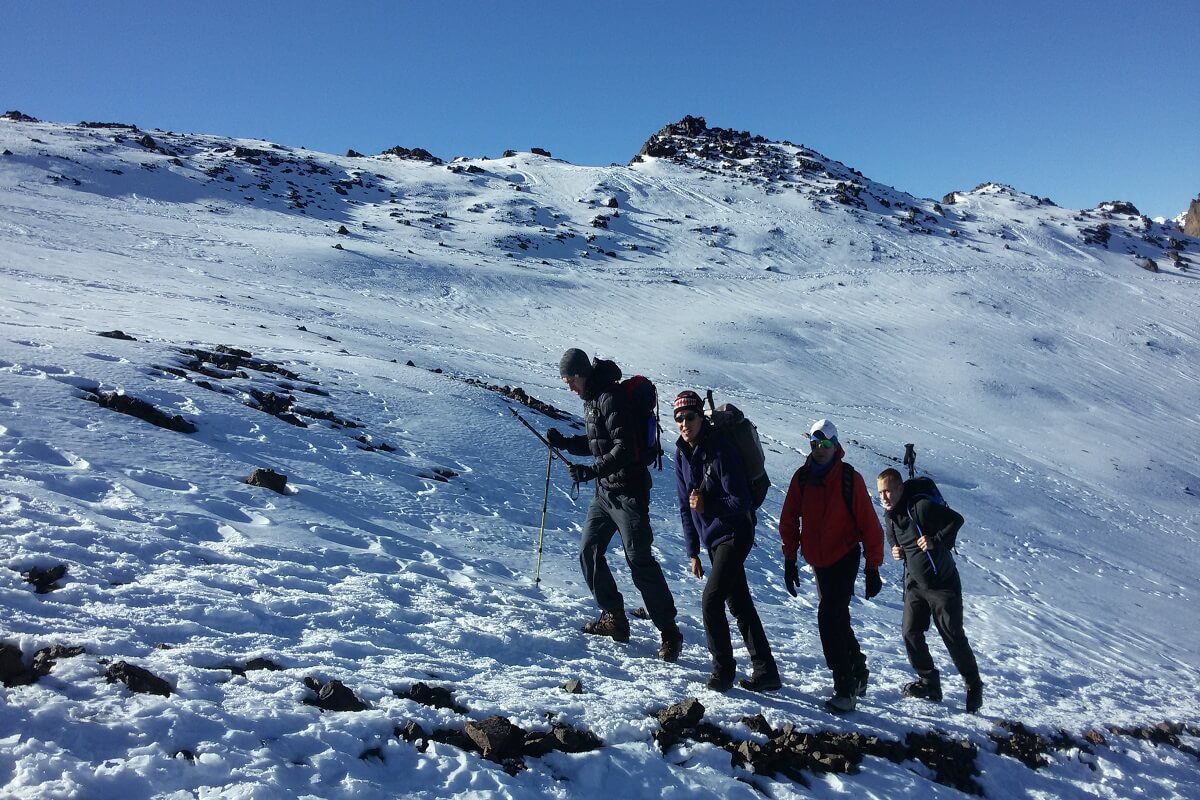
Mount Toubkal Overview
what you should know before you climb Mount Toubkal? Despite the backdrop of the Atlas Mountains, most people would associate Morocco with wandering around the souks, camel rides through the desert and enjoying copious amounts of mint tea. While the latter is true, Mount Toubkal is a peak that isn’t so well known amongst non-mountaineers but stands at an impressive 4,167 metres (13,671 ft) with incredible views of rural Morocco.
Mount Toubkal or Jebel Toubkal is the highest peak in the Atlas Mountains, Morocco, and North Africa. Toubkal is apart of the Atlas Mountain Range and is located in the southwestern part of Morocco, about 60 km south of Marrakesh. it is an ultra prominent peak, the highest for over 2000 km and a popular destination for climbers.
How high is Mt Toubkal?
Jebel Toubkal is not that high, you can definitely leave your oxygen mask at home. It reaches 4167 meters (13,671 ft) above sea level. Although, if you are not aclimatised this altitude can easily make your head hurt. It takes at least 2 days to reach the top of the mountain and get down to the city at the base of the mountain
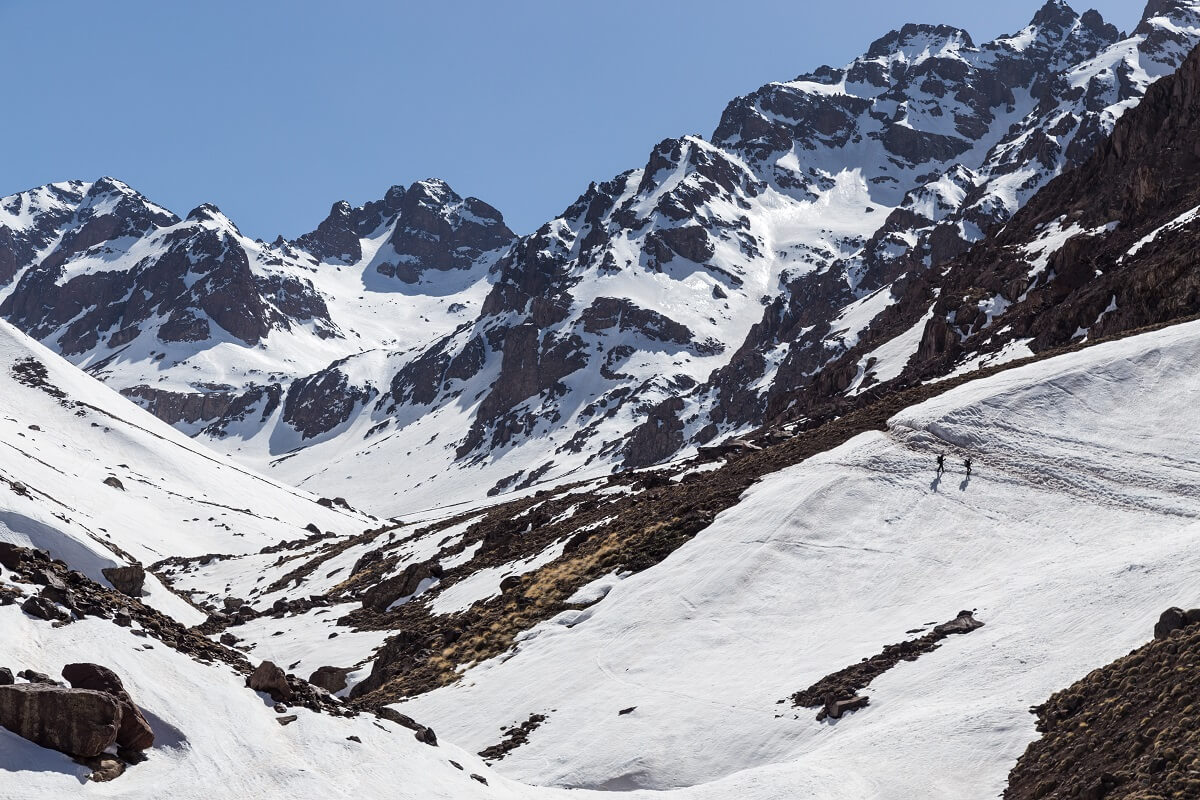
How Long dose it take to climb Mount Toubkal ?
The Mount Toubkal ascent only takes two days , with most of the walking done on the first day.
The first day’s trek takes around 5 hours. You will cover 11km of gentle incline over well-defined paths, with time to take in the scenery as well as to acclimatise at the camp at the end of the day.
‘Summit day’ starts with a slow walk at steep incline before dawn so you can watch the sunrise over the peaks. Total walking time from the camp to the summit and back down again takes around six hours along a windy, scree slope. You’ll continue onto the village of Aremd where you’ll stay in a village house for the night, savouring home-cooked food, warm showers and a bed.
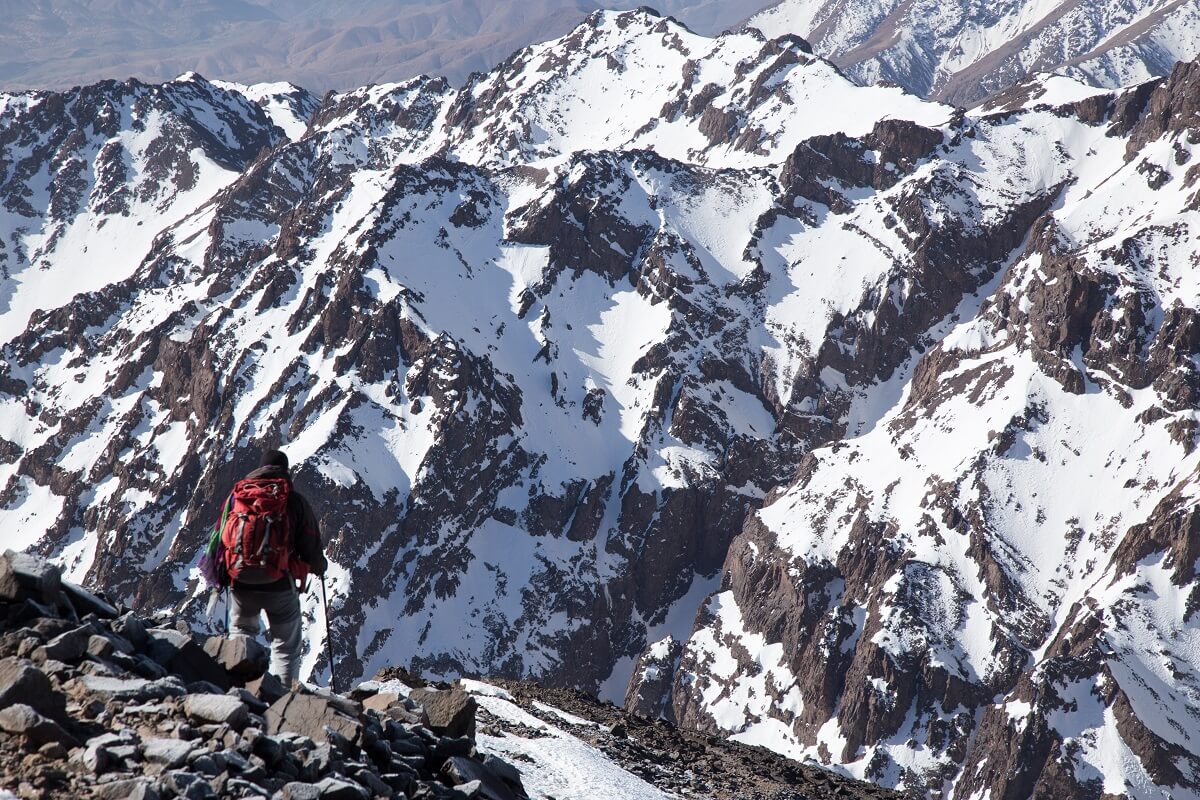
How hard is Mount Toubkal ?
Toubkal (pronounced “tub Kal”) requires no technical climbing and most people in good physical condition should be able to make the climb, so long as they are well prepared. But this isn’t an easy climb! Injuries and even fatalities do happen.
One of the difficulties of Toubkal is altitude sickness. At the peak, you’re only getting roughly 60% of the oxygen that you would at sea level, making altitude sickness a possibility. It’s recommended that you climb the mountain over two days to acclimatise.
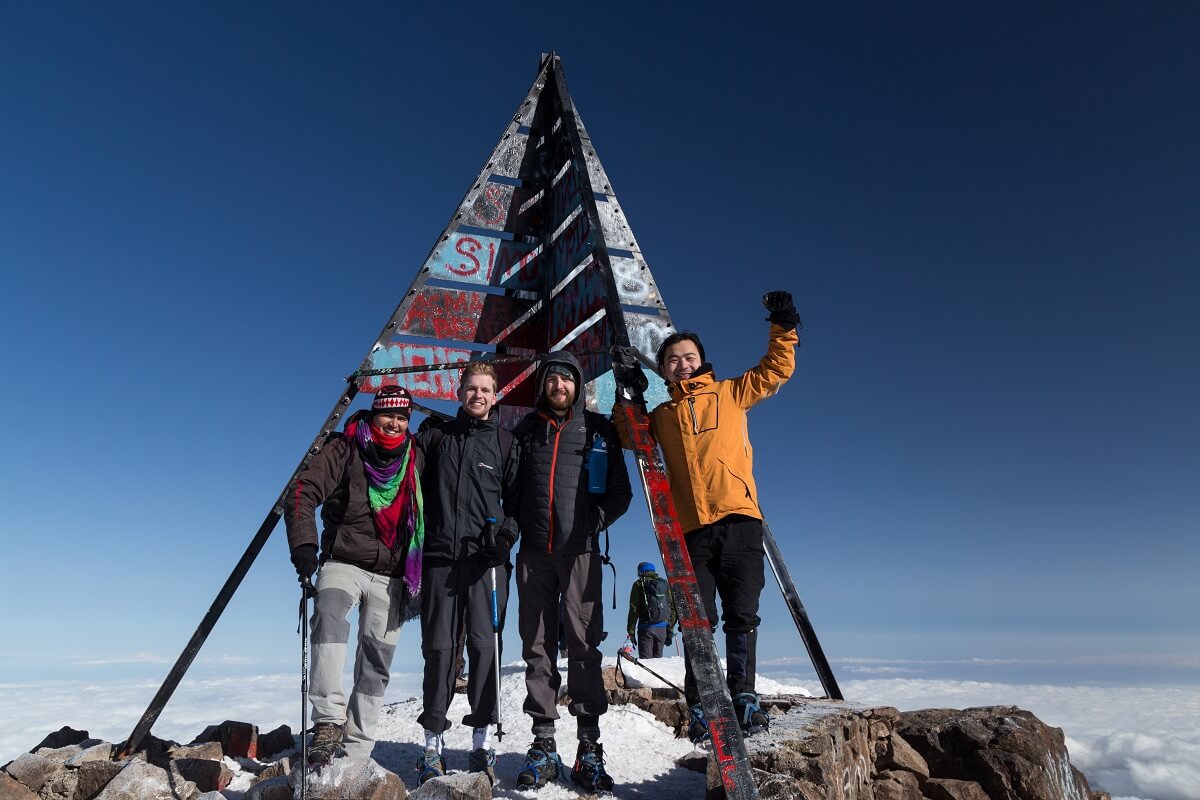
Do I need Crampons for Mt Toubkal ?
Depends when you want to climb the highest mountain in North Africa. If you want to do it in winter time then yes, you might need crampons (although, not necessary). But if you want to do this summit during summer then you definitely not need crampons. For winter climbers if you go to Morocco just with hand luggage it is very easy to rent pair of crampons in Imlil. 2 pairs of crampons and snow protection for 400 dirhams for 3 days.
When should I climb Jebel Toubkal?
Toubkal mountain is open throughout the year. Refuge also. So you can do your summit attempt whenever you want, even in the middle of the winter. If you are professional mountains climber you would want to at least use the crampons, so do it in January-February. Climbing Toubka l in summer is a simple hike at high altitude, there are no technical sections, you do not need ropes or any climbing gear.
Is there accommodation on Mount Toubkal?
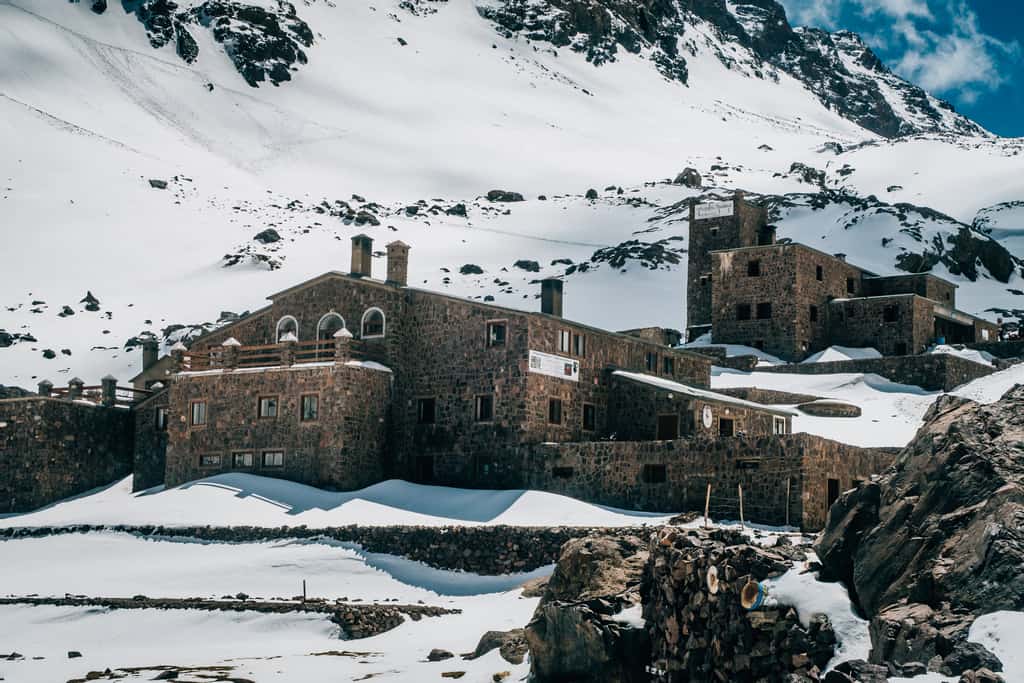
There are two refuges on the climb to Toubkal. They are Les Mouflons and Cabine Alpine Francais (CAF). You can book the CAF Refuge, but there is nearly always space at the refuge when you arrive.
CAF costs 140 Moroccan Dirhams (MAD) per night. That gets you a dorm-style bunk bed (no blankets!). Showers are cold, toilets are lacking toilet paper and soap. The staff are friendly.
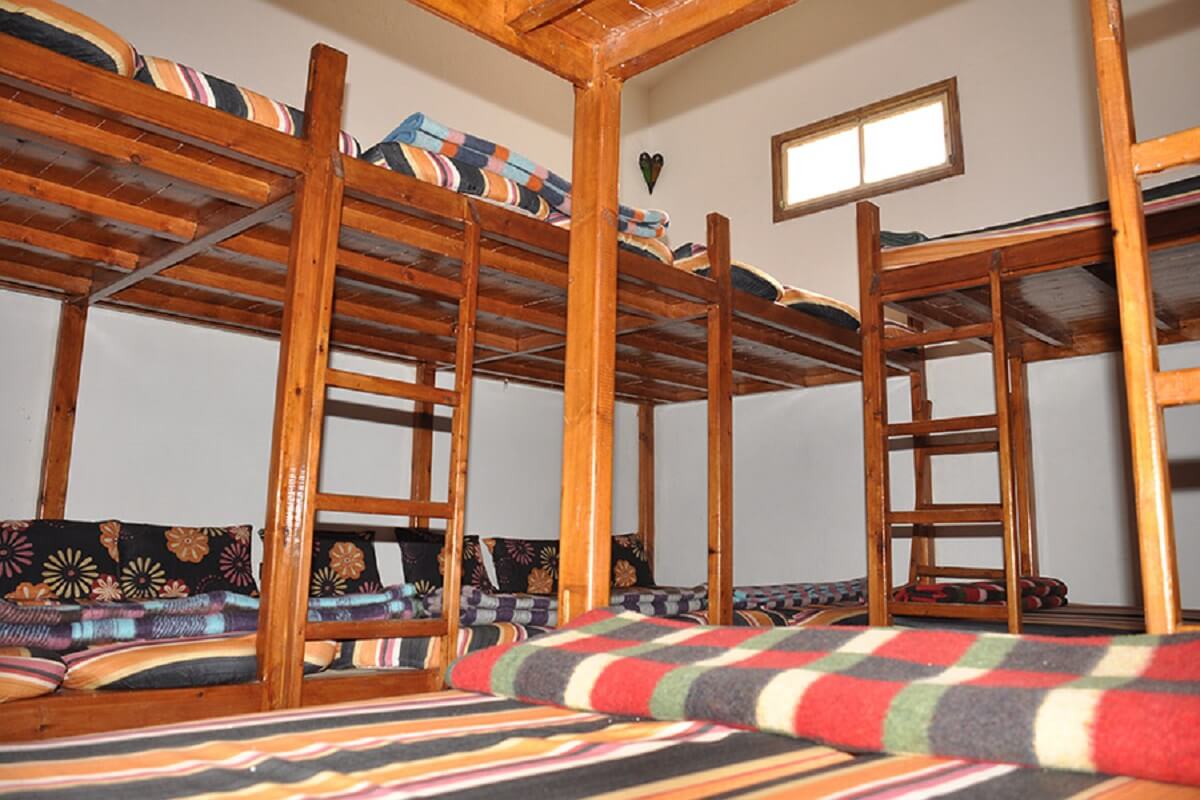
During the low season (winter and spring), there is no need to contact them ahead of time to book your stay there. You can just show up and there should be plenty of room.
I stayed in ” Les Mouflons ” and it cost me 280 MAD for the night with dinner and breakfast included. They have different prices depending on the time of the year.
If you visit Toubkal during the high season (summer and fall), I would suggest contacting the refugees ahead of time just to make sure they will have a bed available. These are the websites where you can contact them ahead of time:
When is the best time to climb Mount Toubkal?
T he best time to climb Mount Toubkal is in the spring (April or May) or the autumn (September or October). We climbed Toubkal during September. There was no snow or ice on the mountain at this time of year.
Climbing Mount Toubkal in the summer is difficult due to the heat (June, July and August). Climbing Mount Toubkal in the winter is much more dangerous due to the snow and ice (November, December, January, February and March).
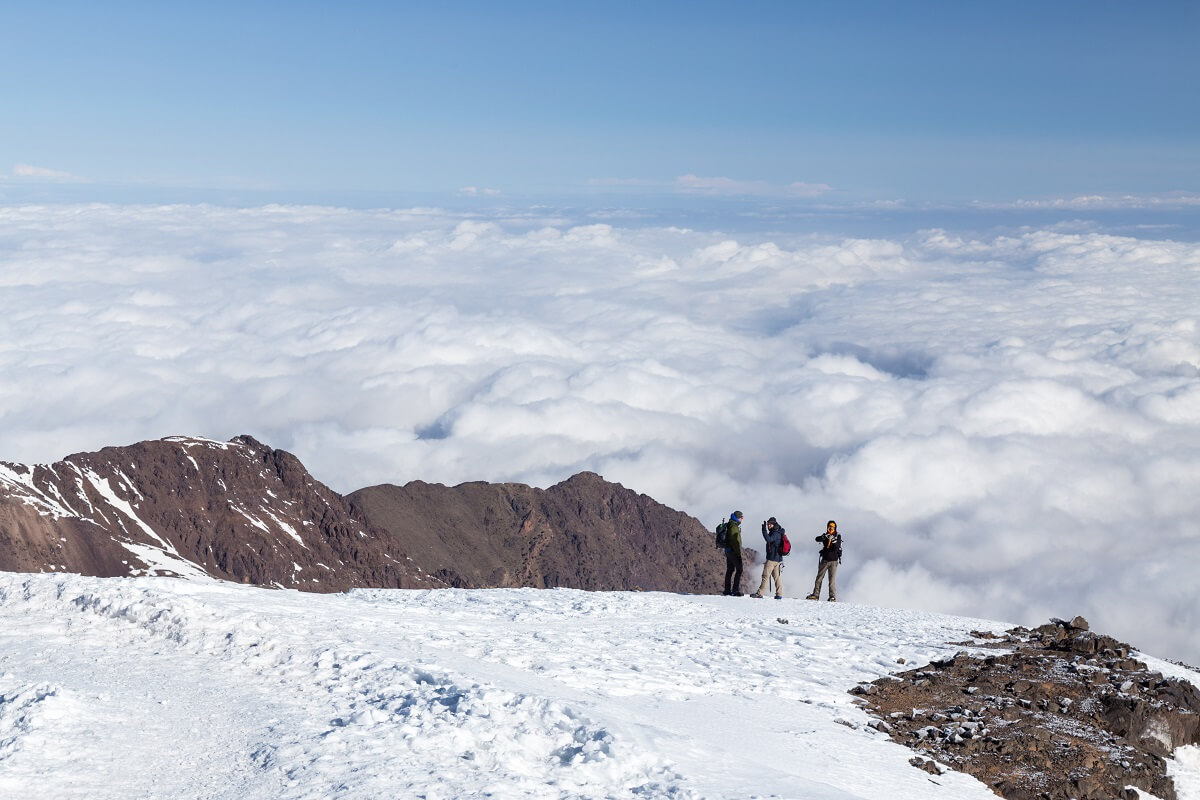
What to Expect on the Trail To Mount Toubkal ?
Most Toubkal trekking itineraries are usually about three days in length. They tend to start in the village of Imlil and head up into the mountains from there. The early stages of the trek are easily managed, with only a slight, gradual rise in altitude. The day 1 route passes through another village or two along the way, and it is not uncommon to encounter vendors along the path who are selling food and drinks too. The trail is very easy to follow and offers little in the way of challenge.
After about four or five hours of hiking you’ll reach the CAF Refuge, your campsite for the nights spent on the mountain. The Refuge can be crowded depending on how many other hikers are on Toubkal, but generally speaking, it is a relaxing place to get some sleep prior to summit day.
The next morning you’ll launch your attempt on the summit at about sunrise. The second day brings more challenging trekking with steeper trails and rock-filled scree fields. It takes about three to four hours to reach the top, which is marked with a colorful, pointed tripod. On a clear day, the views from the peak can be very nice, but oftentimes, high winds can blow dust and sand into the air, obscuring even other mountains in the Atlas Range.
After spending some time at the summit, you’ll head back down. The descent tends to be faster, requiring only two or three hours, but tired legs can make the hike a surprisingly difficult one. Loose scree can make for precarious footing at times, but trekking poles can prove invaluable for keeping your balance.
Once back at the Refuge, some trekking groups will elect to continue back to Imlil, completing the climb in just two days. Others will spend another night at the campsite before proceeding down the following day, which helps to break up the trek to a degree.
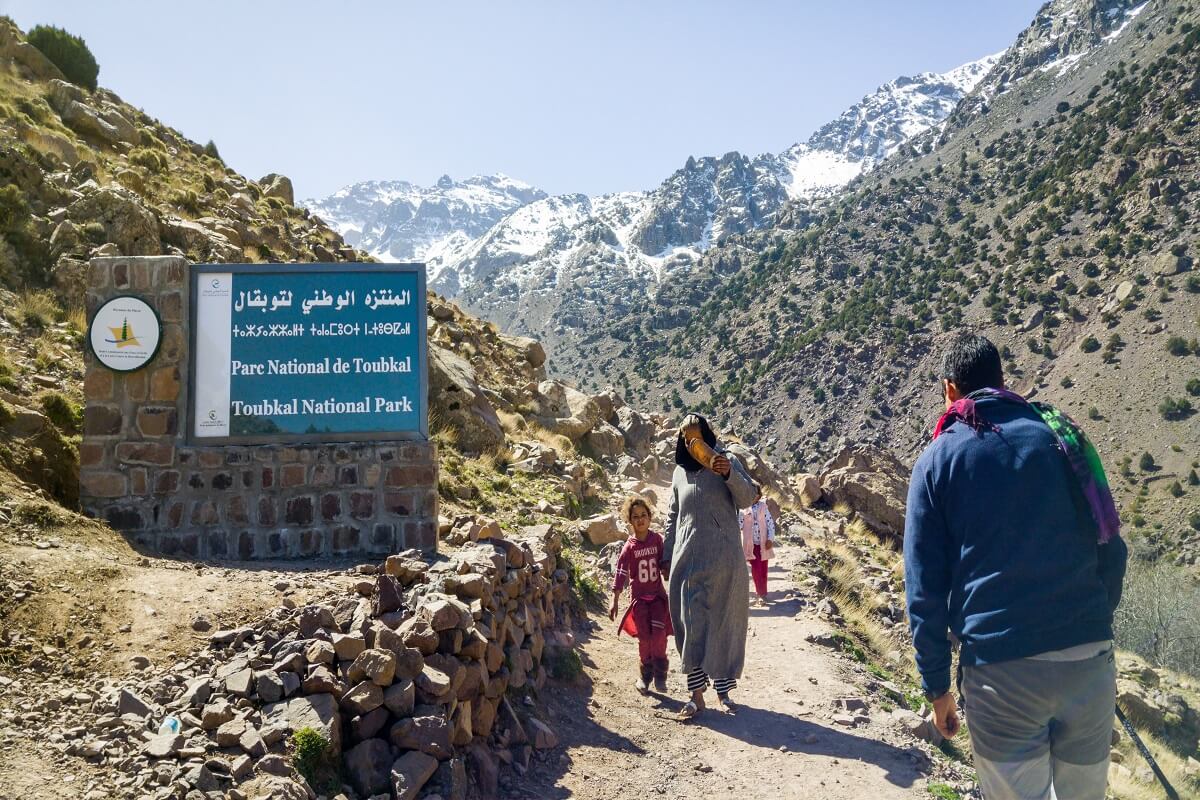
After the crime of Shamhruch .. prevent the climb to Mount Toubkal unless these conditions are met
The most important of which is the need to provide the national card for Moroccans and the passport for tourists in four inspection areas that were established along the road leading to Mount Toubkal. In addition to the number of days the visitor will spend in the area and Mount Toubkal, and the places he will visit. All those wishing to use a tour guide familiar with the terrain, in order to accompany them on their trip to avoid any problems may be encountered. Among the other measures described as extreme, the tents were not allowed to be installed in the park until a permit was obtained by the local authorities. In a related context, was also prevented to go to the area of Toubkal after 3 pm, where was prevented many people who tried to climb the summit of Mount Toubkal during the past days
2024 Updates
- every group should be accompanied by a local guide, and the new thing is the size of a group for one guide is 6 people
- Working with meteorological data from November 1st to the end of March. that means that if the weather is not good they have the right to stop people of going up
- Maintaining the prohibition decision through the Armad passage instead of the Toubkal shelter whenever bad weather conditions call for it
How much does it cost to hire a guide for the Mount Toubkal Trek?
Prices for guides to Mount Toubkal vary a lot. I
f you hire one with the “Office of Mountain Guides of Imlil”, you’ll pay a bit more. You will, however, benefit from having a guide that is experienced in mountain rescue and knows how to administer cpr.
Their prices also include transfers to and from Marrakech in modern safe vehicles, fully qualified English-speaking mountain guides, private cooks who prepare delicious full meals on the trail and porters and mules to carry your bags.
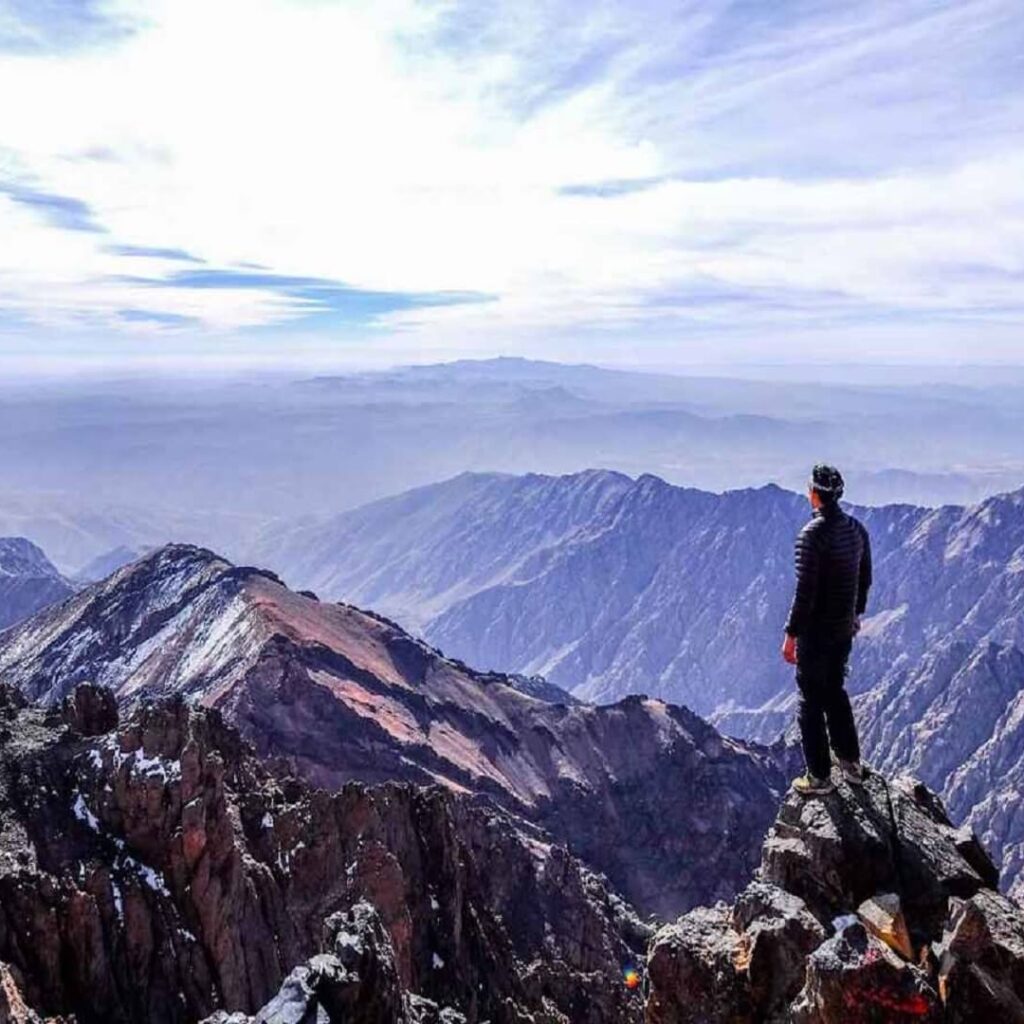
On their website , they offer an interesting selection of short day trips and longer multiple-day treks for a wide range of prices.
Tips make you brilliant at mountain climbing
Some see mountaineering as an unnecessary sport, while others see it as the best example of endurance, sacrifice and challenge. Despite the many risks that can kill a climber, many people love it and find it an amazing way to endure the darkest and most dangerous situations. So if you’re planning to climb a mountain and explore it yourself, here’s a set of tips to help you achieve your goals.
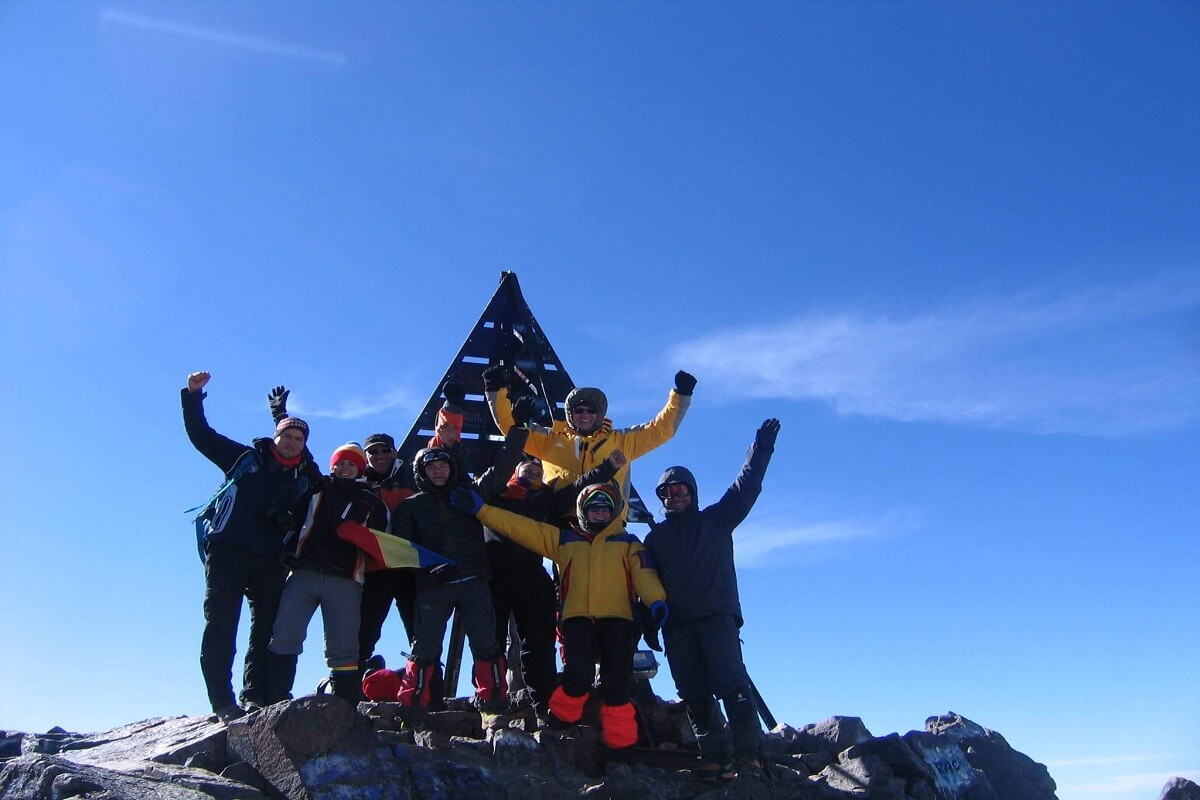
1.Make a thorough search for the right places to climb and read about the skills and experiences of mountain climbers so that you are not exposed to a difficult situation. You need to know the equipment needed to complete the task and read the observations of your predecessors.
2.Mountain climbing depends primarily on your mental and mental abilities before physical ability, so you should know that you may be at risk at any moment, and here you should act quickly and rationally because a second may cause your life to end, or a disaster. To develop mental abilities, is to see the observations of your predecessors in this sport as mentioned in the previous point
3. Before going to climb the mountain, you must undergo a long workout that helps you raise your fitness level and provides you with the means you are looking for to perform the adventure in a perfect way without muscle strain or cramps while you are half way through, A halt in the middle of the road means the inability to complete the journey up or return to the starting point again.
4. Before you climb any mountain, you will need many equipment, often expensive. You have two options. Either buy your own equipment or rent it, but you should buy completely new equipment so that you can choose the things you need to suit your weight and body.you can rent almost everything in Imlil if you don’t want to carry your own
5. There is a lot of mountains in remote parts of the world, and climbing can be a bit unpopular for local people to maintain their original state or because there are no local facilities to save you. If it comes out of control.
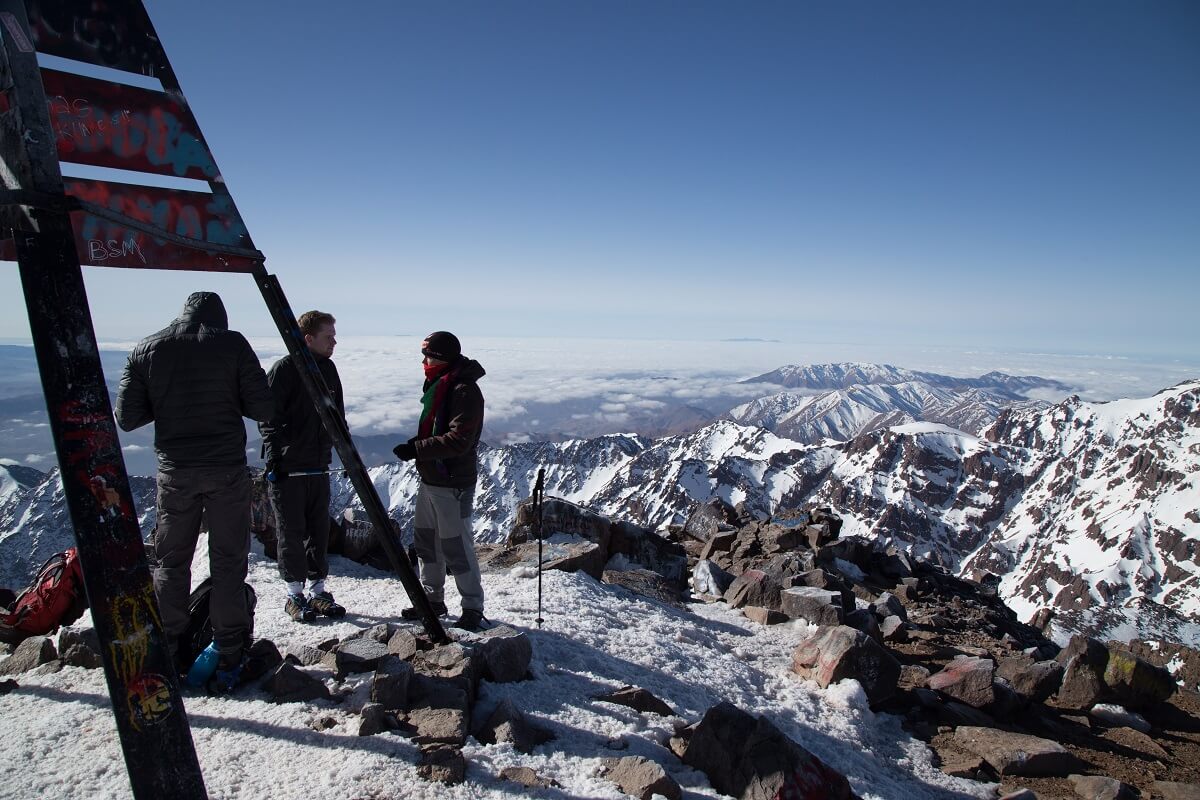
6. In your first experience of climbing a mountain, do not perform the task alone, but try to be with someone who has experience in this area, so take advantage of his guidance on terrain and weather, places where you should take a break, rugged terrain or moving rocks that do not prefer to approach Of them so as not to slip your body.
7. Continue your training and climb simple areas alone such as icebergs or volcanoes. This will help you increase your skill and address new experiences that you lack.
8. Join the mountain climbing club in your area so you can get reliable information about the areas you want to visit, learn about the experiences of your predecessors there, how they were able to finish their mission, what obstacles they faced and how to overcome them.
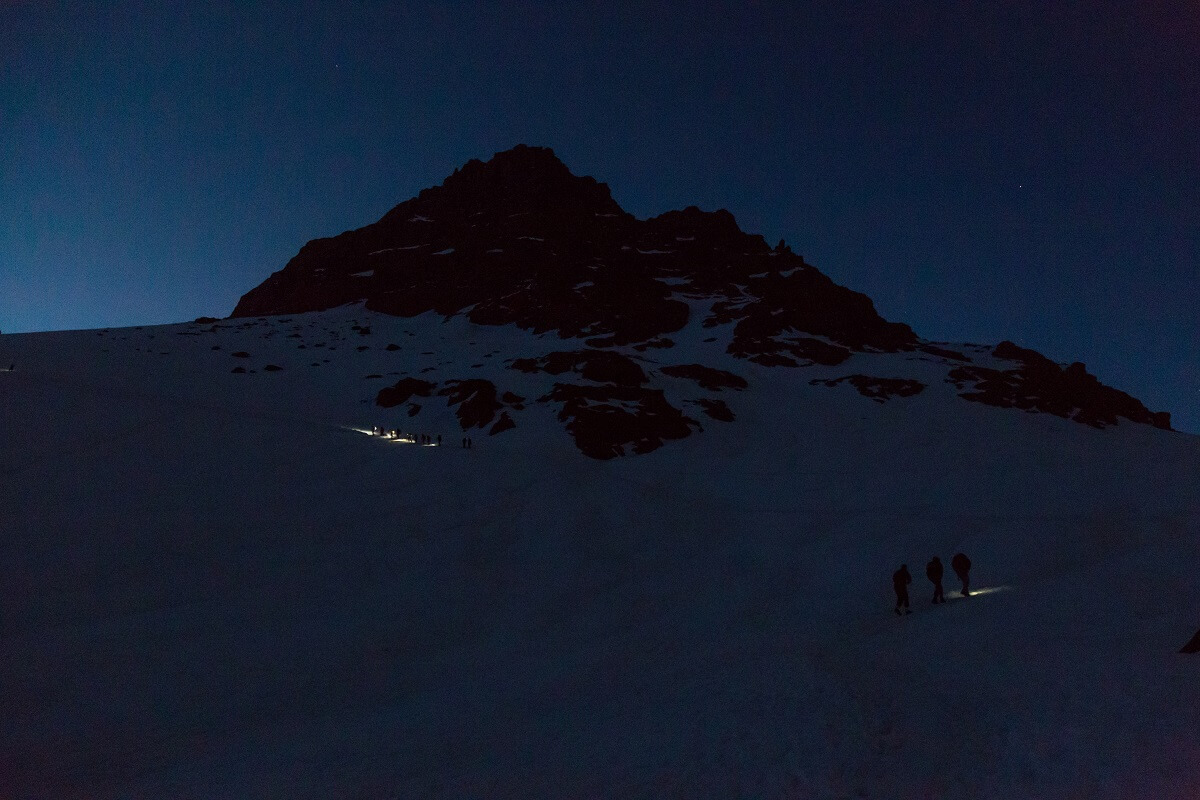
9. Get ready to travel to the nearest area where you have mountains, and start preparing your luggage and equipment because you will stay there for a relatively long period that may last for more than a week and make sure you bring with you everything you need, either equipment or first aid just enough time to try climbing the mountain .
10. The climb from the top of the mountain is not as easy as you imagine, so do not try to land quickly or without paying attention to the route you take, Many of the accidents were caused by the landing rather than the climb, as the vast majority of mountaineers are concentrating their energies on climbing up the mountain.
10 Tips Get You To The Summit Of Mount Toubkal
- Tip 1: There are many ways to climb Toubkal – Choose the option that suits you best
- Tip 2: A good preparation is half the job. Train for climbing Mount Toubkal!
- Tip 3: Be aware of the symptoms of altitude sickness when you climb Mount Toubkal.
- Tip 4: Be aware of the best season for climbing Mount Toubkal
- Tip 5: Prepare for a hellish night in the Refuge, and blissful nights in the rest of Morocco’s accommodations
- Tip 6: Don’t be a cheapskate: Tip your guide and porters who make climbing Mount Toubkal possible
- Tip 7: Your ultimate packing list for climbing Mount Toubkal
- Tip 8: Adapt to and respect the local culture around Mount Toubkal
- Tip 9: Book your Mount Toubkal ascent with a reliable trekking company
- Tip 10: Be lucky with your travel companions before your Mount Toubkal climb. Inshallah.
Use local Company services
If you don’t have time for all this training and you still want to climb mount Toubkal we recommend to Use one of the Local travel Companies. ClimbingToubkal is the Best in the domain. We have been organizing Treks to the Top for more than 10 years. 98 per cent make it to the Summit For more information please contact Us [email protected]
Whatsapp: 00212662859967
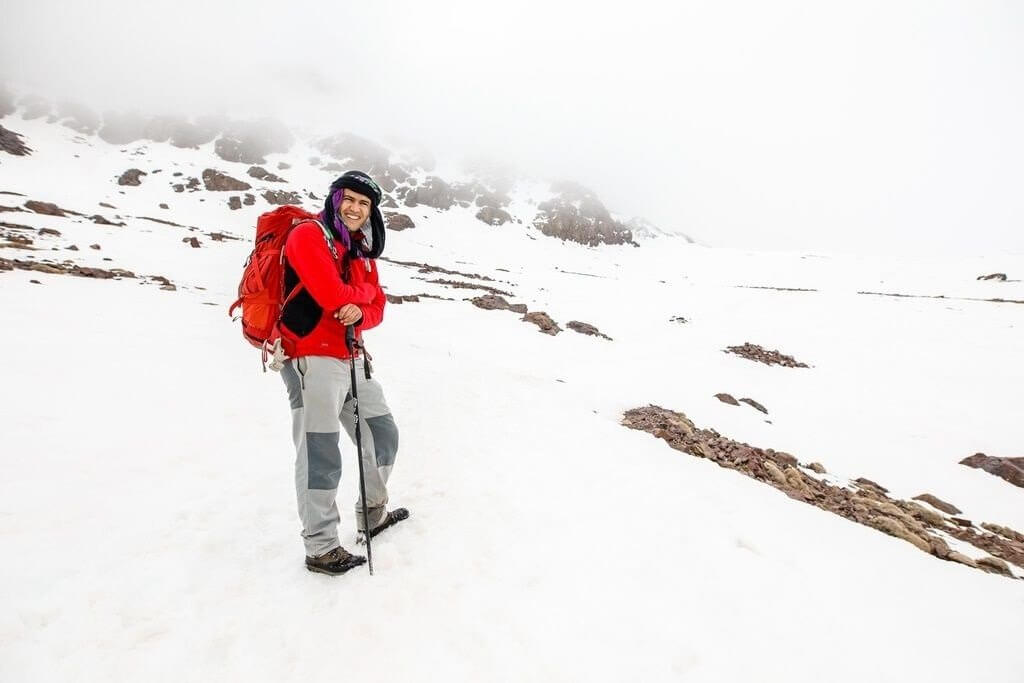
9 thoughts on “What Should know before you climb Mount Toubkal”
Thanks for the article i heard that is obligation to take a guide,? i been there many times i don’t think i need one
Thanks for the wonderful tips It really helps Amazing
I would like to do circle trek starting from imlil Is it possible this time of year?
Beautiful country
Nice country to go trekking i will come one day
Very useful information, thank you for sharing, the question that I couldn’t find the answer for is: is it possible to camp before you get to the Basecamp
Pingback: 100 National Parks Around the World - RV Lyfe
Pingback: 100 Must-Visit National Parks Around The World - Freedomroads Open Kitchen
Pingback: Trekking In Morocco Atlas Mountains | Hiking Tours In The Moroccan Atlas Mountains
Leave a Comment Cancel Reply
Your email address will not be published. Required fields are marked *

Climb Mount Toubkal with Team Toubkal!
👊 who are team toubkal.
Team Toubkal was established by the founder of Africa’s foremost high altitude expedition organisers, Team Kilimanjaro , after receiving reports that many climbers were failing to summit Team Toubkal because of inadequate understanding by local organisers of safe and thorough acclimatisation procedures.

The Problem
In the dangerous pursuit of (false) economy, there has effectively been a race to the bottom of the market amongst Toubkal trek organisers, claiming that it is possible to trek the mountain in just 2-3 days. And while it is indeed possible to do this, Team Toubkal don't recommend this course of action, for the following two reasons:
Learn more about Team Toubkal 👉
🥾 Climbing Toubkal Successfully
Over the past 17 years with Team Kilimanjaro we have witnessed non-TK climbers failing to summit, due to how little effort they’ve spent considering the most important factors that contribute to summit success on a climb: Route selection and acclimatisation strategy.
After receiving reports from our Team Kilimanjaro clients that climbers were failing to summit Toubkal because of inadequate understanding of safe and thorough acclimatisation procedure we had to go see for ourselves.
With this in mind, Team Kilimanjaro founder John has used his 17 year experience to plan routes for Toubkal.
Learn why you're more likely to summit with Team Toubkal 👉
📅 Best time to climb?
The best time to climb Mount Toubkal in Morocco is during the summer months from June to September when the weather is generally mild and dry, and the routes are free of snow. The peak season is July and August when the conditions are at their best, but it can also be crowded.

During the winter months, from November to April, the mountain is covered in snow, and the trekking routes are more challenging and require technical skills and equipment. However, it can be a good option for experienced mountaineers who want to experience a more demanding ascent.
For more information on ❄️ Toubkal weather
💵 Cost to climb?
This depends on your group size, support level and any upgrades you may request.

See our detailed Toubkal climbing cost 👉
But apart from the actual price of the climb which only covers your costs within Morocco, there are additional costs that you'll need to be aware of...
🤔 How much money do you need to climb Toubkal?
We believe that a life well-lived is all about what you do, not what you have.
So, yes, climbing Toubkal is an investment, but one well worth taking.
When budgeting for a trek, then, you’ll also need to consider the following costs. These are very approximated and will differ depending on whether you’re flying in from the US, UK, South Africa or Australia.
- Training for Toubkal
- Flights to Marrakech International Airport
- Clothing and equipment for Toubkal
- Visa for Morocco
😱 Can you climb Toubkal without a guide?
No. The rules now require you to be escorted by a local guide to the summit and back. There are check points on the route where you would require your passport and Guides identification.
👥 Can you climb Toubkal without porters?
Yes! If you are willing to carry your own equipment the rules state that you need only have a guide, plus assistant guides for larger groups, in case the party has to fragment - since the authorities do not permit visitors to the mountain to be unaccompanied during any period of movement. If you require more assistance Mules are also used in Morocco.
🧭 Best route
Embark on an unforgettable adventure with our carefully curated route at Mount Toubkal, a breathtaking and formidable mountain in Morocco. Renowned for its beauty and challenges, Mount Toubkal offers a truly unique experience for outdoor enthusiasts. As you plan your ascent, it becomes paramount to carefully consider your level of experience and the time you can allocate to this endeavour. Our expertly designed route ensures that you not only conquer the majestic summit but also do so in a manner that aligns seamlessly with your capabilities and schedule.

Learn more about the 6 routes Team Toubkal has to offer 👉
⏱️ How long does it take to climb Toubkal?
There is no minimum time frame for climbing Toubkal, depending on the route you choose to trek. These are our current minimum timings for each route - including time spent descending:
In spite of having no minimum trek lengths, we recommend that climbers spend 5 days ascending and descending unless they are already acclimatised from a recent high altitude trek completed within 3 weeks prior to their Toubkal climb.
Check out our blog page for more information on how long it takes to climb Toubka l 👇

🗺️ Toubkal Map
Navigate the breathtaking landscapes of Toubkal with ease using our interactive Google map featured above. Immerse yourself in the beauty of the Atlas Mountains and discover hidden gems along your journey. For those seeking a more detailed tracking experience, we recommend exploring the terrains with our recommended trekking map, available through the provided Amazon link below.
🏃♀️ Preparing to Climb
So, you've decided to climb Toubkal but want to know what you need to do to prepare? It's very straightforward. There are just five simple steps:
- Book your climb. We recommend you do this as early as possible so you're committed and there's no more room to dither and make excuses! It only takes a deposit of GBP 150 to secure your place and you can do this by card, quickly and painlessly 😉. Just ask us for a card payment link.
- Start buying your equipment. You don't need to buy everything on Day 1, but we strongly recommend you get your day sack and hiking boots early, so you can break them in, identify any possible problems, and remedy them when you still have plenty of opportunity to look at options. Check out our recommended kit list where we offer suggestions on specific items and where you can download a printable PDF Packing List.
- Start training! Although we do get a few last minute bookings, if you have time to do so, we recommend starting your training 3 months before you plan to climb. If you're ready to get started right now, download our 12 Week Training Plan. And if you don't like following training plans, just try to do three cardiovascular sessions per week or 30 minutes or more, and two 5-8 hour endurance sessions in the hills with 10-12 kg of weight.
- Book your flights to Marrakech International Airport (RAK). While we don't necessarily recommend booking your flights many months ahead of travel, it's worth looking at flight prices early so you can get a feel for the price trend and buy when fares are cheapest. Check out our flights page where we review 7 fight comparison sites and offer our recommendations on how to find the cheapest flights to Toubkal.
- Get your Moroccan visa. We recommend obtaining your visa ahead of travel so you don't have to queue on arrival. We offer step-by-step guidance on how to apply for your Moroccan visa online, so it's really simple to do this.

🧬 How fit do you have to be to climb Toubkal?
When we recommend that you book your climb at least 3 months in advance and commit to our 12 Week Training Plan, we don't want you to think that climbing Toubkal is only possible for super-fit people . That's definitely not the case and over the years we've assisted many people to the summit who would admit they were in bad shape and didn't find time to train.
The main reason we want our climbers to train is simply because they'll enjoy the experience so much more and remain far more alert to the incredible natural beauty around them.
😓 How hard is it to climb Toubkal?
When we say you don't have to be super-fit, it may then sound like a contradiction when we go on to say that for many, many trekkers we're told that reaching the summit is the hardest thing they've ever done in their lives . And this description is certainly not limited to those who didn't train. We have received similar comments from professional athletes.
Actually, high altitude is a great leveller. While it is obviously helpful to be fit and while the greatest advantage you can give yourself is to shave off any unneeded body weight during the build-up to flying out to Morocco, the last 500 vertical metres to the summit are a very difficult challenge for everyone and should not be underestimated.

👮🏾♀️ Current COVID-Related Visitor Requirements
Morocco has recently lifted the COVID-19-related state of emergency, and as a result, the country has relaxed its travel restrictions. Travellers are no longer obliged to present a COVID-19 vaccination certificate or a negative COVID-19 (PCR) test upon entry to Morocco, including maritime travel. These measures have been implemented to encourage tourism and support the economy.
The government of Morocco has been making significant strides in controlling the spread of COVID-19. The relaxation of travel restrictions will undoubtedly stimulate Morocco's tourism industry, which has been severely impacted by the pandemic.
While the situation remains unpredictable, Morocco has shown its willingness to adapt to the changing circumstances and support travellers. It is always advisable to keep abreast of any new developments in the country's travel regulations to ensure a smooth and hassle-free journey.
⛰️ Mount Toubkal Facts
Mount Toubkal is located in the High Atlas Mountains of Morocco and is the highest peak in both the Atlas Mountain range and North Africa.
What's the closest airport to Toubkal?
The closest airport to Mount Toubkal is Marrakech Airport (RAK).
How high is Toubkal?
Mount Toubkal is the highest peak in the Atlas Mountains and has an altitude of 4,167 metres (13,671 feet).
Does it snow on Toubkal?
Yes, it does snow on Mount Toubkal, especially during the winter months from December to February.
Can a beginner climb Toubkal?
Climbing Mount Toubkal can be challenging, but it is definitely possible for a beginner with proper preparation, training, and guidance. It's important to note that while it is not a technical climb, it is a high-altitude trek that requires a good level of physical fitness and mental preparation.
Why is Toubkal famous?
It is the highest peak in North Africa: Mount Toubkal stands at an elevation of 4,167 metres (13,671 feet), making it the highest peak in North Africa.
Why is there snow on Toubkal?
High altitude: Toubkal is the highest peak in North Africa, with an elevation of 4,167 metres (13,671 feet) above sea level. At this altitude, temperatures are generally lower than at lower elevations, and this makes it more likely for precipitation to fall as snow.
Do you need oxygen to climb Toubkal?
Oxygen is generally not needed to climb Mount Toubkal, as the mountain does not have a high enough elevation to cause severe altitude sickness or require supplemental oxygen. However, climbers should be aware that the altitude can still affect them and should take the necessary precautions to acclimatise to the elevation.
How cold is Toubkal at the top?
During the winter months from December to February, temperatures at the summit can drop below freezing, with average temperatures ranging from -10°C to -20°C (14°F to -4°F).
During the summer months from June to August, temperatures at the summit can range from -5°C to 5°C (23°F to 41°F). While this may seem relatively mild, it's important to note that the mountain can still experience sudden changes in weather, including storms and strong winds, which can make it feel much colder.
What animals live on Toubkal?
Mount Toubkal and the surrounding areas are home to a variety of wildlife species, including: Barbary macaque, Barbary stag, Atlas mountain viper, Atlas mountain fox, Barbary ground squirrel, Barbary sheep Golden eagle, and North African hedgehog. Overall, Mount Toubkal and the surrounding area are home to a diverse range of wildlife species that have adapted to the mountainous terrain and semi-arid climate of the region.
What does the name 'Toubkal' mean?
The name "Toubkal" is derived from the Berber language, which is spoken by the indigenous people of North Africa. The exact meaning of the name is not entirely clear, but it is believed to be a combination of two Berber words: "toub" and "kal". "Toub" is thought to mean "toe" or "fingers", while "kal" means "snow" or "ice". Together, the name Toubkal is often translated as "the peak with the snowy finger" or "the peak with the snow on top".
Mount Toubkal is an important part of Berber culture and is considered a sacred site by many local communities. The mountain has played a significant role in the history and mythology of the region, and it continues to be an important symbol of the Berber people and their way of life.
When was Toubkal first climbed?
The first recorded ascent of Mount Toubkal was made in 1923 by a French expedition team led by General Hubert Lyautey. The team included the French mountaineers Vincent Berger and Adolphe Tuck, as well as several Berber guides. The expedition marked the beginning of mountaineering activity in the High Atlas Mountains, and Toubkal quickly became a popular destination for climbers and hikers from around the world.
Who was the fastest person to ascend Toubkal?
The fastest known ascent of Mount Toubkal is currently held by Spanish athlete Kilian Jornet, who climbed the mountain and descended in just 2 hours and 5 minutes on 17th October 2013. Jornet is a world-renowned mountain athlete who holds multiple speed records for climbing some of the world's most challenging peaks. His feat on Toubkal is particularly impressive, as the mountain is known for its rugged terrain and unpredictable weather conditions. Jornet's record-breaking climb has inspired many other climbers and athletes to test their limits on Toubkal and other mountains around the world.
✔️ Quick Reference - Page Contents
🎬 ready to climb.
So if you're ready to climb Mount Toubkal or would like some advice or guidance on how to plan your expedition to the most exciting and hospitable country in Africa, then don't delay! Get in touch with Team Toubkal today.
APRIL SALE: Book now and get up to 60% off!
Toubkal Tours & Trips
Find the right tour package for you through Mount Toubkal. We've got 103 trips going to Mount Toubkal, starting from just 2 days in length, and the longest tour is 11 days. The most popular month to go is May, which has the most tour departures.
103 Mount Toubkal tour packages with 431 reviews
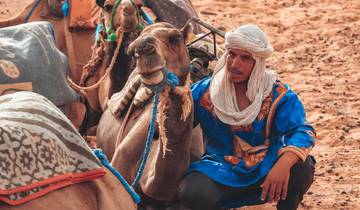
- Hiking & Trekking
- Mountain Hikes
Climb Mt Toubkal
my time with G-Adventures on the mt toubkal trek was superb. the guide omar was fantastic and i had a great time.
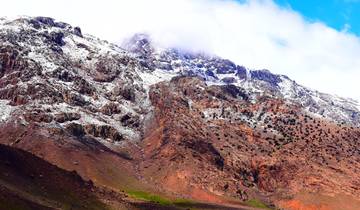
- Christmas & New Year
Toubkal Trek (3 days)
Yousouf was the best guide I could have asked for. He was patient, helpful and made sure we were all doing ok. Gave us enough time to rest, carried our bags and made sure we got to the top of Toubkal and back safely. Thank you, Yousouf
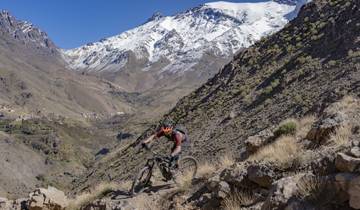
- Mountain Bike
Mountain Biking in the High Atlas
Mountain biking was a great adventure for us during our visit of Moroccco. It was an extremely terryfying and challenging. However, we had an amazing experience riding through amazing trails while enjoying the beauty of the Moroccan landscape. We explored the Berber villages and experienced their culture.I'm a foodie--so the best part was eating the delicious typical Berber food. As much as we were pretty tired, it was such an amazing biking experience from Trek In Morocco.
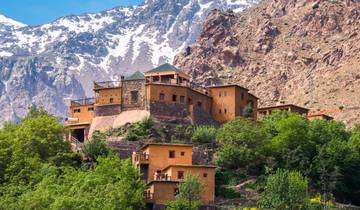
Mount Toubkal Weekend Trek
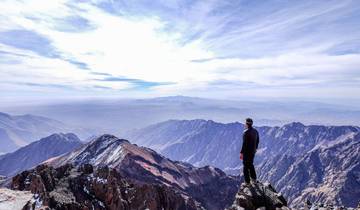
Toubkal Climb
The whole experience was excellent. My only comment is that the quality of food served greatly exceeded my expectations and this could be a real selling point (compensation for the unavoidable basic accommodation in the remote mountain areas). I would recommend emphasising this more in your marketing.
- 10% deposit on some dates Some departure dates offer you the chance to book this tour with a lower deposit.
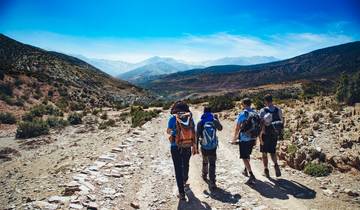
5-DAY TREKKING IN THE ATLAS MOUNTAINS
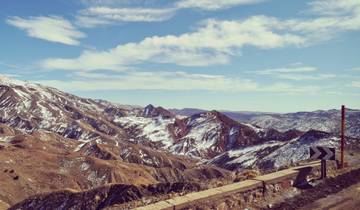
5-Day Moroccan eBike Adventure: Explore the Beauty of Morocco on an Unforgettable Journey
I recently had the pleasure of going on the 5-day Atlas Mountain Biking Adventure, and words cannot capture the sheer magic of this journey. As someone who seeks travel experiences beyond the ordinary, this tour exceeded every expectation, offering a transformative blend of culture, nature, and genuine connections. From the vibrant pulse of Marrakech to the tranquil embrace of the Atlas Mountains, every moment was thoughtfully curated. The biking routes through non-touristy regions unveiled landscapes that felt untouched and pure. Small tracks led us through a maze of Berber villages, each a gem with its own unique story and warm hospitality. The absence of 4x4 transfers allowed for an authentic connection with the surroundings. Pedaling through the High Atlas mountains, the ever-changing scenery, from rugged peaks to lush valleys, left me breathless. The journey wasn't just a physical adventure; it was an immersion into the heart of Berber culture. Accommodations were carefully selected, offering a genuine taste of local life. Guesthouses, homestays, and hotels provided comfort and authenticity, creating a perfect balance. The tour's strong points, from the quality of the course to the unusual encounters with locals, showcased the dedication of the organizers. The daily distances and elevations were well-managed, ensuring a challenging yet achievable experience. The tour wasn't just about the thrill of biking; it was about making a meaningful impact through charity tourism. Engaging with the local community in activities like cooking, music, photography, and art added depth to the adventure. In conclusion, the Atlas Mountain Biking Adventure is more than a tour; it's a life-changing experience etched into my heart forever. To fellow travelers seeking a journey that transcends the ordinary, I wholeheartedly recommend securing a spot on this extraordinary adventure. Let the rhythm of your heartbeat align with the pulse of Morocco's breathtaking terrain.
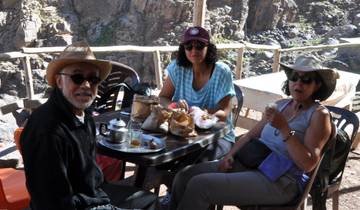
Toubkal Hiking Tour from Marrakesh
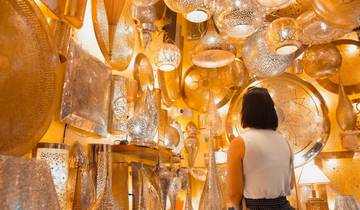
- In-depth Cultural
Marrakesh Red Nights 4 Days
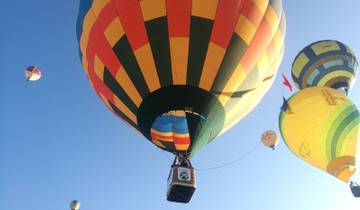
Long weekend in Marrakech: Atlas Mountains with outdoor activities & Marrakech sightseeing
This was a truly remarkable adventure, guided by a phenomenal professional. The tour encompassed a rich and varied selection of captivating sites within and beyond Marrakech, with a carefully crafted schedule to guarantee leisure time before flying out. Additionally, there were numerous additional experiences to choose from, each flawlessly arranged, like the breathtaking hot air balloon ride, thrilling quad biking and the luxurious glamping dinner. Overall, a spectacular experience that I'll never forget!
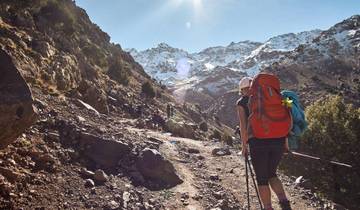
Toubkal Climb - Long Weekend
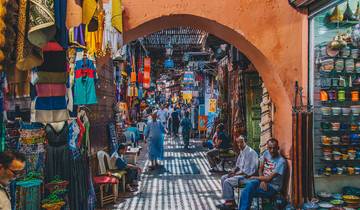
Mount Toubkal Long Weekend Trek
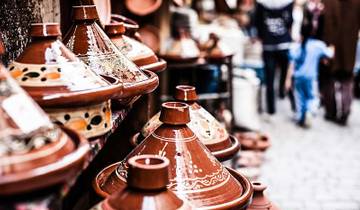
Mt Toubkal Climb
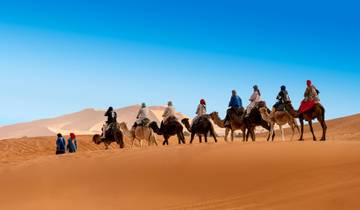
Dessert Tour from Marrakech 4D/3N
We booked the private tour and it was one of the best experiences of our lives. Very diverse stunning landscapes across the Atlas to then end in the dunes of Merzouga. Hamza, our driver, really made this a unique adventure that I would recommend to anyone.
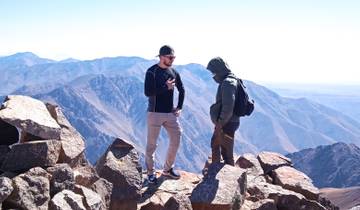
5 Day Private Trekking Adventure | Atlas Mountains - Mt Toubkal SUMMIT
Absolutely wonderful. Mostapha was extremely efficient and his interest was personal not just professional. Despite the complications due to covid 19 issues, he adjusted my programme and I had a simply marvellous time.
What people love about Mount Toubkal Tours
The trek was very well organized and our guide was outstanding. I really recommend this tour.
Hammit, the hostel contact person and Mohammed, the tour guide for hiking, they are very nice and accommodate all my needs. The food is very delicious. The trek is not easy. I did it very slow. But Mohammed toom very good care and was patient. I was glad to join the tour although I'm the only person in the tour. I don't have to worry the transfer from and back to Marrakesh because the tour included.
Mountain biking was a great adventure for us during our visit of Moroccco. It was an extremely terryfying and challenging. However, we had an amazing experience riding through amazing trails while enjoying the beauty of the Moroccan landscape. We explored the Berber villages and experienced their culture.I'm a foodie--so the best part was eating the delicious typical Berber food. As much as we were pretty tired, it was such an amazing biking experience from Trek In Morocco.
Mount Toubkal Destinations:
- Jebel Toubkal Trek (23)
Mount Toubkal Tours starting in:
- Marrakesh (66)
- Hiking & Trekking (61)
- Family (55)
- Fully Guided (52)
- Personalized (50)
- Partially Guided (46)
- Private (42)
- Active (34)
- In-depth Cultural (25)
- Explorer (14)
- Small Group (50)
- 3 Day Tours (16)
- 7 Day Tours (45)
- 10 Day Tours (12)
- Spring 2024 (65)
- Summer 2024 (64)
- Fall / Autumn 2024 (68)
- Winter 2024 / 2025 (52)
- Spring 2025 (38)
- Summer 2025 (30)
- Fall / Autumn 2025 (29)
- Winter 2025 / 2026 (16)
- April 2024 (53)
- May 2024 (66)
- June 2024 (63)
- July 2024 (59)
- August 2024 (59)
- September 2024 (65)
- October 2024 (60)
- November 2024 (52)
- December 2024 (50)
- January 2025 (39)
- February 2025 (33)
- March 2025 (27)
- April 2025 (27)
- May 2025 (32)
- June 2025 (30)
- July 2025 (26)
- August 2025 (25)
- September 2025 (27)
- October 2025 (23)
- November 2025 (19)
Other Regions in Morocco
- Sahara Desert (416)
- Central Morocco (290)
- Atlas Mountains (161)
- Northern Morocco (153)
- High Atlas (152)
- Atlantic Coast Morocco (41)
- Jebel Toubkal Trek (35)
- Southern Morocco (8)
- Erg Chebbi (7)
Travel Styles
- Budget (33)
- Singles and Solo (60)
- For Couples (13)
- Seniors (36)
- Tailor Made
Climb Mount Toubkal
Trek through the atlas mountains to see sunrise from north africa’s highest peak.

Climb Mount Toubkal plus Marrakesh - 4 Days
- Marrakech to Marrakech
- Age range: 18 - 85
- Group size: 30

Independent: Toubkal and Sahara Adventure - 8 Days
- Age range: 12 - 70
- Group size: 50

Climb Mount Toubkal - 3 Days
- Marrakesh to Marrakesh
- Age range: 18 - 90

Toubkal Climb - Long Weekend - 5 Days
- Age range: 16 - 79
- Group size: 16

Mount Toubkal Trek - 7 Days
- Age range: 15 - 99
- Group size: 12

Climb Mt Toubkal - 7 Days
- Age range: 12 - 100

Mt Toubkal Climb - 8 Days
- Age range: 16 - 99

Toubkal Climb - 7 Days
Speak to our team.

Call or email our expert team to find out more and help with ideas and planning.
Trekking Mount Toubkal: Conquer North Africa's Highest Peak
Welcome to The Adventure People, specialising in trekking holidays. Are you ready to embark on an exhilarating journey to conquer Mount Toubkal, the highest peak in North Africa? Our guided treks to Mount Toubkal offer an unforgettable experience filled with stunning landscapes, cultural encounters, and a sense of achievement. Let us guide you through this SEO-optimized content to provide you with all the information you need for an epic Mount Toubkal trek.
Trekking Mount Toubkal: Mount Toubkal is nestled in the majestic Atlas Mountains of Morocco and stands tall at an impressive 4,167 meters (13,671 feet) above sea level. It presents an exciting challenge for outdoor enthusiasts and adventurers seeking to test their physical and mental limits. Our guided treks ensure a safe and rewarding experience, allowing you to focus on the journey while we take care of the logistics.
Highlights of the Mount Toubkal Trek:
Summiting North Africa's Highest Peak: Standing on the summit of Mount Toubkal offers breath-taking panoramic views that stretch across the Atlas Mountains and beyond. It's an awe-inspiring moment and a testament to your determination and resilience.
Diverse Landscapes: Trekking Mount Toubkal exposes you to a diverse range of landscapes, including rugged mountain trails, picturesque valleys, ancient Berber villages, and serene alpine meadows. Each step unveils a new and captivating vista.
Berber Culture and Hospitality: Encounter the rich Berber culture as you interact with local communities along the trek. Immerse yourself in their warm hospitality, savour traditional Moroccan cuisine, and gain insights into their way of life.
High Atlas Scenic Beauty: The High Atlas Mountains boast stunning natural beauty with snow-capped peaks, cascading waterfalls, and terraced fields. It's a photographer's paradise and a nature lover's dream.
Choosing the Right Trek: We offer a variety of Mount Toubkal trek options to suit different preferences and fitness levels. Whether you are an experienced trekker or a novice adventurer, our knowledgeable guides will tailor the trek to match your abilities and interests. From shorter itineraries to more challenging routes, we have the perfect option for you.
Preparing for the Trek: To make the most of your Mount Toubkal trek, it's important to prepare physically and mentally. Regular cardio exercises, endurance training, and hiking practice will help you build stamina and strengthen your muscles. Additionally, familiarize yourself with the gear and clothing essentials required for the trek, ensuring you have the right equipment to stay comfortable and safe throughout your journey.
Join Us for an Unforgettable Adventure: Embarking on a guided Mount Toubkal trek is an incredible opportunity to push your limits, connect with nature, and create lasting memories. Our experienced guides, local expertise, and attention to detail ensure a seamless and enriching trekking experience.
So, are you ready to conquer Mount Toubkal? Choose our travel agency for an unforgettable adventure to the summit of North Africa's highest peak. Contact us now to plan your Mount Toubkal trek and embark on a journey that will leave you with a sense of accomplishment and awe-inspiring memories that will last a lifetime.
When is the best time to trek Mount Toubkal?
The best time to trek Mount Toubkal is during the spring and autumn seasons, which offer the most favourable weather conditions for a successful and enjoyable trek. Here's a breakdown of the seasons and their characteristics:
Spring (March to May):
- Mild temperatures during the day, ranging from 10°C to 20°C (50°F to 68°F), making it comfortable for trekking.
- Blooming flowers and lush greenery, creating a picturesque landscape.
- Fewer crowds compared to the peak summer season, allowing for a quieter trekking experience.
- Possibility of some rainfall, so it's advisable to pack appropriate rain gear.
Autumn (September to November):
- Mild temperatures during the day, ranging from 10°C to 20°C (50°F to 68°F), similar to spring.
- Generally dry and stable weather, providing excellent visibility and clear views of the surrounding mountains.
- Vibrant autumn colours, particularly in late October and early November, adding to the scenic beauty of the trek.
- Popular season for trekking, but still less crowded compared to the summer months.
It's important to note that while spring and autumn are considered the best times to trek Mount Toubkal, weather conditions can be unpredictable in mountainous regions. It's advisable to check the weather forecast before your trek and be prepared for sudden changes in weather, including colder temperatures and occasional snowfall at higher elevations.
Summer (June to August) can also be a viable option for trekking Mount Toubkal, but it tends to be the busiest season. Daytime temperatures can reach 25°C (77°F) or higher, especially in lower elevations, making the trek more challenging due to the heat. However, if you can handle the warmer temperatures and are prepared for larger crowds, summer can still provide a rewarding trekking experience.
Winter (December to February) brings extremely cold temperatures and heavy snowfall to the region, making the trek significantly more challenging and suitable only for experienced trekkers with proper mountaineering skills and equipment.
Ultimately, the best time to trek Mount Toubkal depends on your personal preferences, level of comfort with varying weather conditions, and availability. Spring and autumn are generally recommended for a balance of favourable weather, manageable crowds, and scenic beauty.
How difficult is it to climb Mount Toubkal?
Climbing Mount Toubkal is considered moderately challenging, and the difficulty level can vary depending on various factors such as your fitness level, previous trekking experience, and the route you choose. Here are some key aspects to consider when evaluating the difficulty of climbing Mount Toubkal:
Altitude: Mount Toubkal is the highest peak in the Atlas Mountains, reaching an elevation of 4,167 meters (13,671 feet). The altitude can pose challenges, including reduced oxygen levels and the potential for altitude-related symptoms. Adequate acclimatization and proper pacing are crucial to minimize the risks associated with high altitude.
Steep Terrain: The trek to the summit of Mount Toubkal involves ascending steep and rugged terrain, particularly during the final stages of the climb. This requires good leg strength, endurance, and balance. Some sections may involve scrambling over rocks, so having basic rock scrambling skills can be beneficial.
Duration and Distance: The typical duration for a Mount Toubkal trek is around 2-3 days, depending on the route and the pace of the trek. Each day involves several hours of walking, including uphill and downhill sections. Being prepared for long days of trekking and having the stamina to sustain the effort is important.
Weather Conditions: Weather conditions in the Atlas Mountains can be unpredictable, with temperatures ranging from hot during the day to cold at night, especially at higher elevations. Be prepared for temperature variations and potential weather changes, including strong winds, rain, or even snow in the winter months.
Remote Environment: Mount Toubkal is located in a remote area, and facilities along the trekking routes are basic. The lack of amenities, combined with the rugged terrain and altitude, can make the climb more challenging compared to treks in more developed or accessible regions.
While climbing Mount Toubkal does require a reasonable level of physical fitness and mental determination, it is considered achievable for most individuals with proper preparation and a positive attitude. Engaging in regular exercise, including cardio and strength training, can help improve your fitness level and prepare your body for the challenges of the trek.
It's important to remember that climbing any mountain carries inherent risks, and it's advisable to join a guided trek or hire an experienced guide who can provide guidance, support, and ensure your safety throughout the journey.
Assess your own fitness level, consult with your trekking agency or tour operator, and be realistic about your abilities and limitations. With the right preparation, training, and mindset, climbing Mount Toubkal can be a rewarding and transformative adventure.
How fit do I need to be to climb Mount Toubkal?
Climbing Mount Toubkal requires a good level of physical fitness and stamina. While you don't need to be an elite athlete, it's important to prepare yourself adequately to handle the challenges of high-altitude trekking. Here are some key fitness considerations:
Cardiovascular Fitness: Trekking Mount Toubkal involves long hours of walking uphill, often at high altitudes. Focus on activities that improve your cardiovascular endurance, such as hiking, jogging, cycling, or swimming. Aim to build up your endurance gradually by increasing the duration and intensity of your workouts over time.
Leg Strength and Endurance: Strong leg muscles are essential for tackling the steep and sometimes rocky terrain. Incorporate exercises that target your leg muscles, such as squats, lunges, step-ups, and calf raises. Consider incorporating regular uphill or stair climbing workouts to simulate the conditions you'll encounter during the trek.
Core Strength: A strong core will help with balance, stability, and maintaining good posture while trekking. Include exercises that target your abdominal and back muscles, such as planks, sit-ups, and back extensions.
Flexibility: Flexibility is important for preventing injuries and enhancing your overall mobility on the trek. Incorporate stretching exercises or activities like yoga to improve your flexibility and range of motion.
Mental Preparation: Climbing Mount Toubkal is physically demanding, but it also requires mental resilience. Prepare yourself mentally by setting realistic goals, visualizing success, and developing a positive mindset. Mental preparedness will help you overcome challenges and keep going during difficult moments.
It's advisable to start your fitness training well in advance, ideally a few months before your trek. Gradually increase the intensity and duration of your workouts to allow your body to adapt and build strength over time. If possible, try to include some practice hikes or treks with a similar level of difficulty to Mount Toubkal in order to assess your fitness level and make any necessary adjustments to your training regimen.
Remember to consult with a healthcare professional before starting any new exercise program, especially if you have any pre-existing medical conditions or concerns. They can provide personalized guidance based on your individual health profile.
Being physically fit will not only enhance your enjoyment of the trek but also contribute to your safety and well-being throughout the journey. So, invest time and effort into preparing yourself physically and mentally, and you'll be better equipped to tackle the challenges and make the most of your Mount Toubkal climb.
Is altitude sickness a danger on Mount Toubkal treks?
Altitude sickness, also known as acute mountain sickness (AMS), is a potential risk when trekking Mount Toubkal or any other high-altitude mountain. As you ascend to higher elevations, the air becomes thinner and contains less oxygen, which can lead to various symptoms of altitude sickness. It's important to be aware of this risk and take necessary precautions to minimize its impact. Here's what you need to know:
Understanding Altitude Sickness: Altitude sickness can affect anyone, regardless of age, fitness level, or prior experience. It typically occurs when you ascend too quickly without allowing your body enough time to acclimatize to the higher altitudes. Symptoms can include headaches, dizziness, nausea, loss of appetite, fatigue, and difficulty sleeping.
Acclimatization: Adequate acclimatization is crucial for preventing altitude sickness. It involves ascending gradually, allowing your body time to adjust to the higher altitudes. Most guided Mount Toubkal treks incorporate acclimatization days and a gradual ascent to minimize the risk. It's important to follow the prescribed itinerary and not rush the process.
Hydration: Staying well-hydrated is essential at higher altitudes. Drink plenty of fluids, even if you don't feel thirsty, to keep your body hydrated and help prevent altitude-related symptoms.
Medications: Some trekkers may consider taking medication to prevent or manage altitude sickness. Consult with your doctor or travel medicine specialist to discuss whether medications such as acetazolamide (Diamox) are suitable for you. These medications can help with acclimatization, but they should not be considered a substitute for proper acclimatization practices.
Listen to Your Body: Pay attention to your body's signals and communicate openly with your trekking guide. If you experience symptoms of altitude sickness, it's essential to inform your guide immediately. They will assess your condition and make appropriate decisions, which may include rest, descending to lower altitudes, or seeking medical assistance if necessary.
Prevention Tips:
- Ascend slowly and follow the recommended itinerary to allow for proper acclimatization.
- Take rest days at higher altitudes to give your body time to adjust.
- Stay hydrated by drinking plenty of fluids, avoiding excessive alcohol consumption.
- Eat regular, nutritious meals to maintain energy levels.
- Avoid strenuous physical exertion at high altitudes.
- Dress appropriately for the conditions to stay warm and protect yourself from extreme weather.
Remember, altitude sickness can affect anyone, regardless of their fitness level or previous experience at high altitudes. Being aware of the symptoms, taking proper precautions, and following your guide's advice will help minimize the risks and increase your chances of a safe and enjoyable Mount Toubkal trekking experience.
What should I pack for my Mount Toubkal trek?
When packing for your Mount Toubkal trek, it's important to balance the essentials with keeping your backpack lightweight. Here's a comprehensive packing list to help you prepare for your adventure:
- Base layers: Moisture-wicking and quick-drying shirts and pants.
- Insulating layers: Fleece jacket or down jacket for warmth in colder temperatures.
- Waterproof and windproof outer shell: Jacket and pants to protect against rain, wind, and snow.
- Trekking pants or shorts: Lightweight and comfortable for hiking.
- Trekking shirts: Breathable and quick-drying.
- Warm hat and gloves: Essential for colder temperatures.
- Thermal socks: Moisture-wicking and warm.
- Hiking boots: Sturdy and comfortable footwear with good ankle support.
- Gaiters: To keep debris and snow out of your boots.
- Backpack: A comfortable backpack with a capacity of around 40-50 litres.
- Sleeping bag: Rated for cold temperatures (at least -10°C/14°F).
- Trekking poles: Provide stability and reduce strain on your joints.
- Headlamp: Essential for early morning or night-time hikes.
- Water bottle or hydration system: Stay hydrated throughout your trek.
- Sunglasses: Provide UV protection at higher altitudes.
- Sun hat and sunscreen: Protect yourself from the sun's rays.
- Basic first aid kit: Including altitude sickness medication, blister treatment, and pain relievers.
- Personal toiletries: Travel-sized items like toothbrush, toothpaste, and wet wipes.
- Snacks: Energy bars, trail mix, and high-calorie snacks for sustenance.
Miscellaneous:
- Trekking towel: Quick-drying and lightweight.
- Camera: Capture the breath-taking landscapes.
- Power bank: Keep your electronic devices charged.
- Travel adapter: If needed for charging your devices.
- Cash and travel documents: Carry necessary identification, permits, and some local currency.
Remember to pack your belongings in waterproof or dry bags to protect them from rain or snow. It's also advisable to pack light and carry only essential items to make your trek more comfortable.
Additionally, check with your trekking agency for any specific gear recommendations or requirements. They may provide additional equipment such as tents, sleeping mats, and cooking utensils.
Prioritize packing layers that can be easily added or removed to accommodate changing weather conditions. Be prepared for colder temperatures at higher altitudes, even during the warmer months.
Lastly, ensure that your backpack is properly fitted and comfortable to carry for long hours of trekking.
Consulting with your trekking agency or guide can provide more specific guidance based on the time of year and your personal needs.
For more information check out our Packing List for trekking.
Is my luggage transferred on my Mount Toubkal guided trek?
In general, for Mount Toubkal guided treks, your main luggage is usually transferred between accommodations by a support team or mules/porters. This allows you to trek with a lighter day pack containing only the essentials you'll need during the day. The specific arrangements may vary depending on the trekking agency or tour operator you choose, so it's essential to confirm the details with them beforehand.
Typically, you will be provided with a duffel bag or similar bag for your main luggage. You'll pack your belongings in this bag, and it will be transported separately to your next accommodation each day. It's important to note that there may be weight restrictions for your main luggage, so it's advisable to pack efficiently and avoid carrying unnecessary items.
While your main luggage is transferred, you will still need to carry a day pack with essentials such as water, snacks, extra layers of clothing, camera, sunscreen, and other personal items you may need throughout the day's trek.
Having your main luggage transported allows you to enjoy the trek without the burden of carrying heavy bags and ensures that your belongings are waiting for you at each accommodation.
However, please check in with the team here who can provide you with the most accurate and up-to-date information regarding the logistics of your trek.
How many people are in Mount Toubkal treks?
The group size for Mount Toubkal treks can vary depending on the trekking agency or tour operator you choose. Generally, group sizes for guided treks to Mount Toubkal range from small groups of 4-10 participants to larger groups of around 15-20 participants.
Smaller group sizes offer a more intimate and personalized experience, allowing for closer interaction with the guide and fellow trekkers. It can also provide more flexibility in terms of pacing, accommodations, and individual attention. On the other hand, larger groups may offer a more social atmosphere and the opportunity to meet and connect with a diverse group of fellow trekkers.
When selecting a trekking agency or tour operator, it's worth considering your preference for group size and the level of personal attention you desire during the trek. Some agencies also offer private or customized treks for those who prefer a more exclusive experience.
Keep in mind that the group size may also depend on the time of year you choose to trek Mount Toubkal. High season periods tend to attract more trekkers, while shoulder or low seasons may have smaller group sizes.
Regardless of the group size, trekking to Mount Toubkal is a memorable and rewarding experience, allowing you to immerse yourself in the stunning landscapes of the Atlas Mountains.
Is wifi available on Mount Toubkal trekking routes?
On the Mount Toubkal trekking routes, particularly in the remote and mountainous areas, access to Wi-Fi can be limited or even unavailable. The trek takes you through rugged terrains and high altitudes, where the primary focus is on enjoying the natural surroundings and the trekking experience.
While some accommodations along the trek may offer limited Wi-Fi access in common areas, it's important to note that the signal strength and reliability may vary. In most cases, the Wi-Fi connection may be slow and intermittent due to the remote location and limited infrastructure.
It's advisable to not rely heavily on having constant internet access during your Mount Toubkal trek. Embrace the opportunity to disconnect from the digital world and fully immerse yourself in the natural beauty of the mountains.
If you need to stay connected or have any important communication requirements during your trek, it's recommended to check with your trekking agency or tour operator in advance. They can provide specific information on the availability of Wi-Fi or alternative communication options, such as satellite phones, if needed.
Remember, the Mount Toubkal trek offers a chance to disconnect from the digital realm and reconnect with nature, allowing you to fully appreciate the breath-taking landscapes and the adventure of the journey.
Is phone signal available on Mount Toubkal trekking routes?
In general, mobile phone signal coverage can be limited or sporadic on the Mount Toubkal trekking routes, especially in the more remote and higher altitude areas. As you ascend into the mountains, the signal strength may weaken or become unavailable altogether.
While there may be pockets of mobile phone coverage at certain points along the trek, it's important to be prepared for stretches where you may not have a reliable signal. Factors such as the specific mobile network provider and the location within the mountains can also influence signal availability.
It's worth noting that different mobile network providers may have varying coverage in the region. Some trekkers have reported occasional signal availability from certain network providers, while others have experienced little to no signal at all.
If maintaining phone communication is essential during your Mount Toubkal trek, it's advisable to check with your trekking agency or tour operator for more specific information regarding mobile phone signal coverage and recommended network providers. They can provide insights based on the current conditions and local knowledge.
However, it's important to embrace the trek as an opportunity to disconnect from constant connectivity and immerse yourself in the natural beauty of the surroundings. Enjoy the serenity and adventure that Mount Toubkal offers, and use the limited or absent phone signal as a chance to fully appreciate the journey.
What accommodation should I expect on Mount Toubkal treks?
During the climb of Mount Toubkal, various accommodation options are available to suit different preferences and budgets. Here are the common types of accommodation you can expect:
Mountain Refuges or Huts: These are basic shelters located at strategic points along the trekking routes. They provide simple dormitory-style accommodation with bunk beds or sleeping platforms. The facilities are usually shared, including communal dining areas and basic toilet facilities. Sleeping bags are often required, although some huts provide blankets. It's important to note that these huts can get crowded during peak trekking seasons.
Guesthouses or Lodges: In some villages along the trekking routes, you'll find guesthouses or lodges offering more comfortable accommodation compared to mountain huts. These accommodations often have private or shared rooms with basic amenities such as beds, blankets, and shared bathroom facilities. Some guesthouses may also offer common areas, dining facilities, and hot showers.
Camping: Camping is another option for those who prefer a closer connection with nature. You can bring your own camping equipment or rent it locally. Designated campsites are available along the trekking routes, and trekking agencies can assist in setting up camps and providing necessary equipment. Camping allows for a more immersive outdoor experience, but be prepared for basic facilities and limited amenities.
It's important to keep in mind that the availability and quality of accommodation can vary depending on the specific trekking route, the season, and the trekking agency or tour operator you choose. Some agencies may offer more luxurious or upgraded accommodation options, but these are typically limited and may come at an additional cost.
When planning your Mount Toubkal trek, consider your comfort preferences, budget, and the level of immersion you desire. It's advisable to book your accommodation in advance, especially during peak trekking seasons when availability can be limited.
Your chosen trekking agency or tour operator can provide detailed information on the specific accommodation arrangements for your trek and help you choose the option that best suits your needs.
Do I need trekking experience to climb Mount Toubkal?
While previous trekking experience is not mandatory, having some level of trekking or hiking experience can be beneficial when climbing Mount Toubkal. The trek to the summit of Mount Toubkal involves walking on uneven terrain, ascending steep slopes, and navigating through rocky paths. Being familiar with these aspects can help you feel more comfortable and confident during the trek.
However, Mount Toubkal is considered a moderate trek, and with adequate preparation, determination, and a reasonable level of fitness, it is achievable for most physically fit individuals. It's important to assess your own fitness level and consult with your trekking agency or tour operator to determine if the trek is suitable for you.
If you don't have prior trekking experience, it's recommended to engage in physical training and conditioning before your Mount Toubkal climb. This can include activities such as regular hiking, walking, cardio exercises, and strength training to improve your endurance, leg strength, and overall fitness.
Additionally, joining a guided trek or hiring an experienced guide is highly recommended, especially if you are new to trekking. A guide can provide valuable assistance, support, and local knowledge, ensuring a safer and more enjoyable trekking experience.
Remember to pace yourself, take regular breaks, and listen to your body during the trek. With the right preparation, determination, and a positive mindset, you can have a rewarding and memorable climb to the summit of Mount Toubkal.
What is the food like on Mount Toubkal treks?
During Mount Toubkal treks, the food provided is typically simple and nourishing, aiming to provide you with the necessary energy and nutrients for the climb. Here are some key points about the food on Mount Toubkal treks:
Local Cuisine: The food on Mount Toubkal treks often includes traditional Moroccan cuisine, which is flavorful and diverse. You can expect dishes such as tagines (slow-cooked stews with meat and vegetables), couscous, grilled meats, and Moroccan soups.
Carbohydrates and Protein: The meals are designed to provide a good balance of carbohydrates for energy and protein for muscle recovery. This is important for sustaining your energy levels during the trek. You can expect dishes with grains like couscous or rice, along with protein sources like chicken, beef, or vegetarian options such as lentils or chickpeas.
Fresh Ingredients: Many trekking agencies and guides prioritize using fresh ingredients whenever possible. Local produce and ingredients are often sourced, providing you with a taste of the local flavors and ensuring the meals are as fresh and nutritious as possible.
Nutritional Snacks: Along with the main meals, you may also be provided with snacks such as fruits, nuts, energy bars, and biscuits to keep you fueled and energized throughout the trek. It's important to have snacks readily available to maintain your energy levels during long hiking days.
Dietary Considerations: If you have specific dietary requirements or restrictions, it's essential to communicate this to your trekking agency or guide in advance. They will do their best to accommodate your needs and provide suitable alternatives.
It's important to note that the facilities and resources in the mountains are limited, so the variety of food options may be more limited compared to urban areas. However, the meals are typically hearty and satisfying, and many trekkers find the local cuisine to be a delightful part of their Mount Toubkal trekking experience.
Remember to stay hydrated during your trek by drinking plenty of water or other fluids. It's recommended to bring your own refillable water bottle and use water purification methods or bottled water to ensure safe drinking water throughout the trek.
Overall, the food on Mount Toubkal treks aims to provide you with nourishment, taste, and energy to fuel your journey while immersing you in the rich culinary traditions of Morocco.
Can I access drinking water on Mount Toubkal treks?
Yes, you can access drinking water during Mount Toubkal treks. However, it's important to note that the availability of drinking water may vary depending on the route and the specific accommodations or camping sites along the way. Here are some points to consider:
Natural Water Sources: Along the trekking routes, you may come across natural water sources such as streams, rivers, or springs. These sources generally provide fresh mountain water that can be suitable for drinking after proper treatment or filtration. Your guide or trekking agency can advise you on the safety and suitability of these water sources.
Purification Methods: It's recommended to bring your own water purification methods to ensure the safety of the drinking water. This can include water filters, water purification tablets, or a portable water purification system. These methods help remove or kill any harmful bacteria, viruses, or parasites present in the water.
Bottled Water: Another option is to carry bottled water during your trek. You can purchase bottled water in the towns or villages before starting your climb or at designated stops along the way. However, keep in mind that the availability of bottled water may be limited or more expensive in remote areas.
Refillable Water Bottles: Bringing a refillable water bottle is highly recommended to minimize plastic waste and ensure a constant supply of drinking water. You can refill your bottle from safe water sources or use treated water from your purification methods.
Hydration Bladders: Some trekkers find it convenient to use hydration bladders or reservoirs that fit into backpacks, allowing them to sip water through a tube without having to stop and take out a water bottle. This can be a practical option during the trek.
It's important to stay hydrated throughout your Mount Toubkal trek, especially at higher altitudes where the air is drier and dehydration can occur more easily. Aim to drink plenty of water and fluids to maintain your hydration levels. Your guide or trekking agency will also provide guidance on the availability of drinking water during the specific trek you choose.
Remember to treat water from natural sources or rely on properly sealed bottled water to minimize the risk of waterborne illnesses. Stay informed about the current conditions and consult with your trekking agency or guide for the most up-to-date information regarding drinking water sources along the route.
Can I drink tap water in Morocco?
In Morocco, it is generally not recommended to drink tap water unless it has been properly treated or filtered. The tap water may contain bacteria, parasites, or other contaminants that can cause stomach upset or waterborne illnesses, especially for individuals who are not accustomed to the local water supply.
To ensure safe drinking water in Morocco, it is advisable to take the following precautions:
Bottled Water: The most convenient and widely available option is to purchase bottled water from reputable brands. Look for sealed bottles and avoid purchasing bottles with broken seals or signs of tampering.
Water Purification: If you prefer to use tap water, it is essential to purify it before consumption. This can be done through various methods such as boiling, using water purification tablets, or using portable water filters. These methods help remove or kill harmful microorganisms.
Filtered Water: In some accommodations, restaurants, or establishments, filtered or purified water may be available. This water has been treated to make it safe for drinking. Confirm with the staff or inquire about the water source and filtration process before consuming it.
Refillable Water Bottles: Consider bringing a refillable water bottle with a built-in filter or a separate water filter attachment. These filters can help purify water from different sources, allowing you to fill up your bottle with tap water or from natural water sources after proper treatment.
It's important to note that the water quality may vary in different regions of Morocco, and it's advisable to exercise caution when it comes to consuming tap water. When in doubt, it's best to rely on bottled water or properly treated water to ensure your health and well-being.
Additionally, be cautious about consuming beverages with ice cubes or consuming raw or uncooked foods that may have been washed with tap water. It's always better to err on the side of caution and prioritize your health during your visit to Morocco.
What Our Customers Say
Trust the adventure people.
Communication was excellent both by email and over the phone, everyone I had contacted followed and actioned my request or answered my question politely and efficiently.
Would definitely recommend this company.
The staff are super helpful and friendly and always answer e-mails as soon as they can.
Trip achieved all my expectations!
The tour that I booked with The Adventure People met all my expectations. The local agent in Vietnam kept in regular contact with me during my trip. All of the connections worked perfectly. The hotels were all of a good standard and comfortable as well as being in a good location. Would definitely use them again
Sign up for our deals
Stay up to date with our new latest deals & special offers.
The Adventure People has been rated excellent by its customers
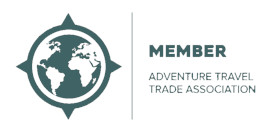

Toubkal Trekking is a local Adventure Travel company based in Marrakech. The company was founded by a group of Mountain guides from Toubkal area led by Mustapha Bouinbaden who is actually the driving force behind the Toubkal Trekking company.
+212 6 62 16 06 90
Mon – Sat 8.00 – 18.00
Toubkal Trekking
Explore our best tours.

2 days Toubkal Trek in Morocco

3 day Atlas Mountain Trek

3 days berber villages hike

3 days Toubkal Trek in Atlas

4 days Toubkal trek

Agafay Desert Day Trip

Atlas Mountains day trip

Atlas Mountains Trek
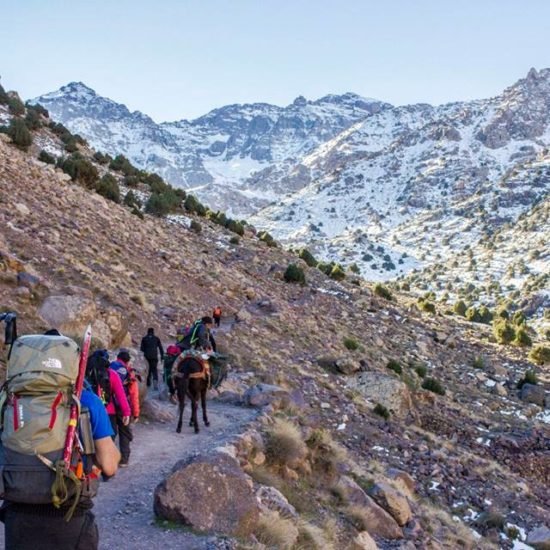
Atlas trekking tours

biking day trip in Atlas

climbing mount toubkal

High Atlas and 4 valleys day trip from Marrakech
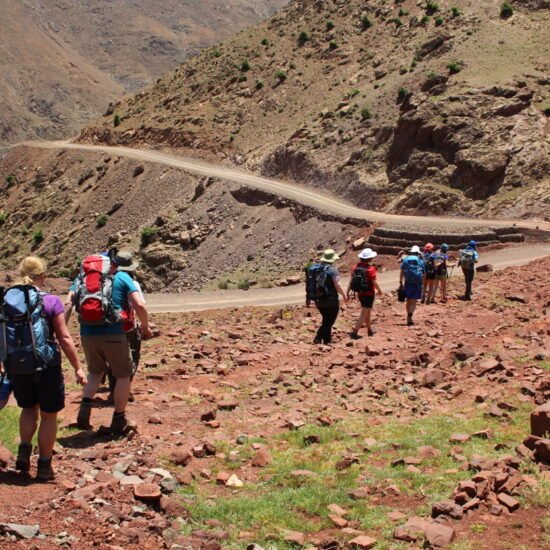
High Atlas Trek
Hiking in morocco.

Horse riding morocco
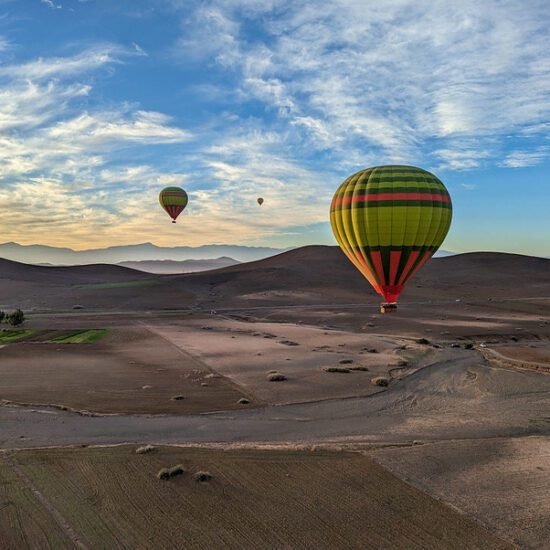
Hot Air Balloon Marrakech

Imperial Cities Marrakech Tours in Morocco
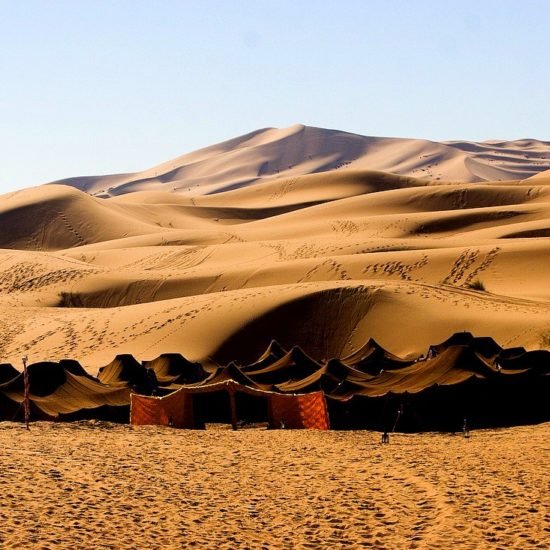
Marrakech Merzouga Tour

Marrakech to sahara desert
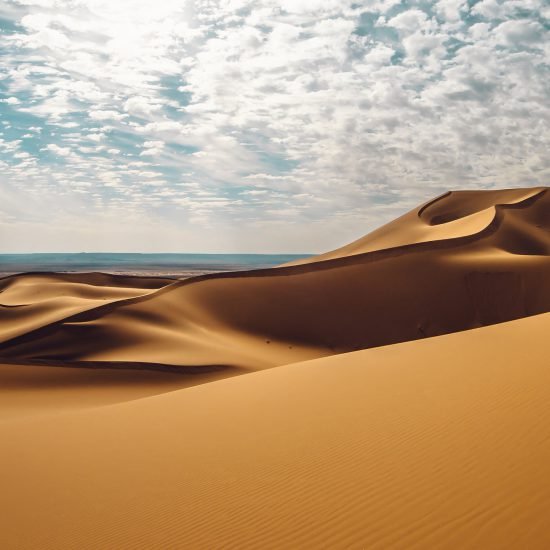
Morocco Desert Tour

Mount Toubkal guided trek

Mount Toubkal Trek
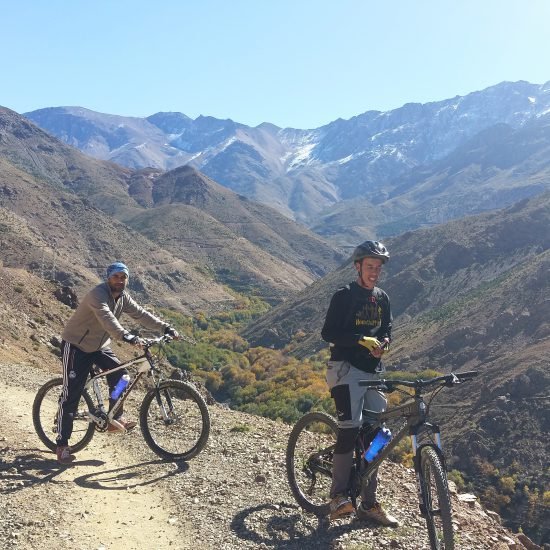
Mountain biking Morocco Atlas
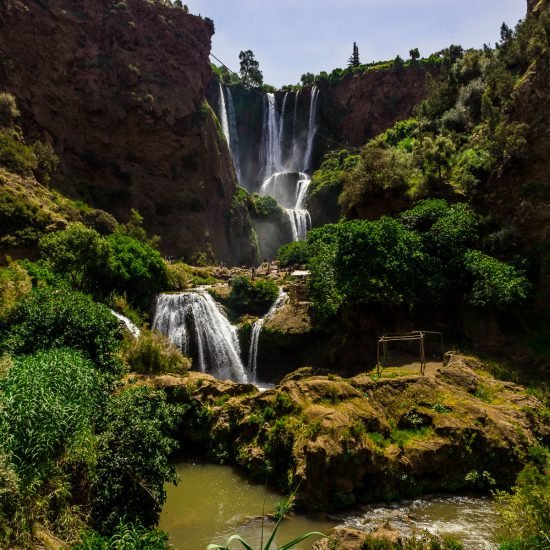
Ouzoud falls day trip

sahara desert tour

Sahara Desert Trek
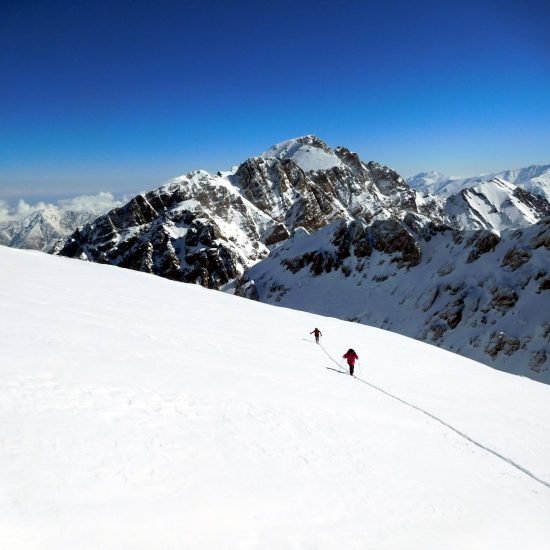
Skiing Morocco Atlas

Toubkal Ascent

Toubkal circuit Trek
Toubkal winter climb, trekking in morocco.
Morocco offers trekking trips to mount toubkal or tours for all tastes. One of the best things to do when you are in Morocco is a trekking activity in the high Atlas Mountains. Moreover, Trek Atlas is a nice experience out there. However, as you may know, Hiking in Morocco has grown in popularity, so have the options available.
In addition to that, Morocco offers an exceptional range of landscapes to discover; architectural richness and tradition, warm hospitality, accessible 4000m peaks, high isolated berber villages & valleys, and also Saharan oases and big dunes such as Merzouga’s Erg Chebbi dunes. Furthermore, this country has many assets that you can explore on foot all year round. Besides, many Active Travellers opt for a short or long trek in the Mountains in Morocco during their stay in Marrakech; be it a one day hike or a challenging trek to Mt Toubkal in two days, or a berber villages hike.
The Atlas Mountains
There are now treks for all times of year and levels of fitness; trek to test the fittest athletes and those where you can have your bags carried, arrive to find your lunch laid out for you and sleep in luxury.
However, if you would like to trek, we can only recommend the Mountains which are very closer to Marrakech city. The Atlas is made up of several chains and a dozen relatively accessible peaks over 4000m. The ascent of Mt Toubkal Morocco, the highest point in the country can be reached in at least 2 days from Marrakech. Toubkal Trek or Climb starts from Marrakech to Imlil valley which is the trailhead of many treks to mount toubkal. You go from Imlil to the basecamp or refuge on the first day; it usually takes around 5 to 6h walk. Then, the next day is the challenge day; you climb up mount toubkal & return back to the basecamp , and down back to Imlil.
Besides the trekking activity, tourists can do many other outdoor activities such as mountain biking, ski touring, Sahara desert tours, and excursions or day trip to very nice spots in Morocco.
Automated page speed optimizations for fast site performance

IMAGES
VIDEO
COMMENTS
8. How much does it cost to hire a guide for the Mount Toubkal Trek? Prices for guides to Mount Toubkal vary a lot. I. f you hire one with the "Office of Mountain Guides of Imlil", you'll pay a bit more. You will, however, benefit from having a guide that is experienced in mountain rescue and knows how to administer cpr.
An experienced hiker could most definitely trek Mount Toubkal alone. There are many villages and settlements on your way to the peak in case you get lost. ... The trip from Marrakesh to Imlil will cost you around 75 dirhams ($8) per person in a shared taxi, or 300 dirhams ($30) in a private taxi. Be careful when taking a private taxi and ...
Where is Mount Toubkal? Mount Toubkal is located 63 kilometres south of Marrakech. The start and end point of the Mount Toubkal trek is the village of Imlil, 1800 metres above sea level. Imlil is a 90-minute drive from Marrakech.
Phone +212 661-873771. Web Visit website. Standing 13,671 feet (4,167 meters) in height, Morocco's Mount Toubkal holds the distinction of being the tallest mountain in Northern Africa. Located in the heart of the Atlas Mountains, Toubkal is a popular trekking peak, drawing thousands of visitors on an annual basis.
It takes around an hour and a half to drive from Marrakech to the start of the Toubkal mountain trail at Imlil. From here, you'll trek uphill for around 6 hours before reaching Base Camp, at which point you'll have climbed an elevation of around 1,500m. After acclimatising and refuelling, usually overnight, it's time to head for the summit.
The cost start from $1,700. Tips and Advice . Top Tips . 1). Timing. Do you want to climb in Winter or summer. You need to decide as they will be two very different experiences and require different gear. ... A bit more about Climb Mount Toubkal. This trek is a truly unique and exhilarating way to experience the Atlas Mountains as well the ...
To the Atlas Mountains. Despite the backdrop of the Atlas Mountains, most people would associate Morocco with wandering around the souks, camel rides through the desert and enjoying copious amounts of mint tea. While the latter is true, Mount Toubkal is a peak that isn't so well known amongst non-mountaineers, but stands at an impressive ...
4-Day Hiking Guide to Mount Toubkal. Embarking on the Mount Toubkal trek is an adventure that unfolds over four action-packed days. Here's a sneak peek at what each day has in store for you: Flying to Marrakech. The quickest way is to fly directly to Marrakech Menara Airport, just 6 km from the city center. The airport receives flights from ...
Toubkal Summit Travel Categories. 12 tour packages. Embark on an unforgettable journey through the breathtaking landscapes of Mount Toubkal, Berber villages, and the Atlas Mountains. Choose from our diverse trekking categories, offering adventurous trips, cultural immersions, and stunning vistas. Whether you seek a solo adventure, a family ...
Trekking Mount Toubkal offers breathtaking vistas, cultural immersion, physical challenge and a real sense of accomplishment, making it a must-do bucket list experience. Breathtaking Views. Throughout every stage of your Mount Toubkal trek, you'll have the opportunity to pause and savour the breathtaking views that unfold before you.
We highly recommend itineraries that build in one or two more days for acclimatisation. Day 1: Arrive or be in Marrakech, drive from Marrakech to Imlil in the morning. Trek to Refuge Camp and spend the night. Day 2: Trek to Toubkal via South Side and descend via South Side. Return to Imlil then Marrakech.
While £300 might seem like a significant addition to your budget, the opportunity to witness the Atlas Mountains in their winter glory is an experience that many find priceless. Click here to find out more about our Mount Toubkal winter trek. Discover costs of climbing Mount Toubkal, North Africa's highest peak - includes travel tips ...
Day 6: SUMMIT MOUNT TOUBKAL. SUMMIT MOUNT TOUBKAL Trek from Refuge (3206m) to the summit of Mount Toubkal (4167m). This incredible mountain climb affords stunning views over the High Atlas mountains, Anti-Atlas, and even the Sahara desert in the distance.
380£ per person. This is an amazing 5 days mount toubkal guided trek in the high Atlas Mountains of Morocco. We Trek through different landscapes from lush valleys to barren rock. The hike allows us to see colourful Berber villages, and pass over nice mountain Passes & climbing to our highest point at 4,167m at the top of Mount Toubkal.
Tip 1: There are many ways to climb Toubkal - Choose the option that suits you best. Tip 2: A good preparation is half the job. Train for climbing Mount Toubkal! Tip 3: Be aware of the symptoms of altitude sickness when you climb Mount Toubkal. Tip 4: Be aware of the best season for climbing Mount Toubkal. Tip 5: Prepare for a hellish night ...
The best time to climb Mount Toubkal in Morocco is during the summer months from June to September when the weather is generally mild and dry, and the routes are free of snow. The peak season is July and August when the conditions are at their best, but it can also be crowded. During the winter months, from November to April, the mountain is ...
Conquer Mount Toubkal. The highest peak in the Atlas Mountains and Northern Africa at a mighty 4,167m. 5-day itinerary. From the noise and colour of Marrakech to traditional berber villages over a long weekend. Low costs, low fundraising target. Arrange your own flights to help keep costs down. Support seriously ill children
Day 1: Marrakech - Imlil (1,740m) to Mt Toubkal Base Camp (3,207m) | 6-7h. Morning private transfer from Marrakech to the village of Imlil (90km / 2h). There you will leave the vehicle and, in the company of your mountain guide, begin your trek, heading along the Mizane Valley, first towards the village of Aremd and then onto the shrine of ...
Enjoy an exhilarating one-week trek to the summit of the highest mountain in North Africa Mount Toubkal stands 13,671ft (4,167m) above sea level and commands superb views of the High Atlas Mountains. Our trek passes through impressive landscapes on well-defined paths and is, surprisingly, not too strenuous. As we climb higher, the paths do become steeper but the gain in altitude awards ...
Most high atlas trekkers (Atlas mountains trekking) make djebel toubkal ( Toubkal Climb, 4167m/13,670ft), in an adventures tours in Morocco, it is the highest peak in North Africa, their first goal as one of the Best place to visit in Morocco. Indeed, in season about 90℅ of trekkers in the Atlas Mountain are likely to be in the Toubkal Region ...
Browse 103 tours from the best tour operators in Mount Toubkal with 431 reviews visiting places like Marrakesh and Imlil. Compare & book now! APRIL SALE: ... Mount Toubkal Winter Trek. Destinations Marrakesh, Imlil, Aroumd, Mount Toubkal +2 more Age Range 15 to 99 year olds
Climbing Mount Toubkal is considered moderately challenging, and the difficulty level can vary depending on various factors such as your fitness level, previous trekking experience, and the route you choose. Here are some key aspects to consider when evaluating the difficulty of climbing Mount Toubkal: Altitude: Mount Toubkal is the highest ...
The Atlas is made up of several chains and a dozen relatively accessible peaks over 4000m. The ascent of Mt Toubkal Morocco, the highest point in the country can be reached in at least 2 days from Marrakech. Toubkal Trek or Climb starts from Marrakech to Imlil valley which is the trailhead of many treks to mount toubkal.